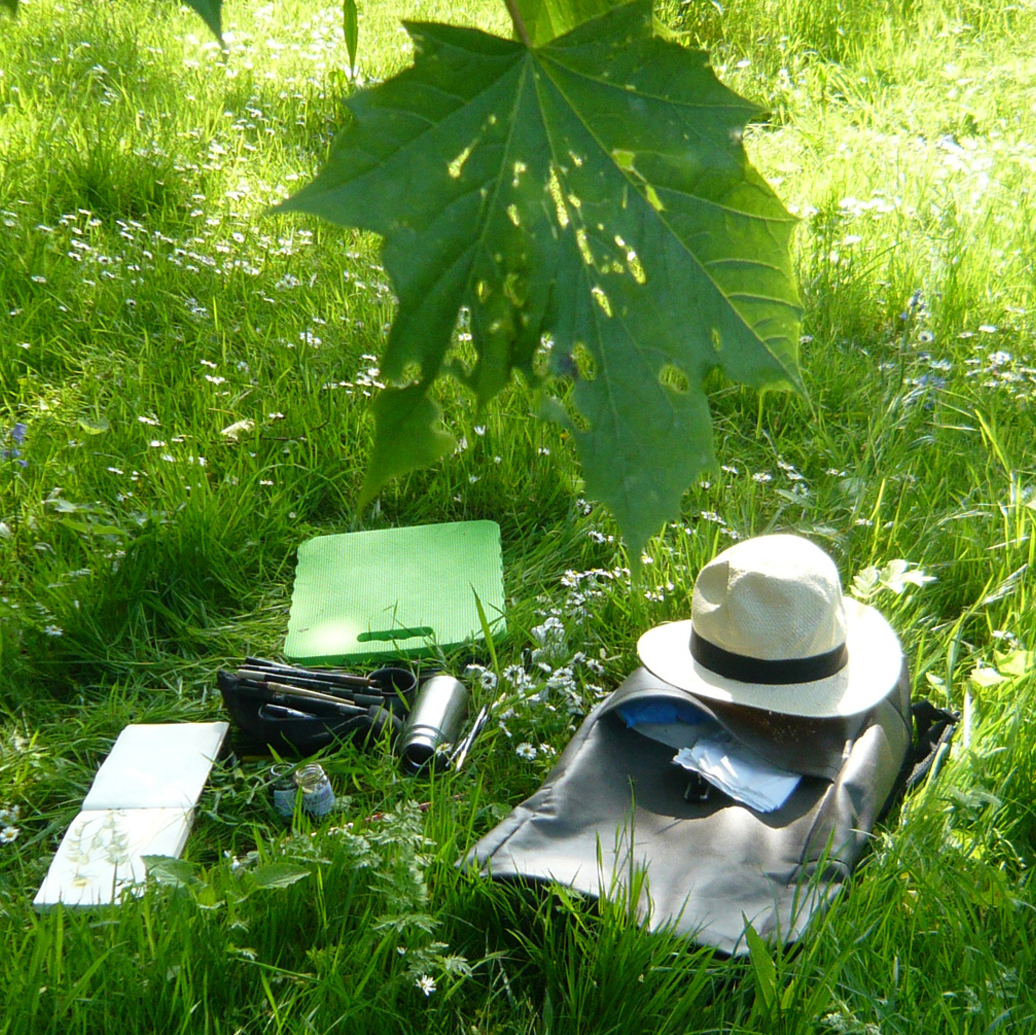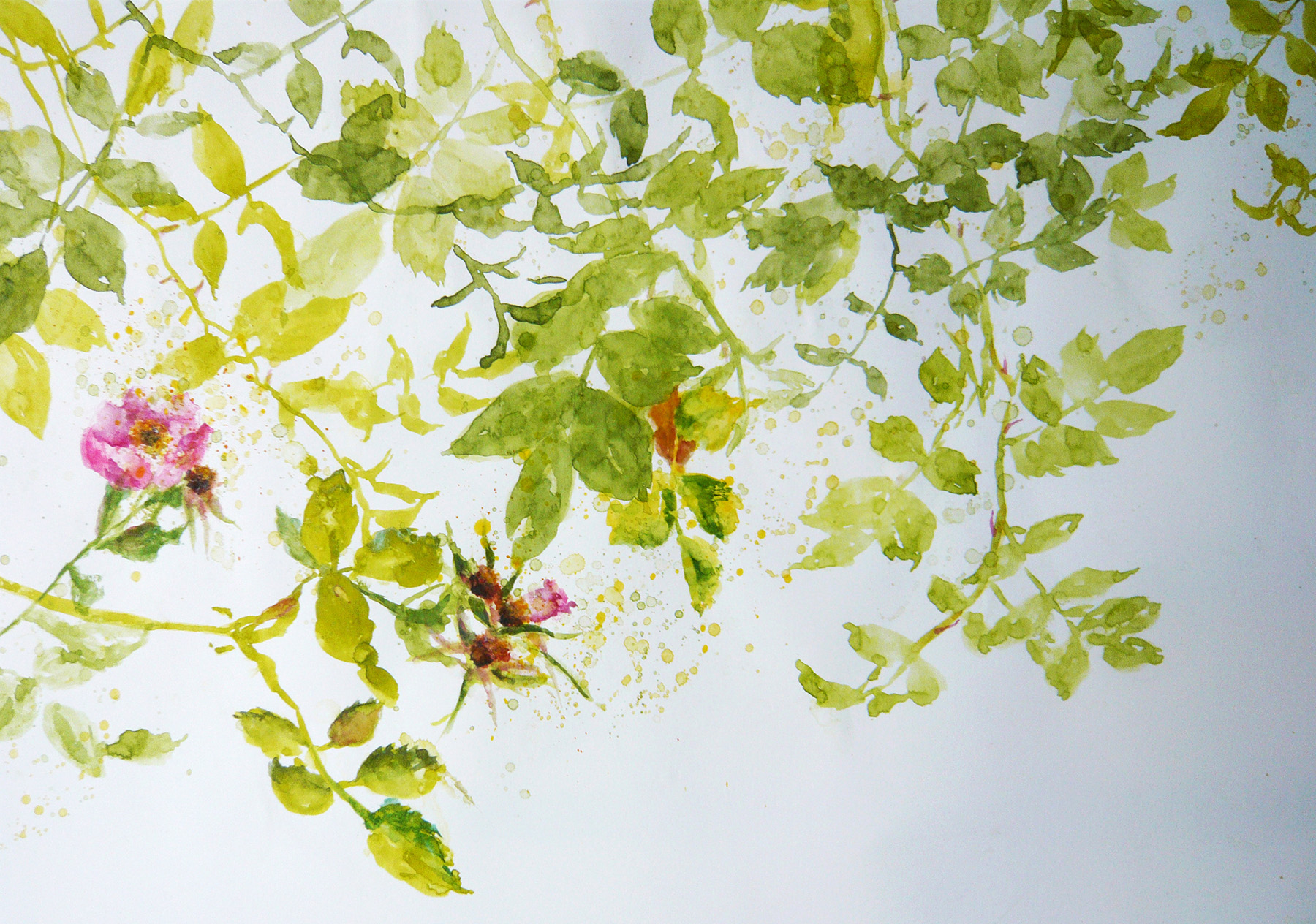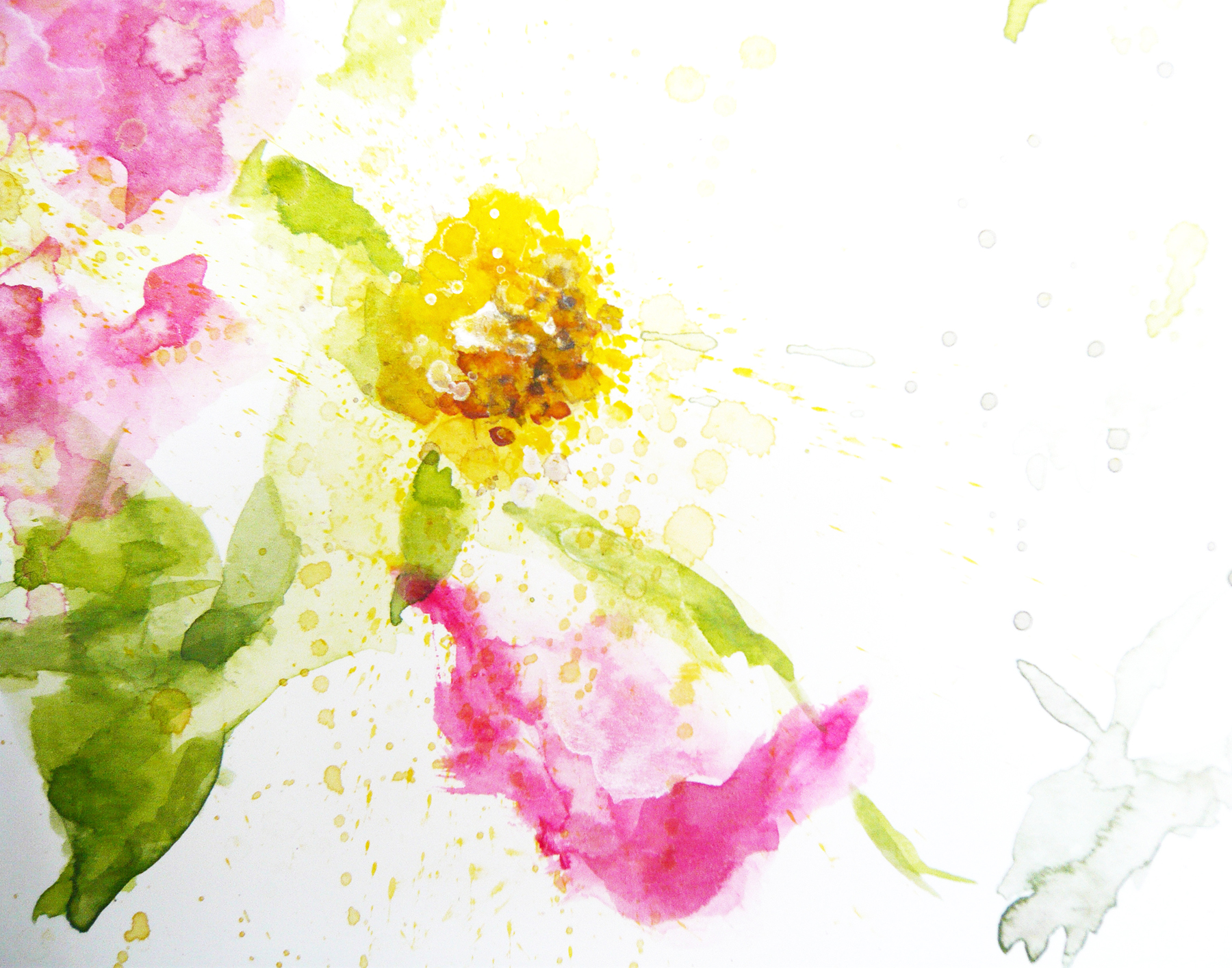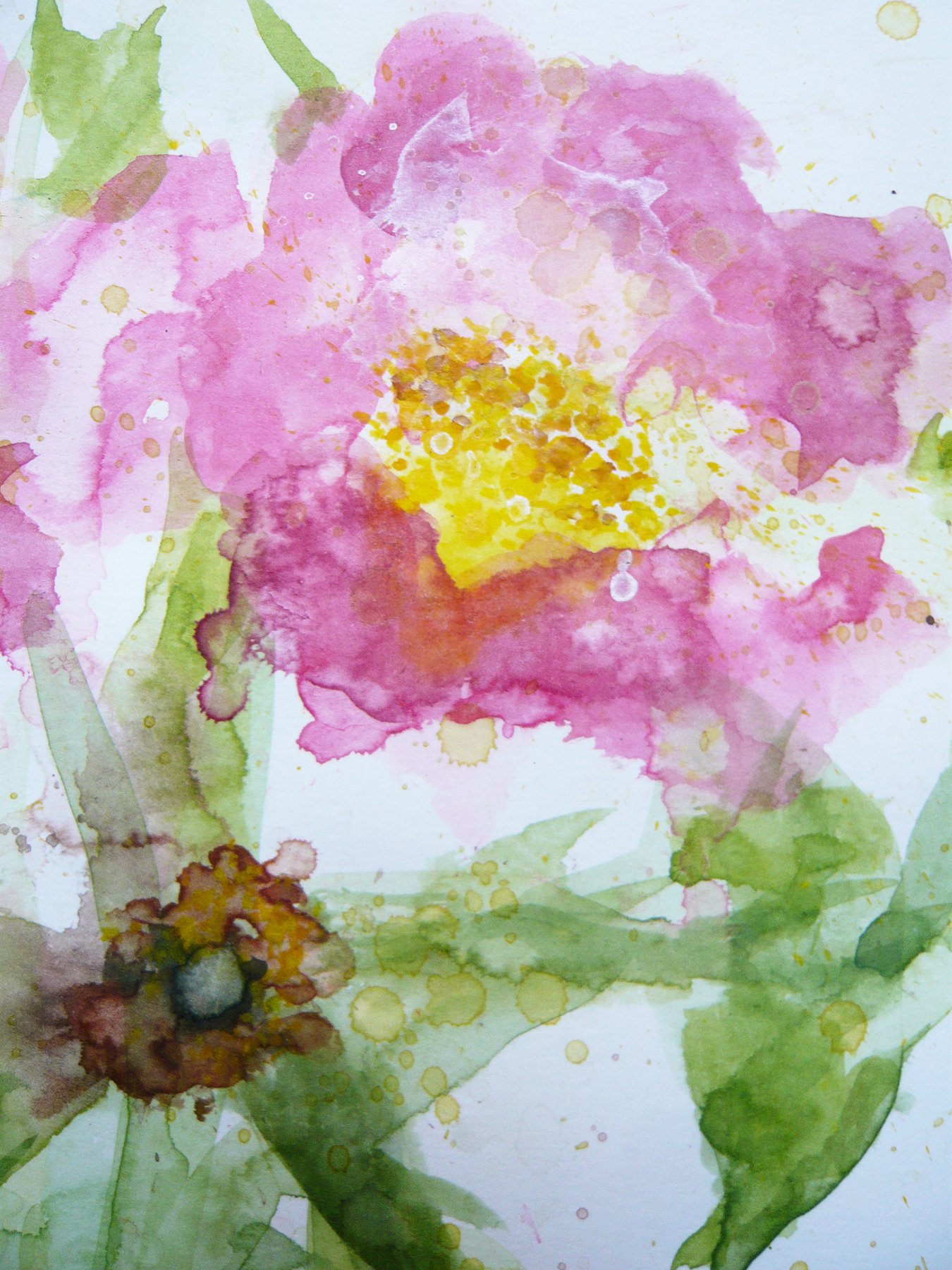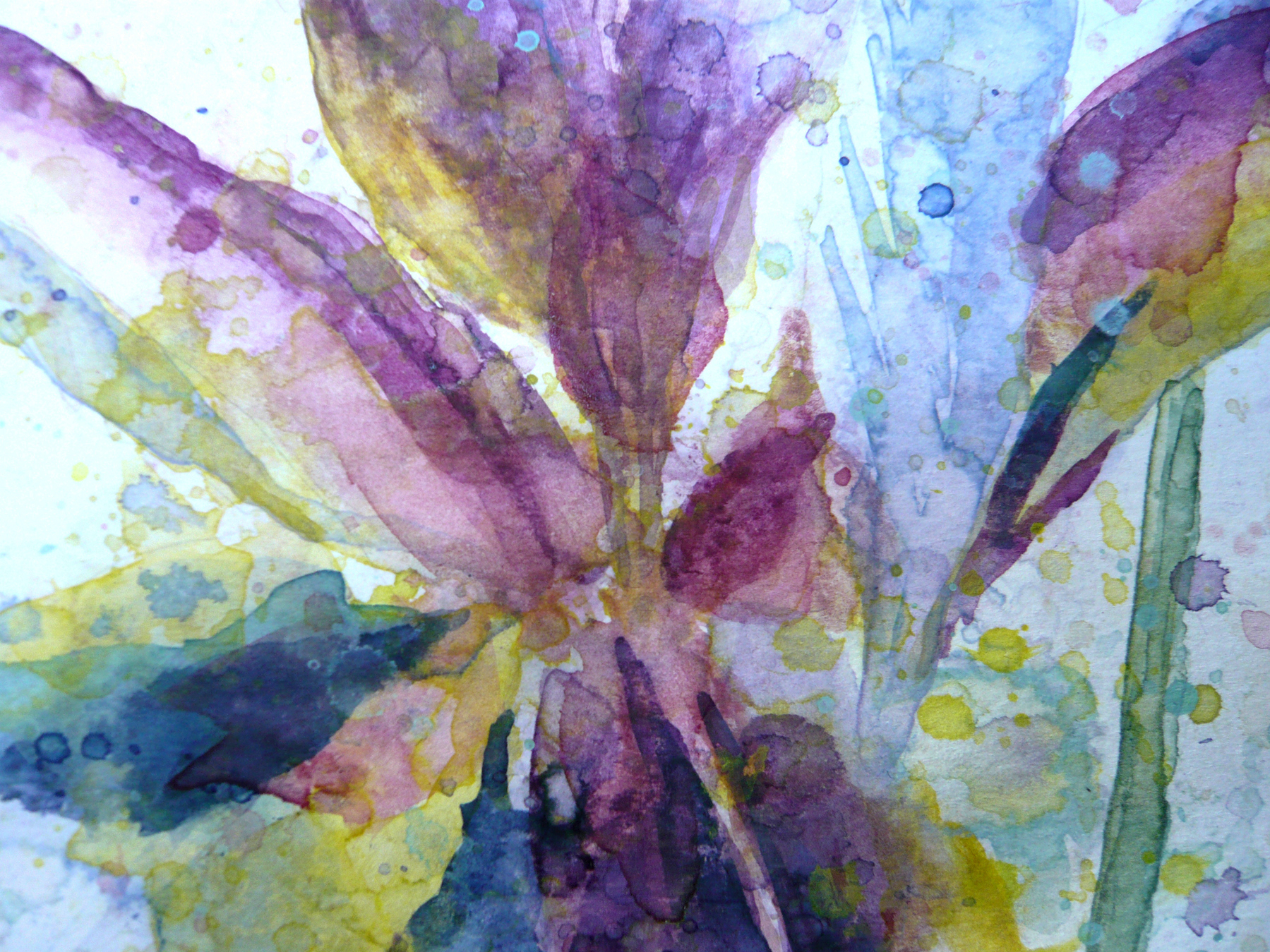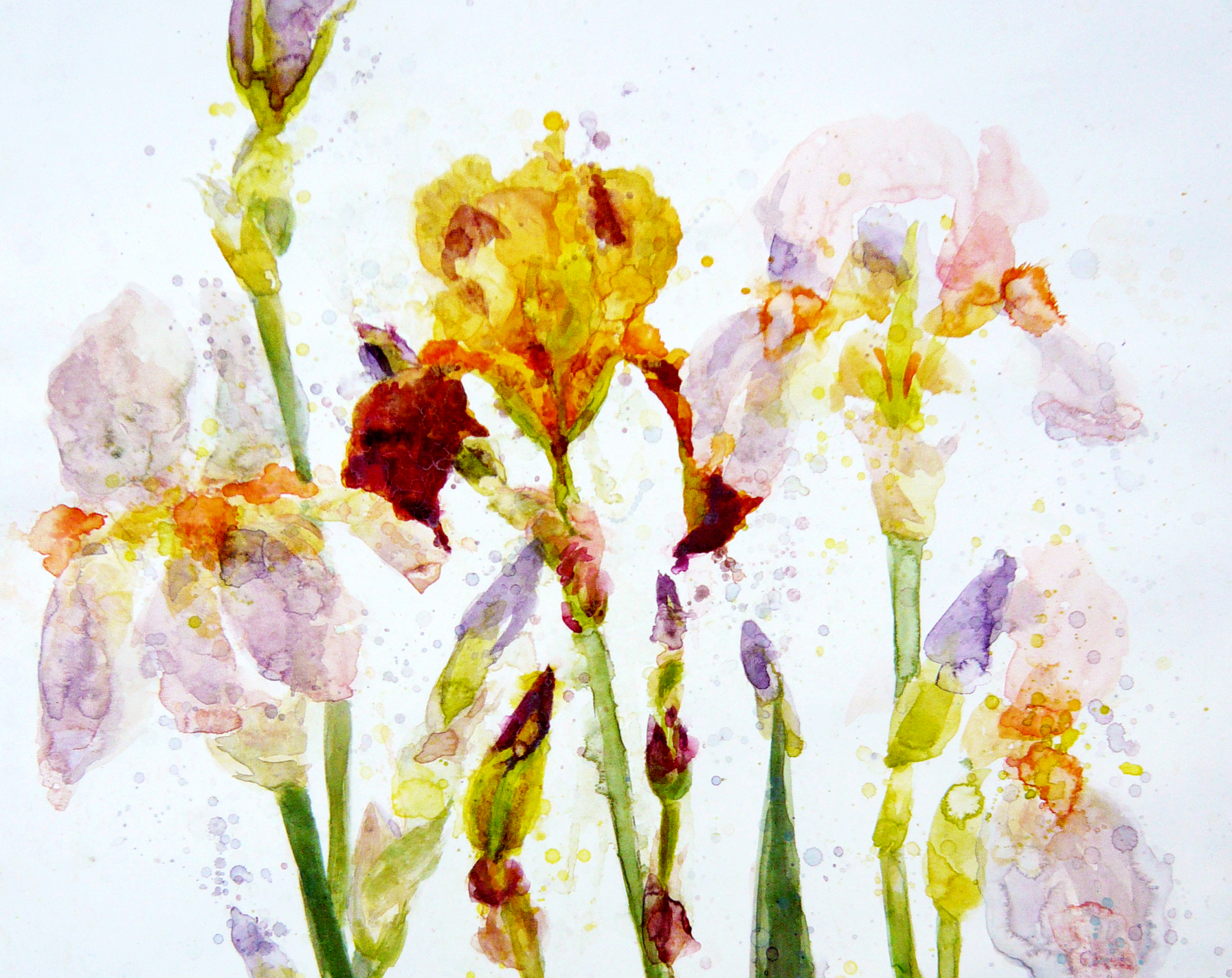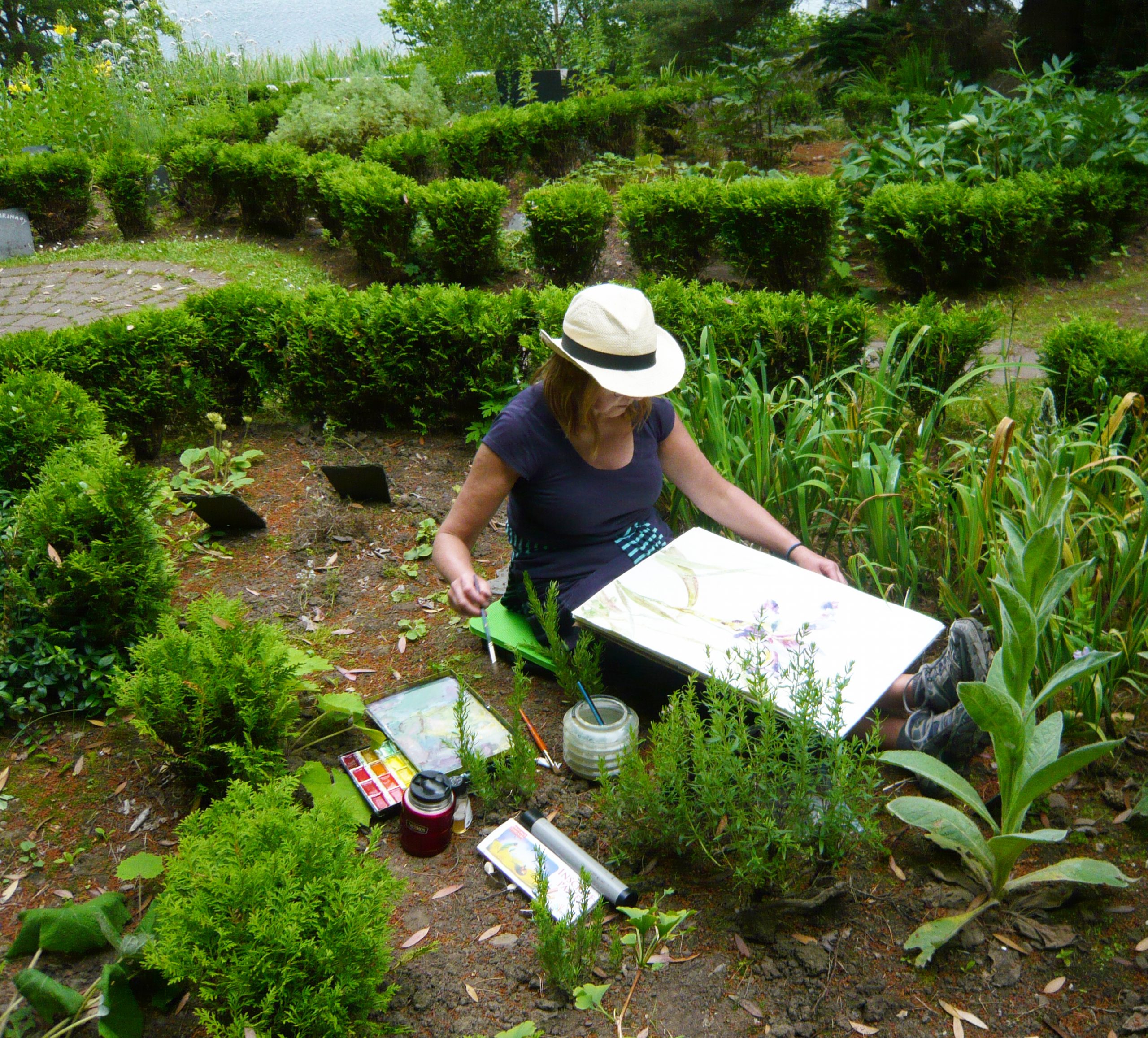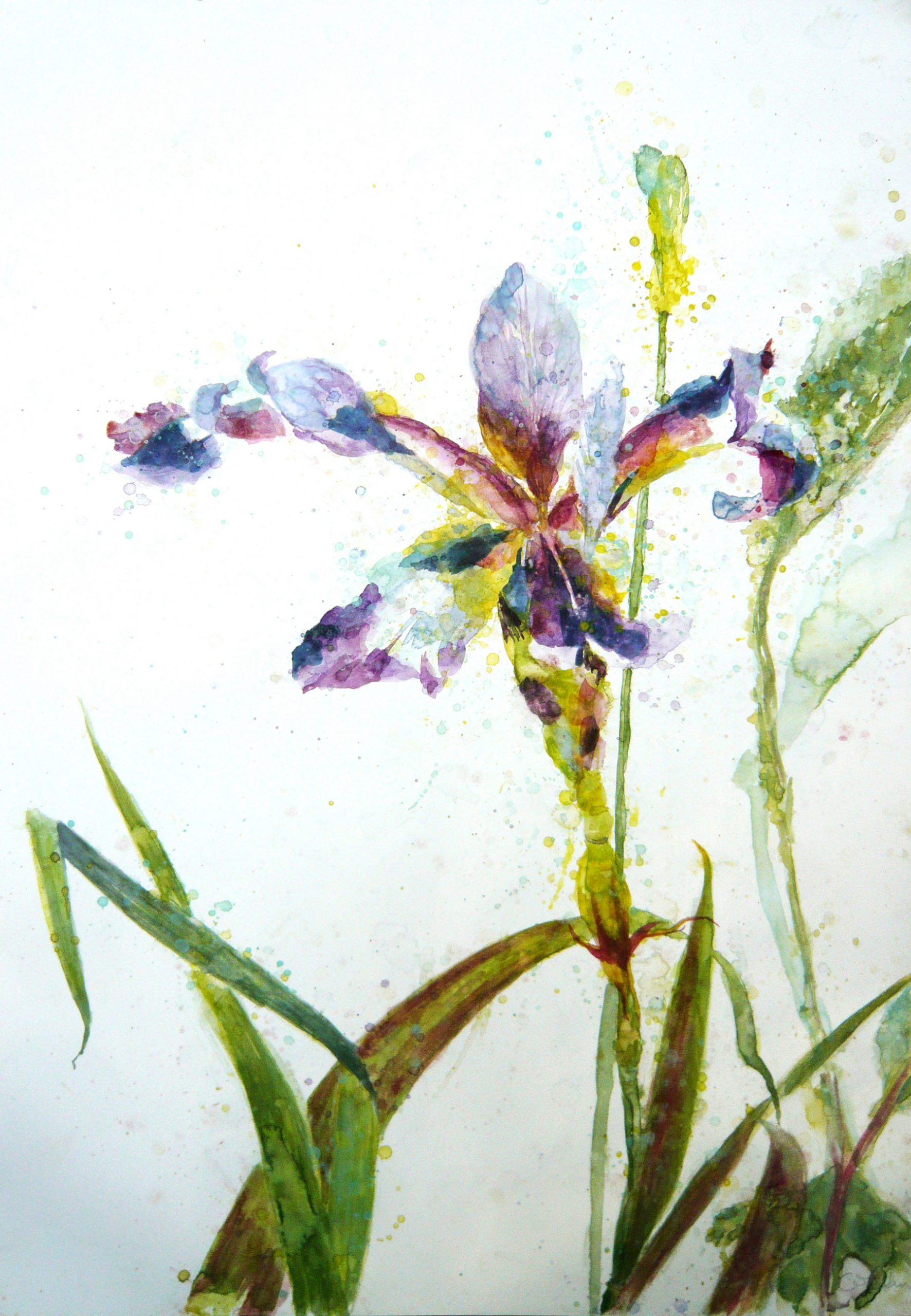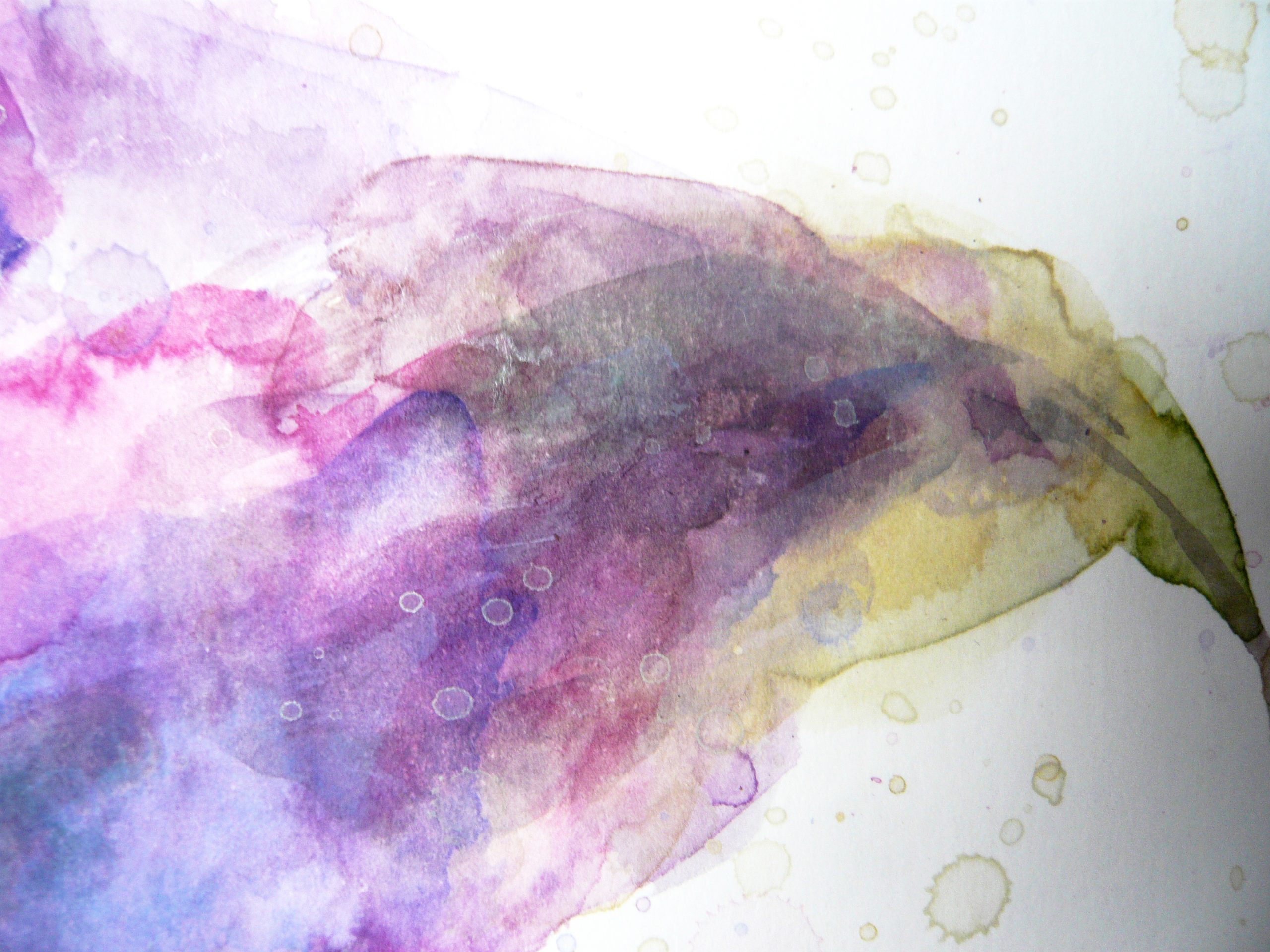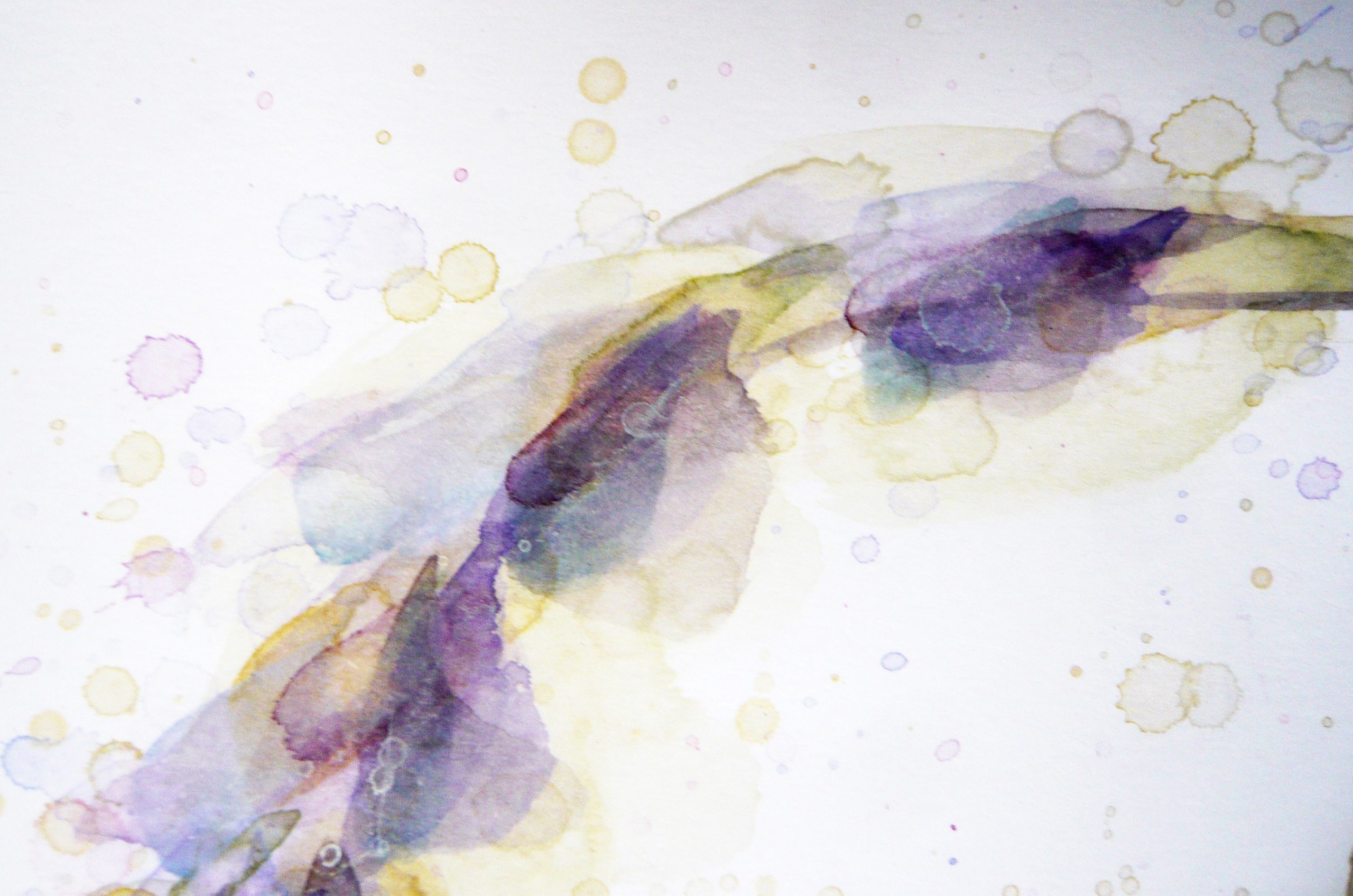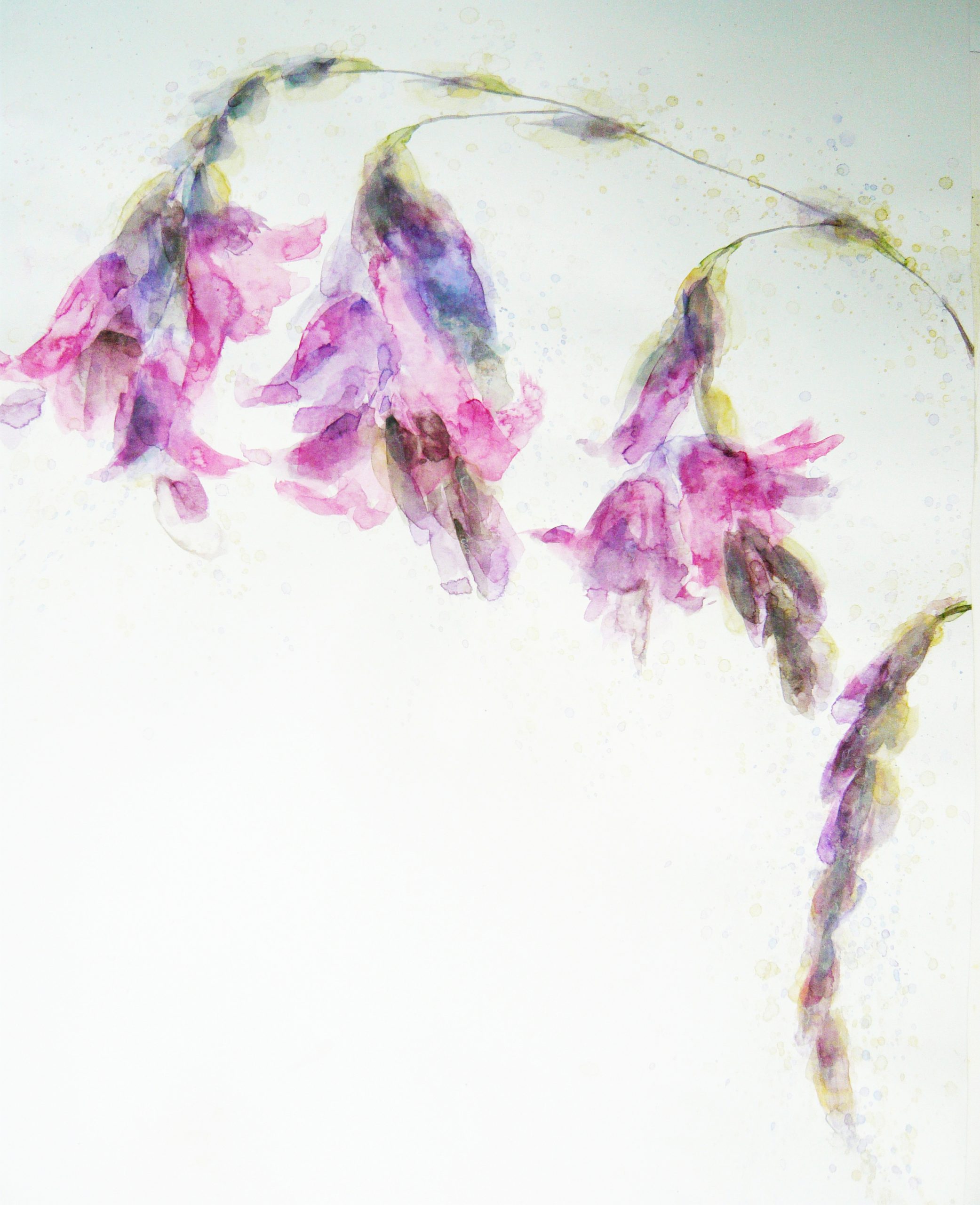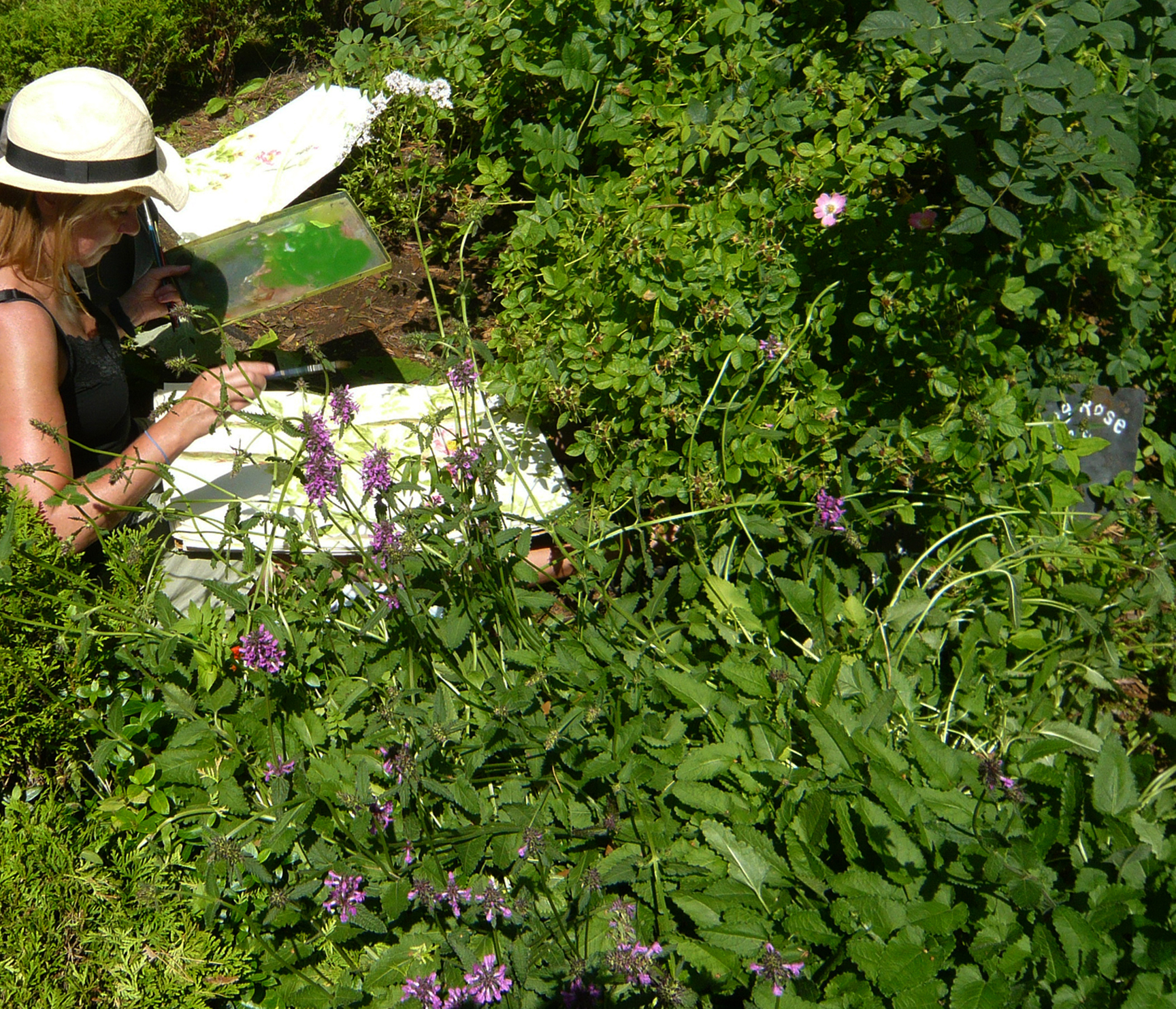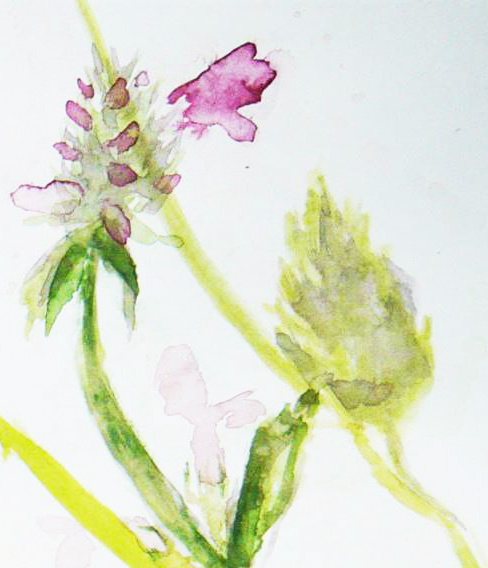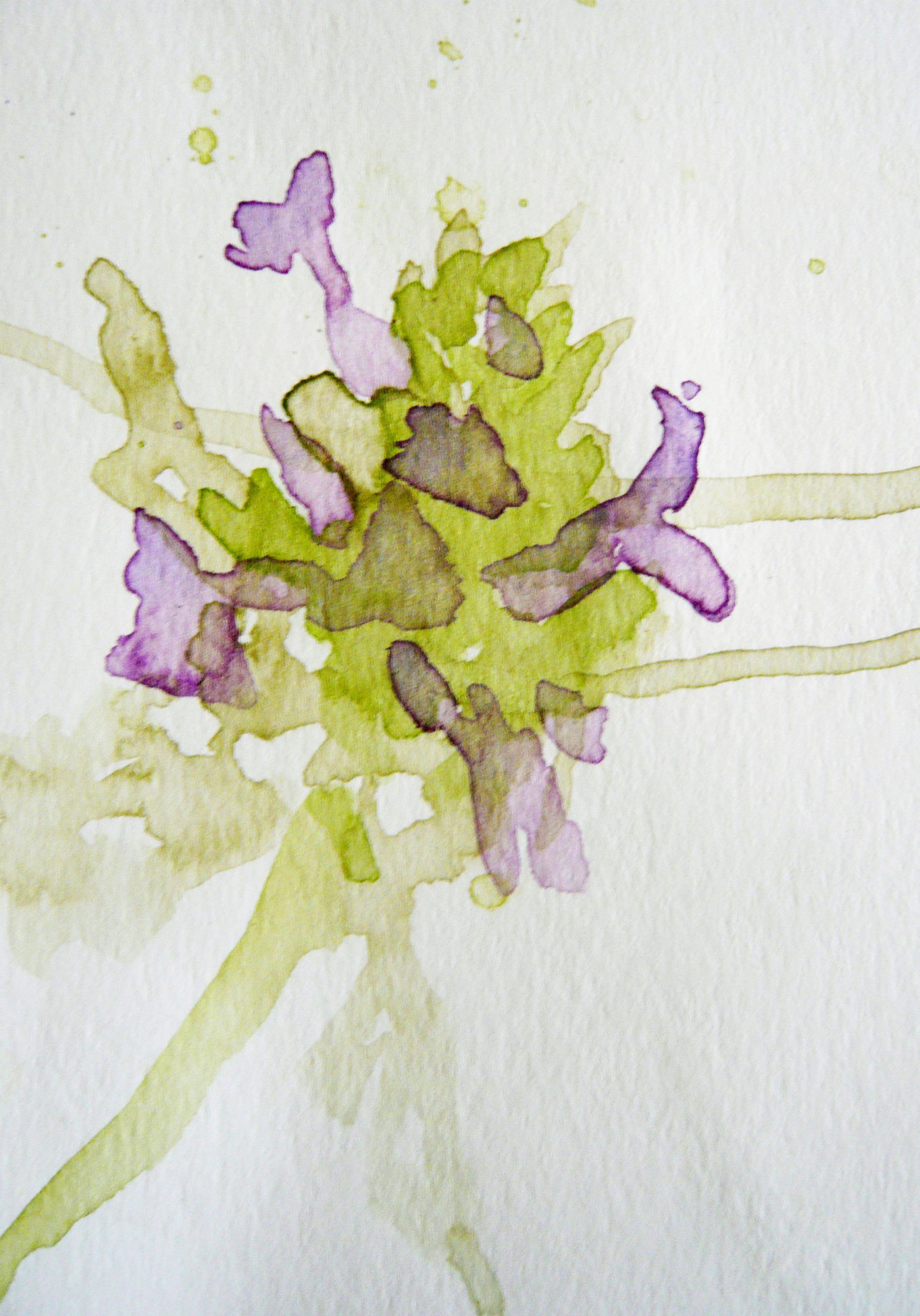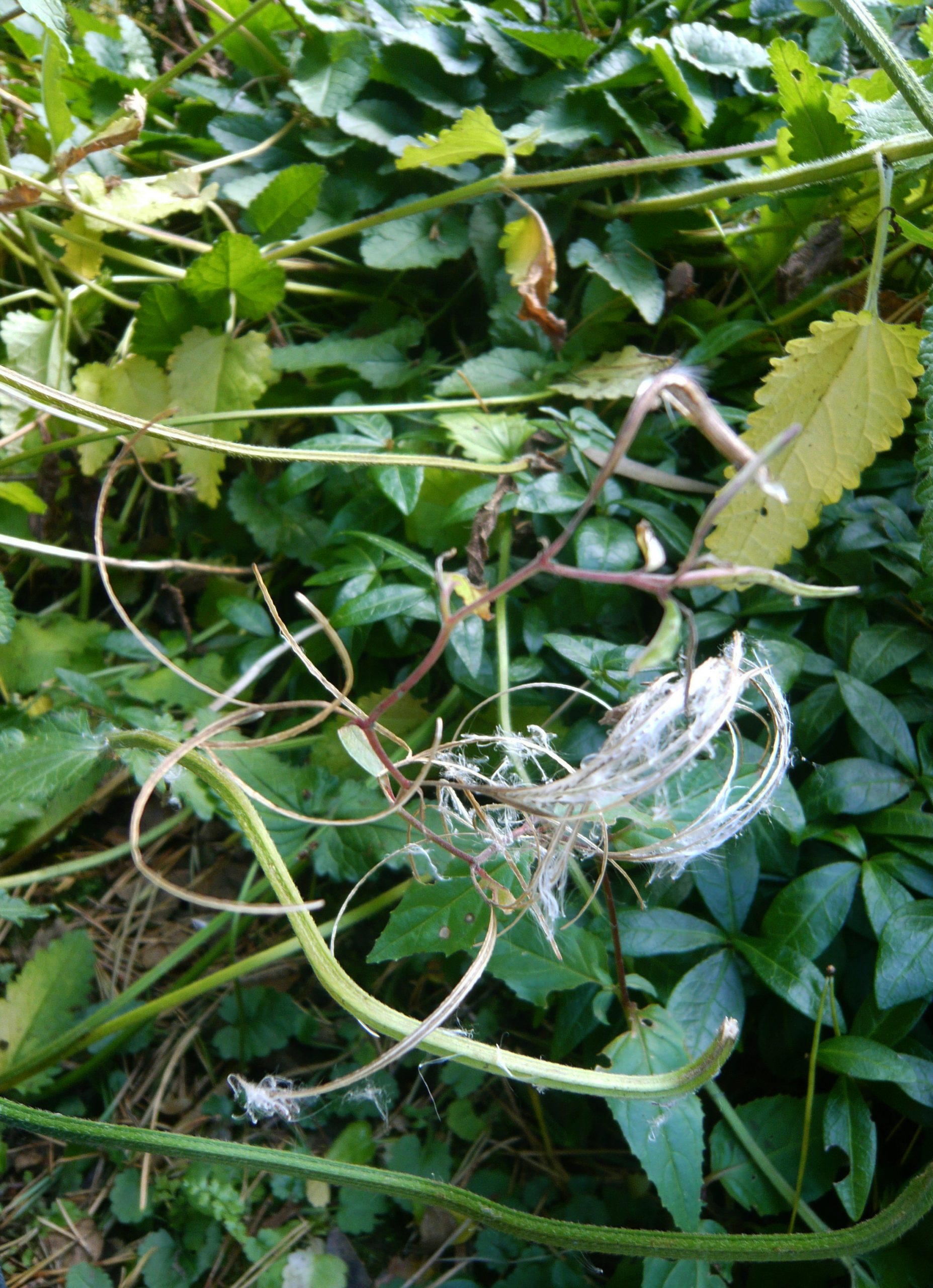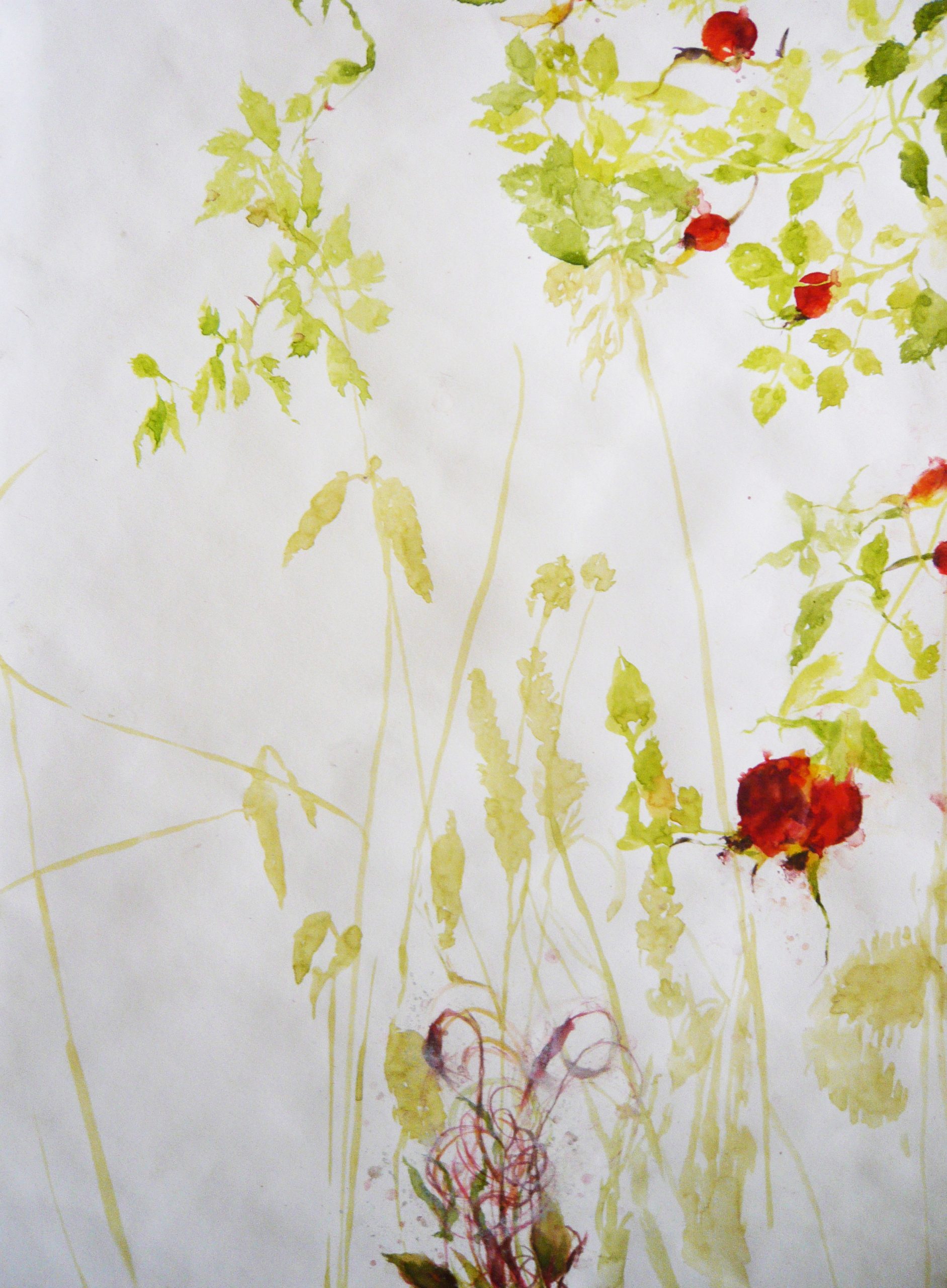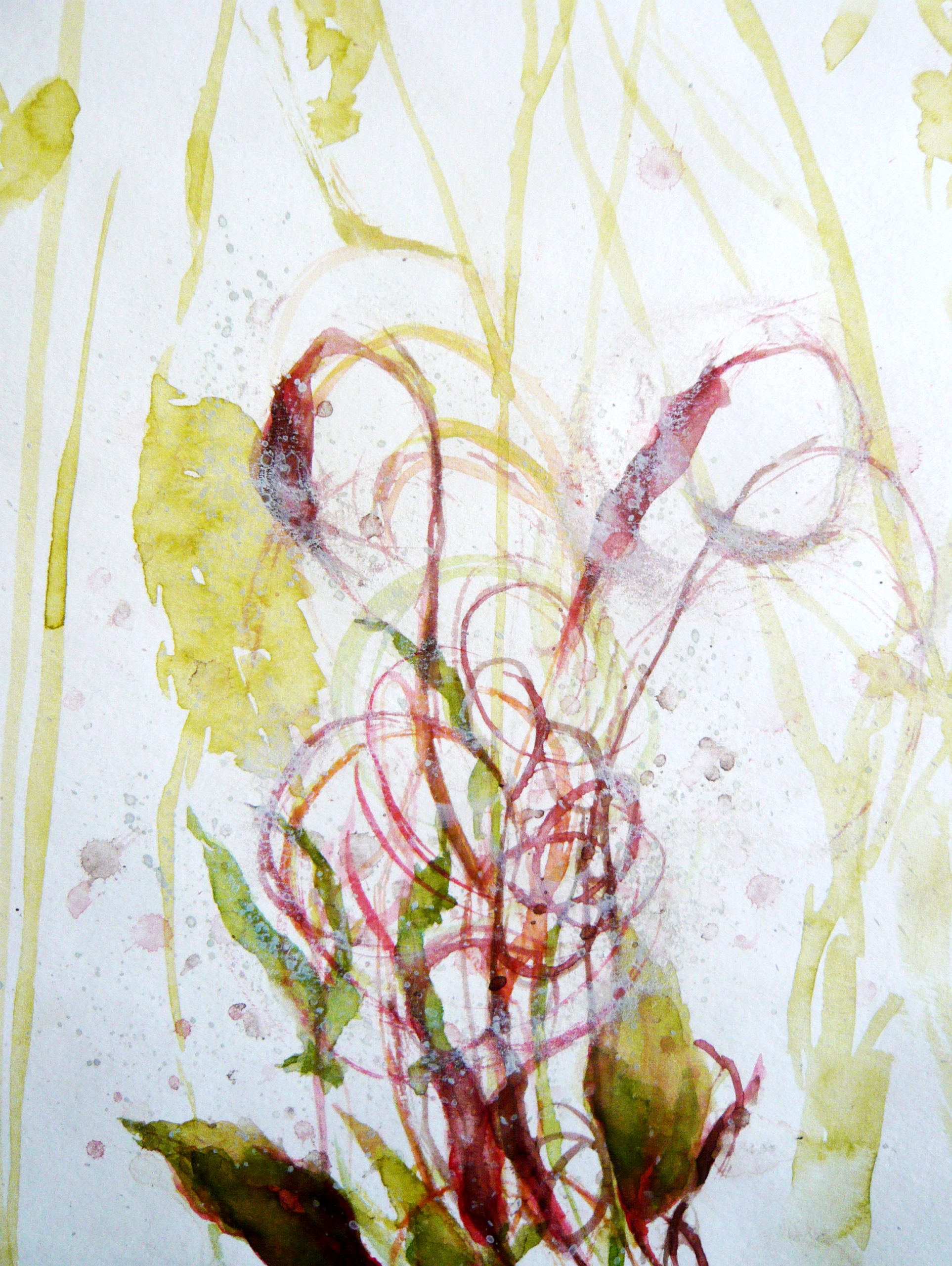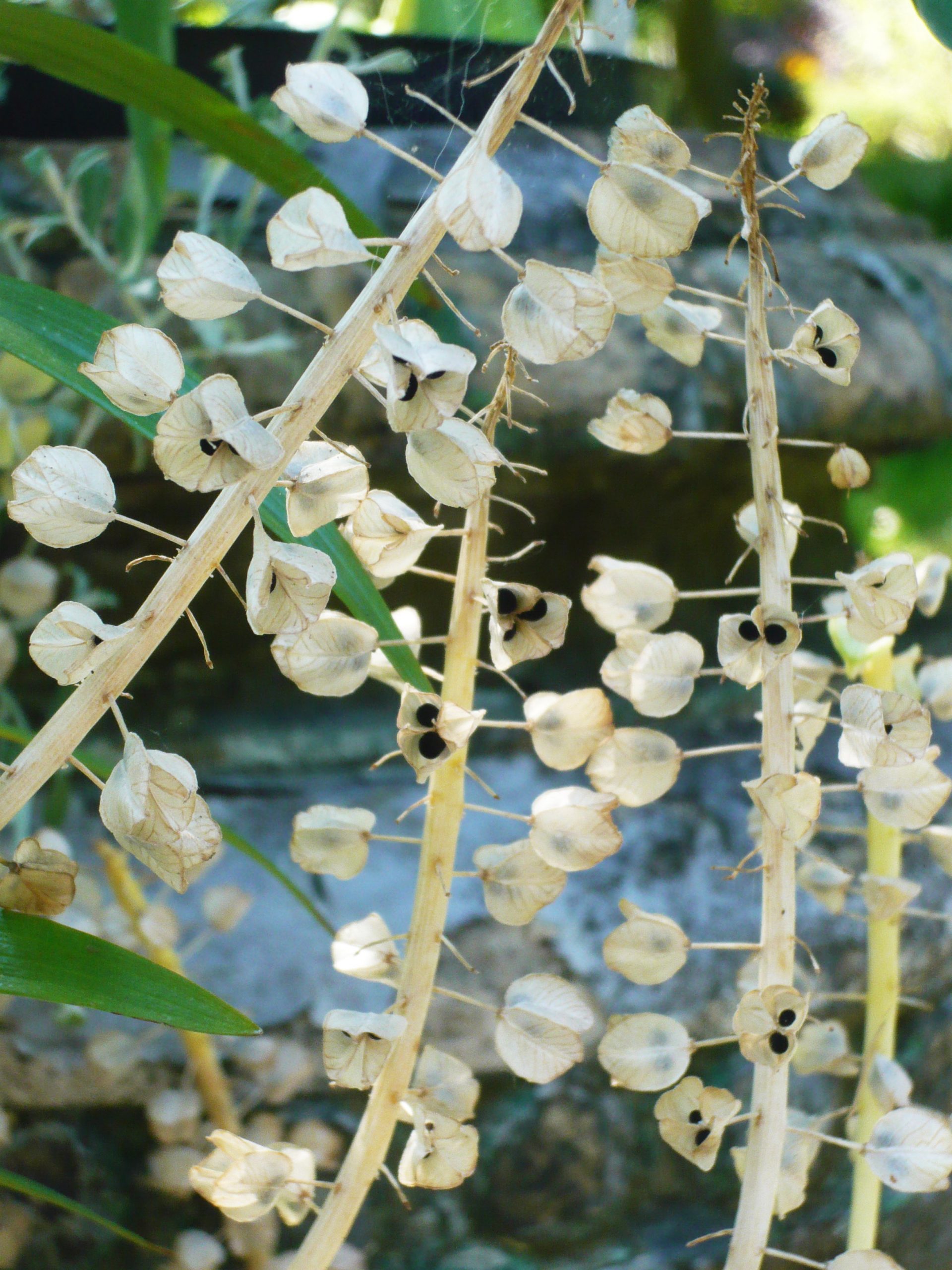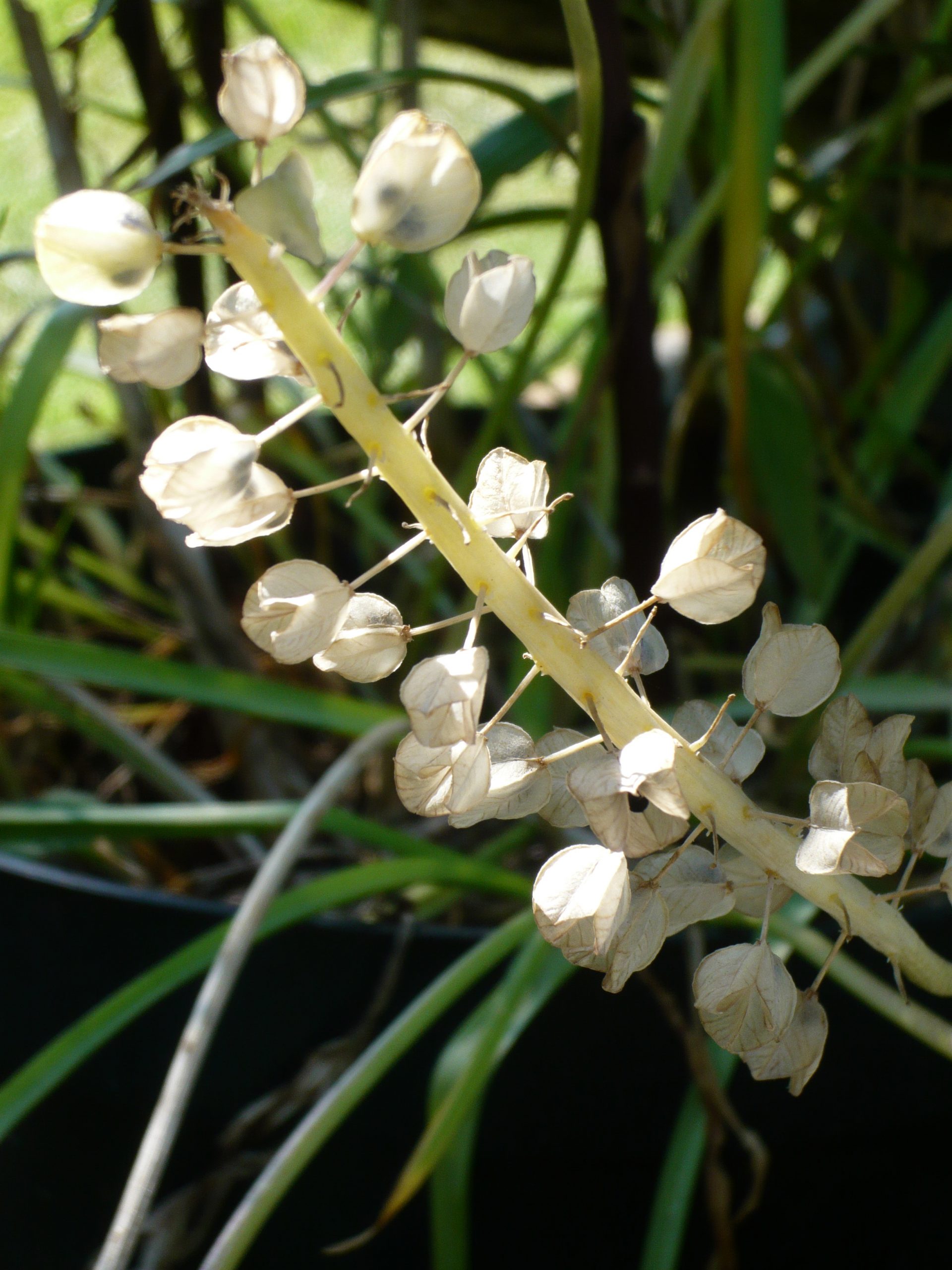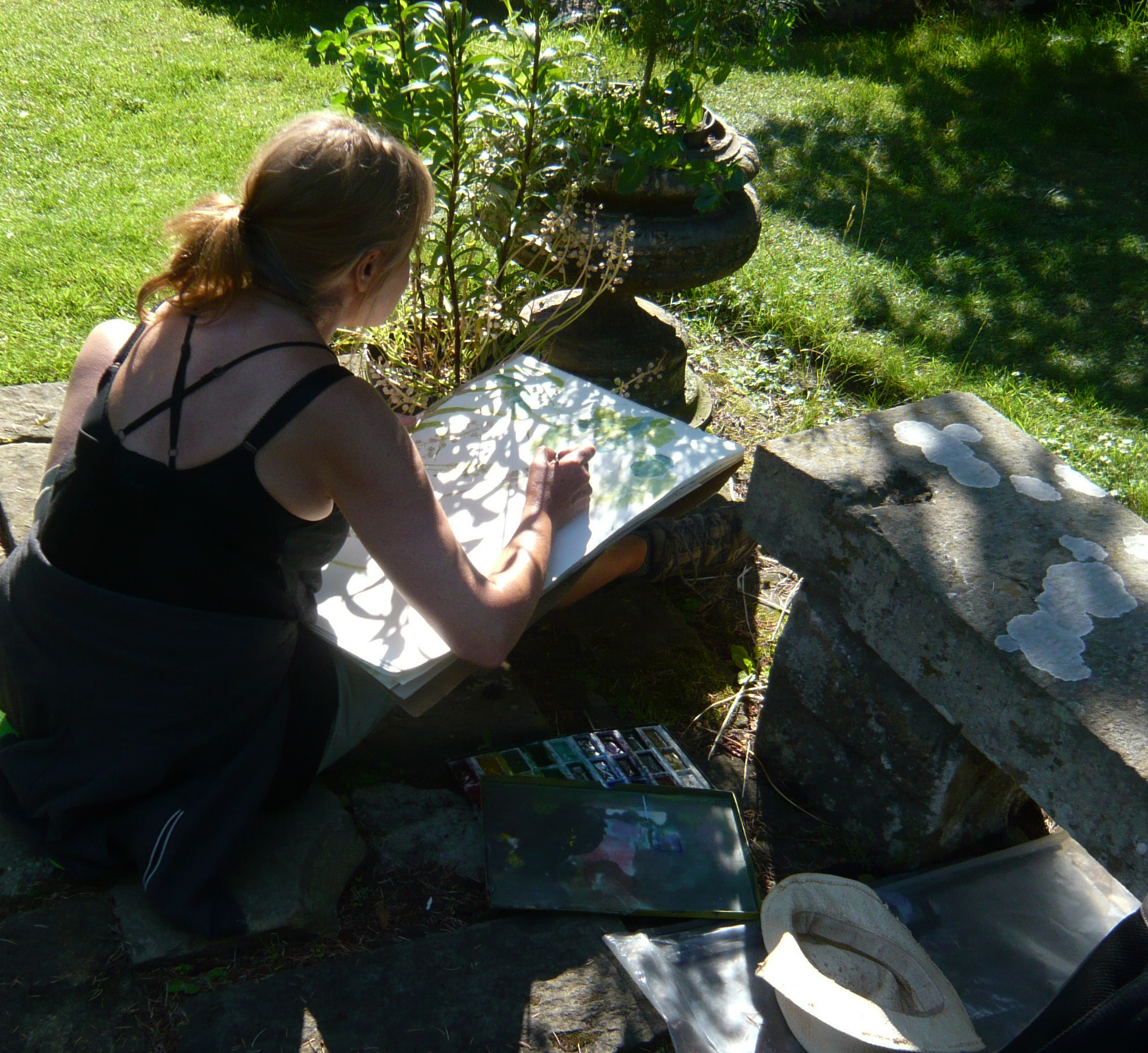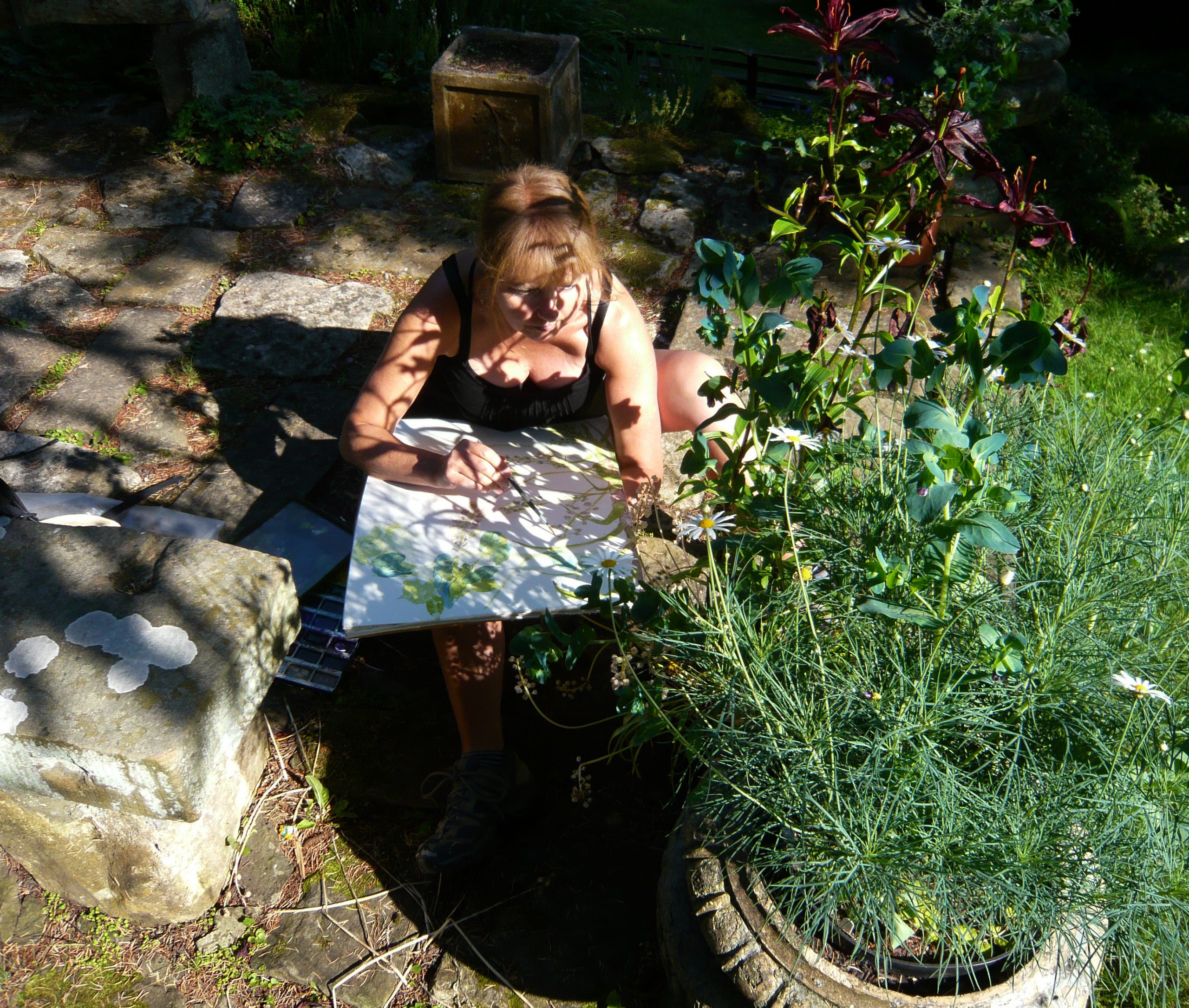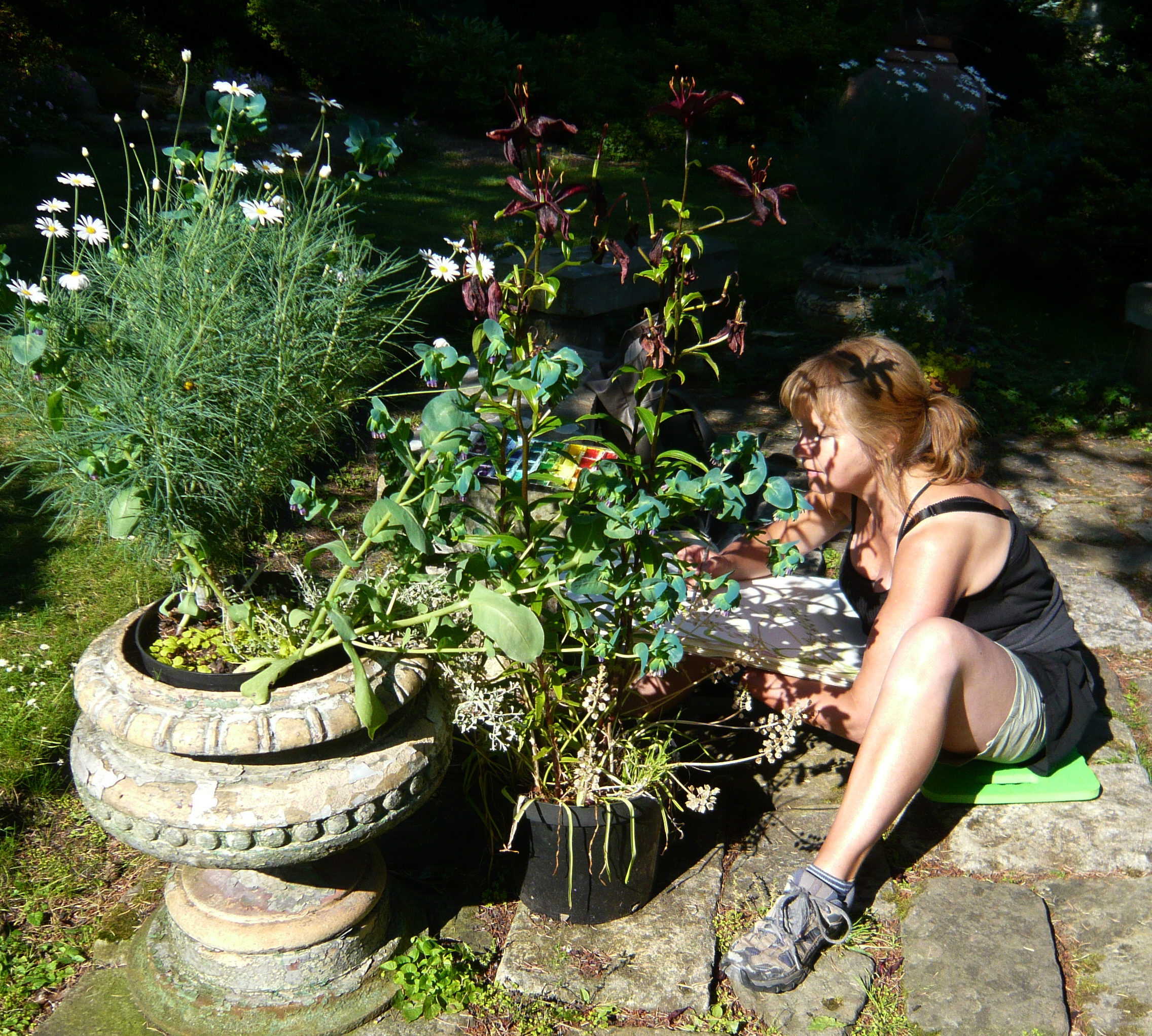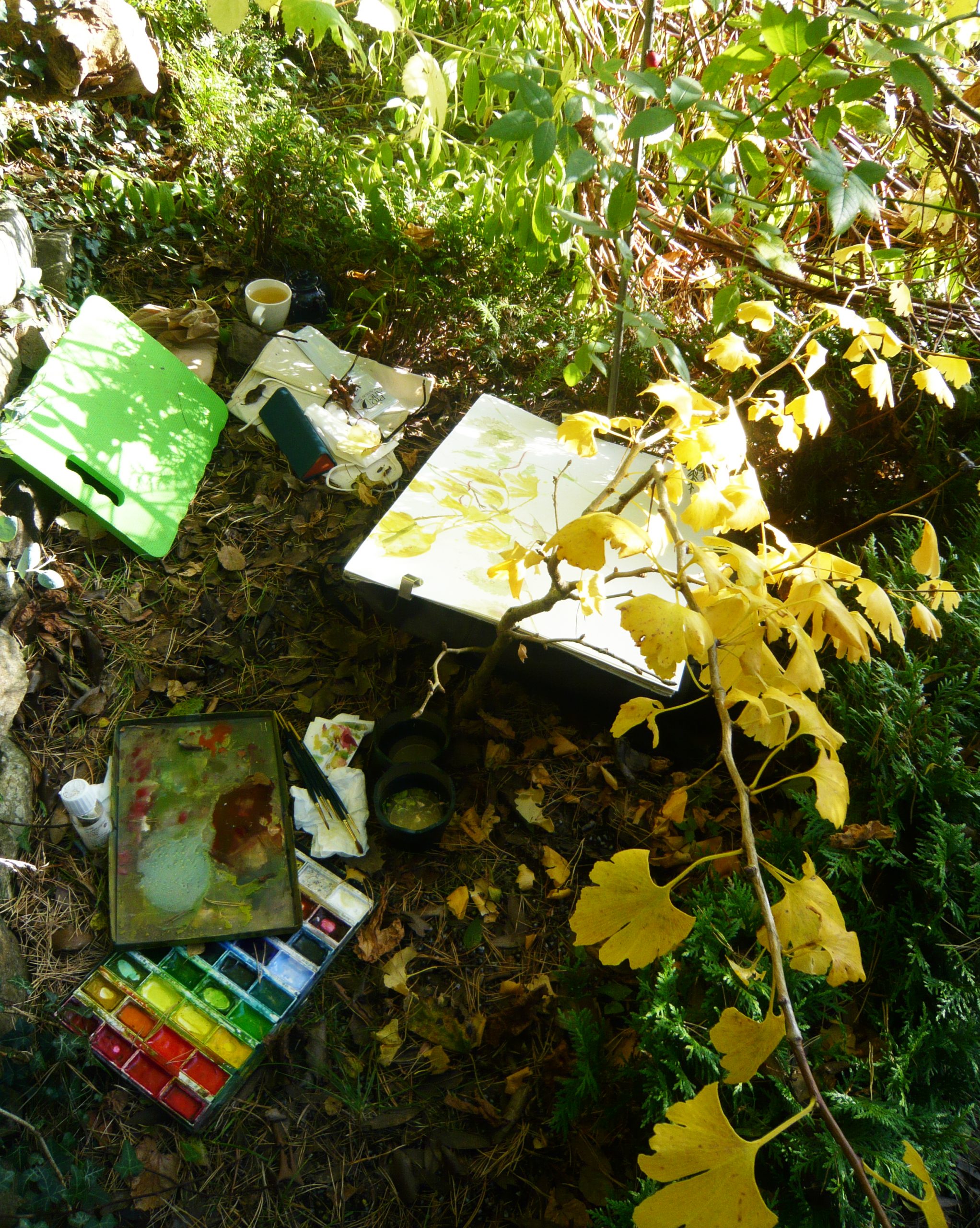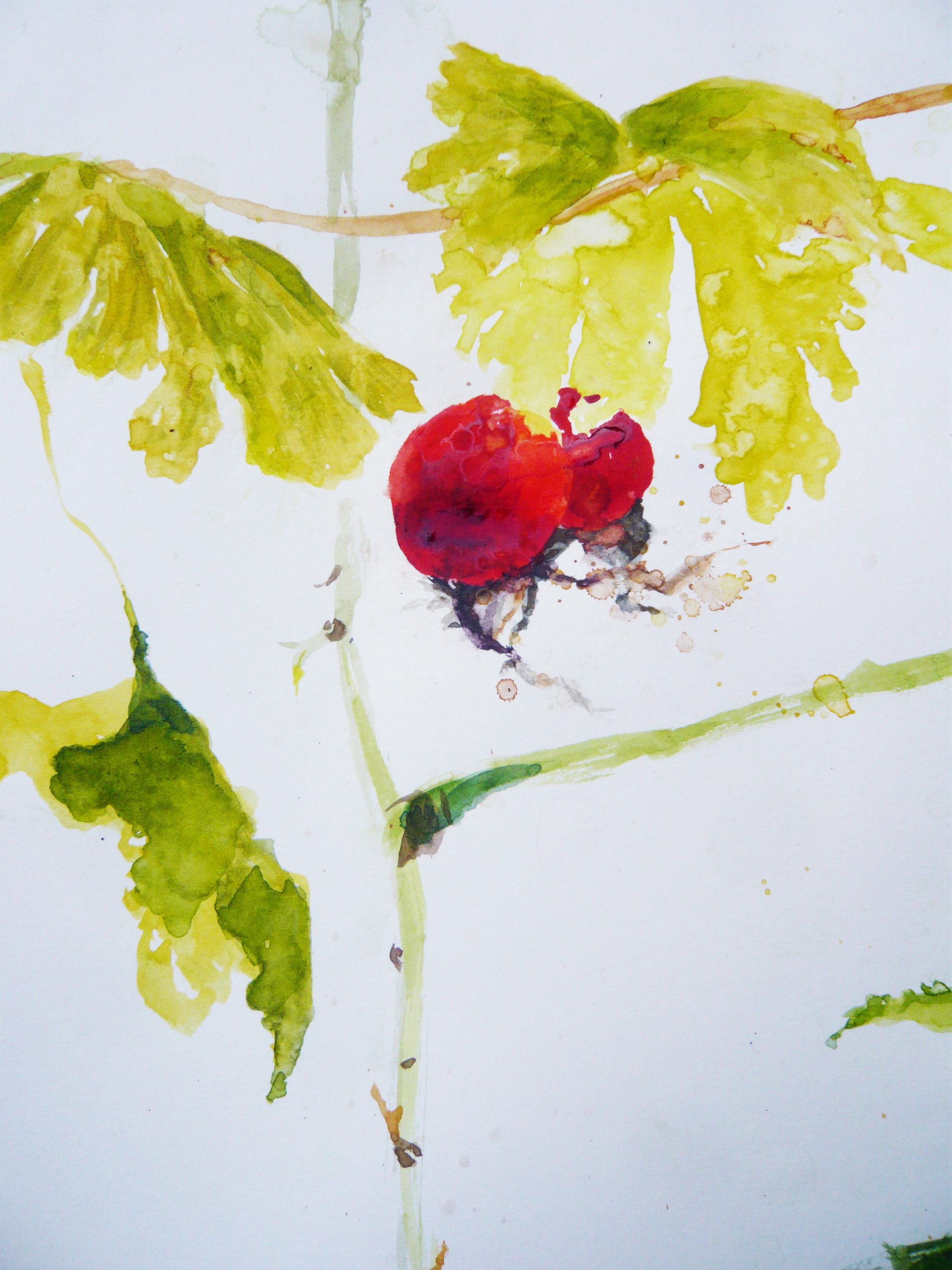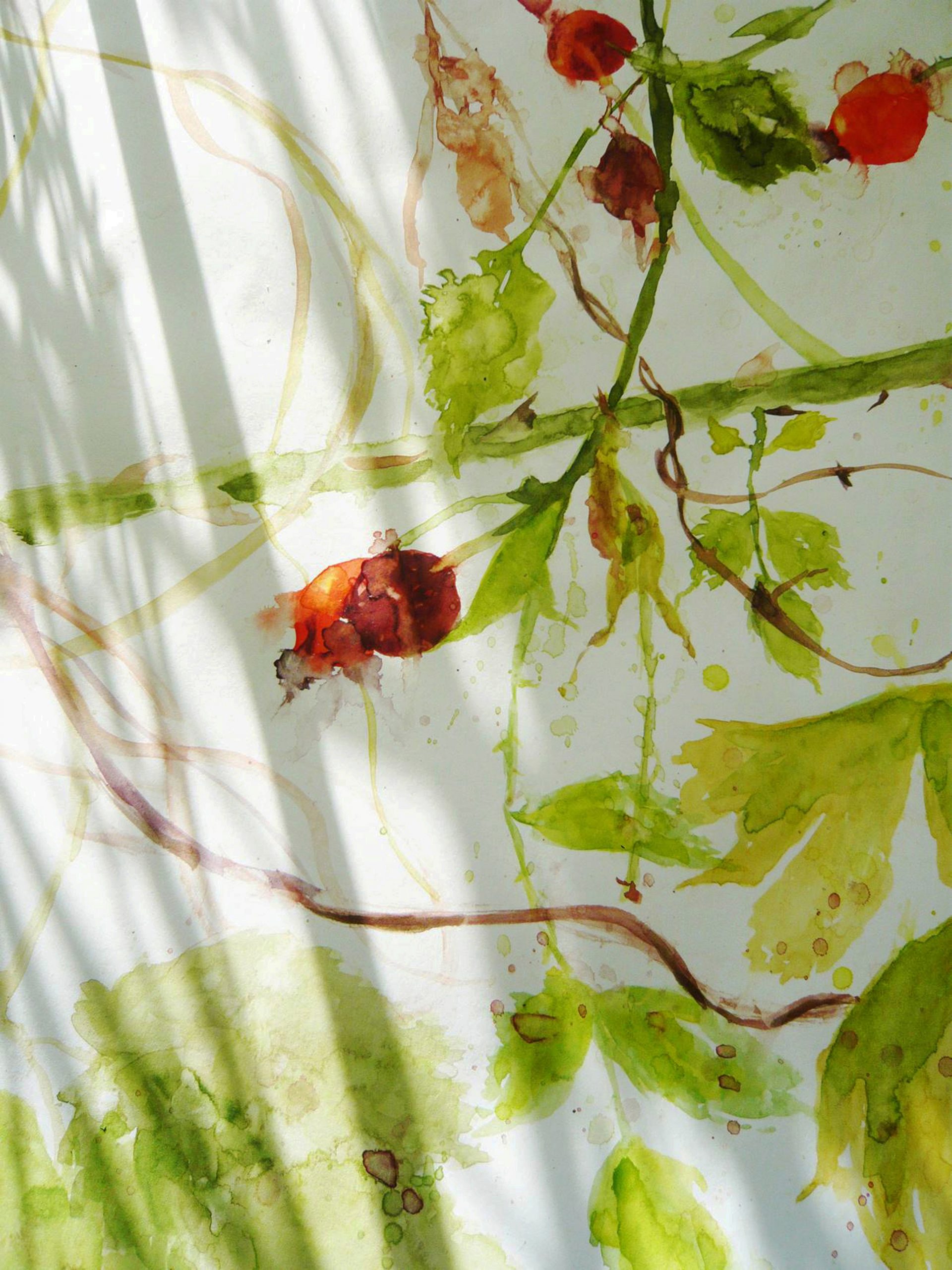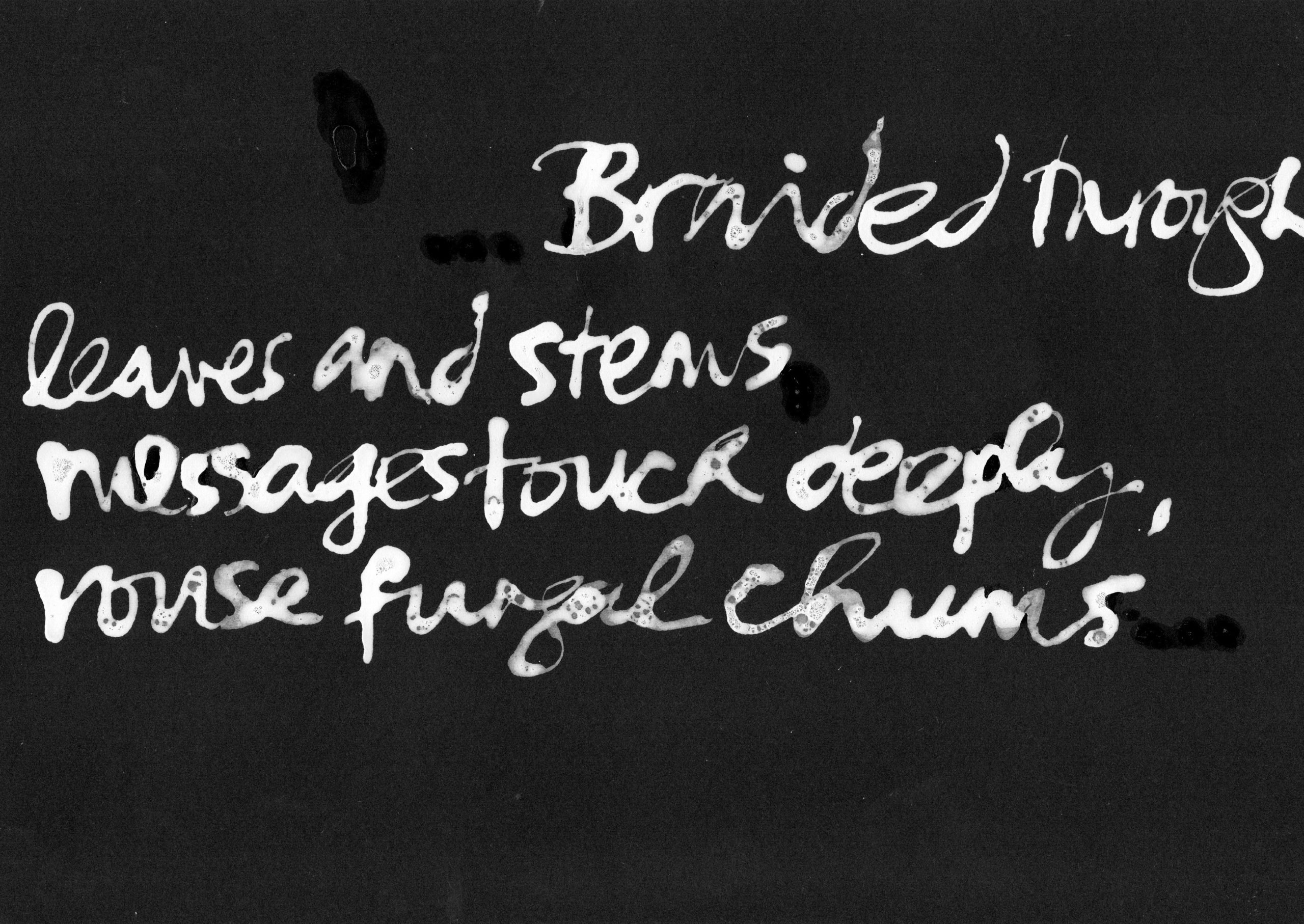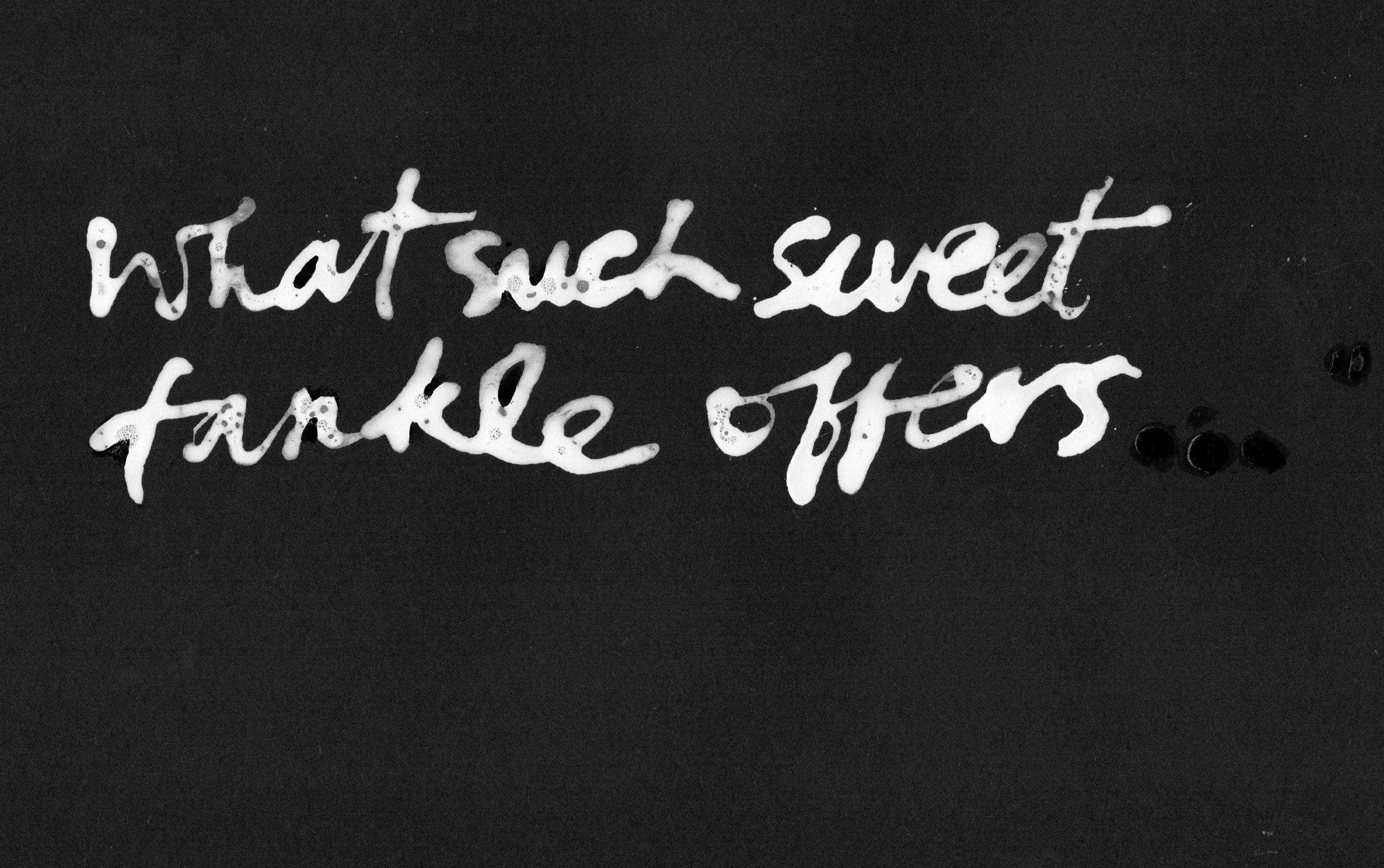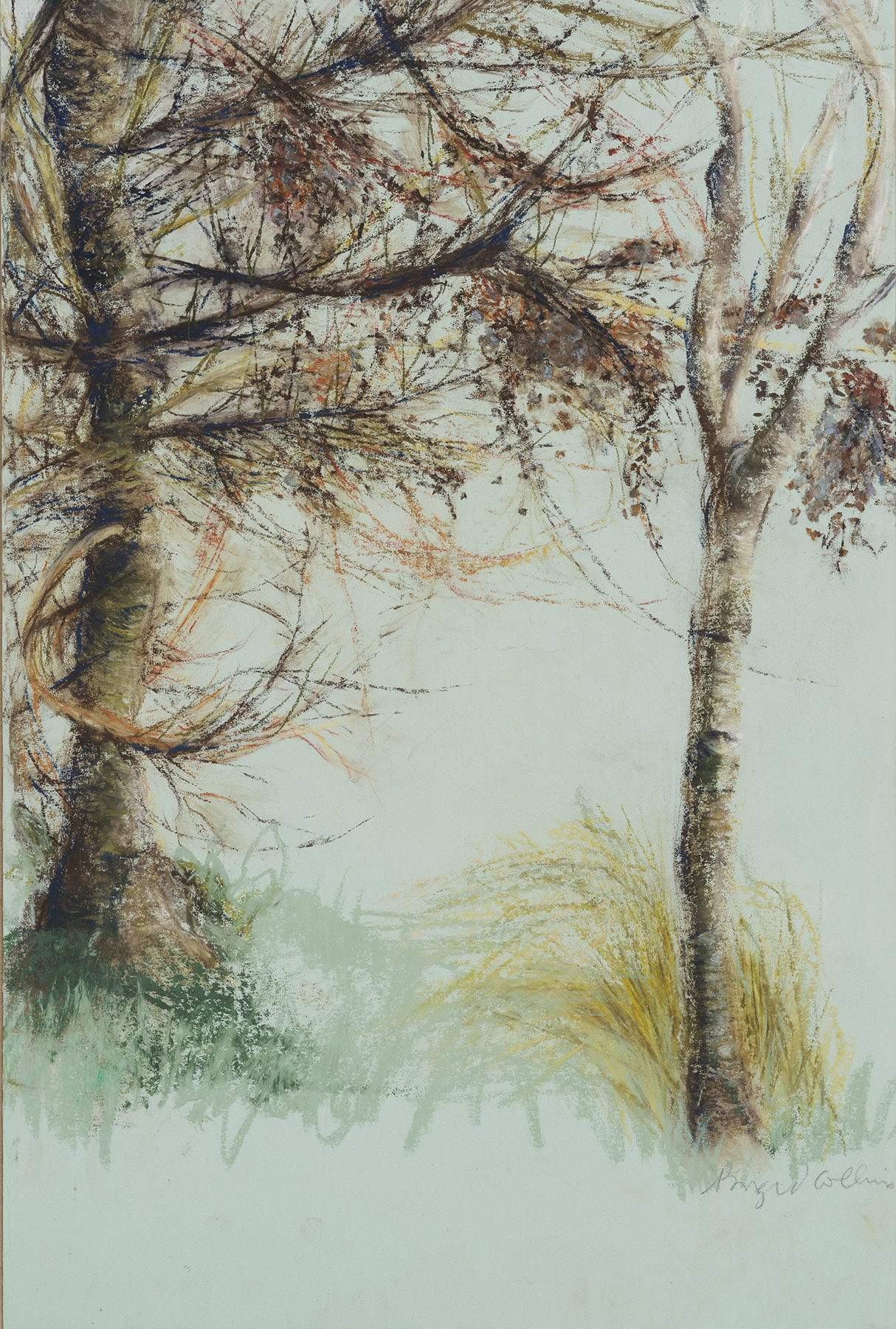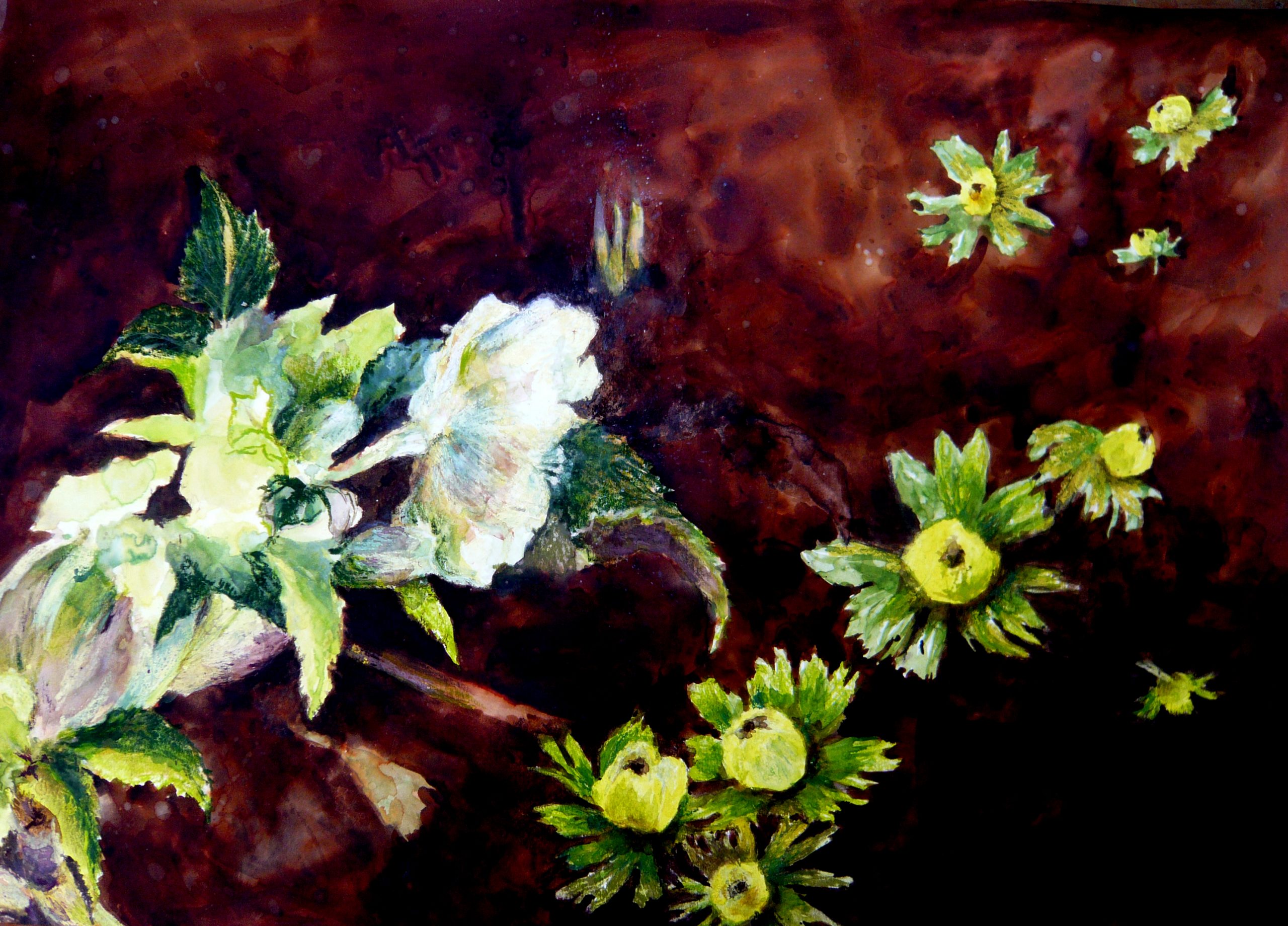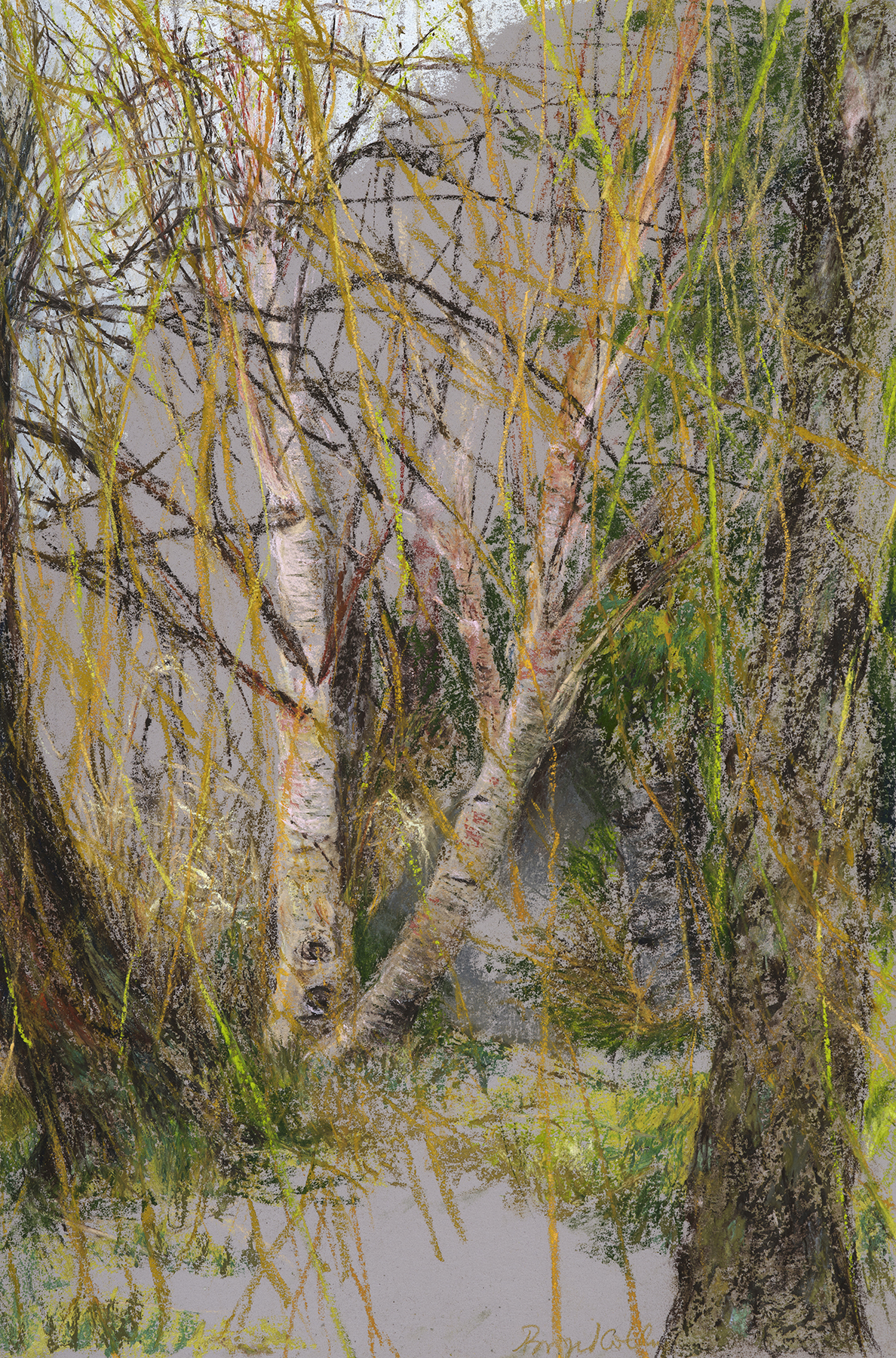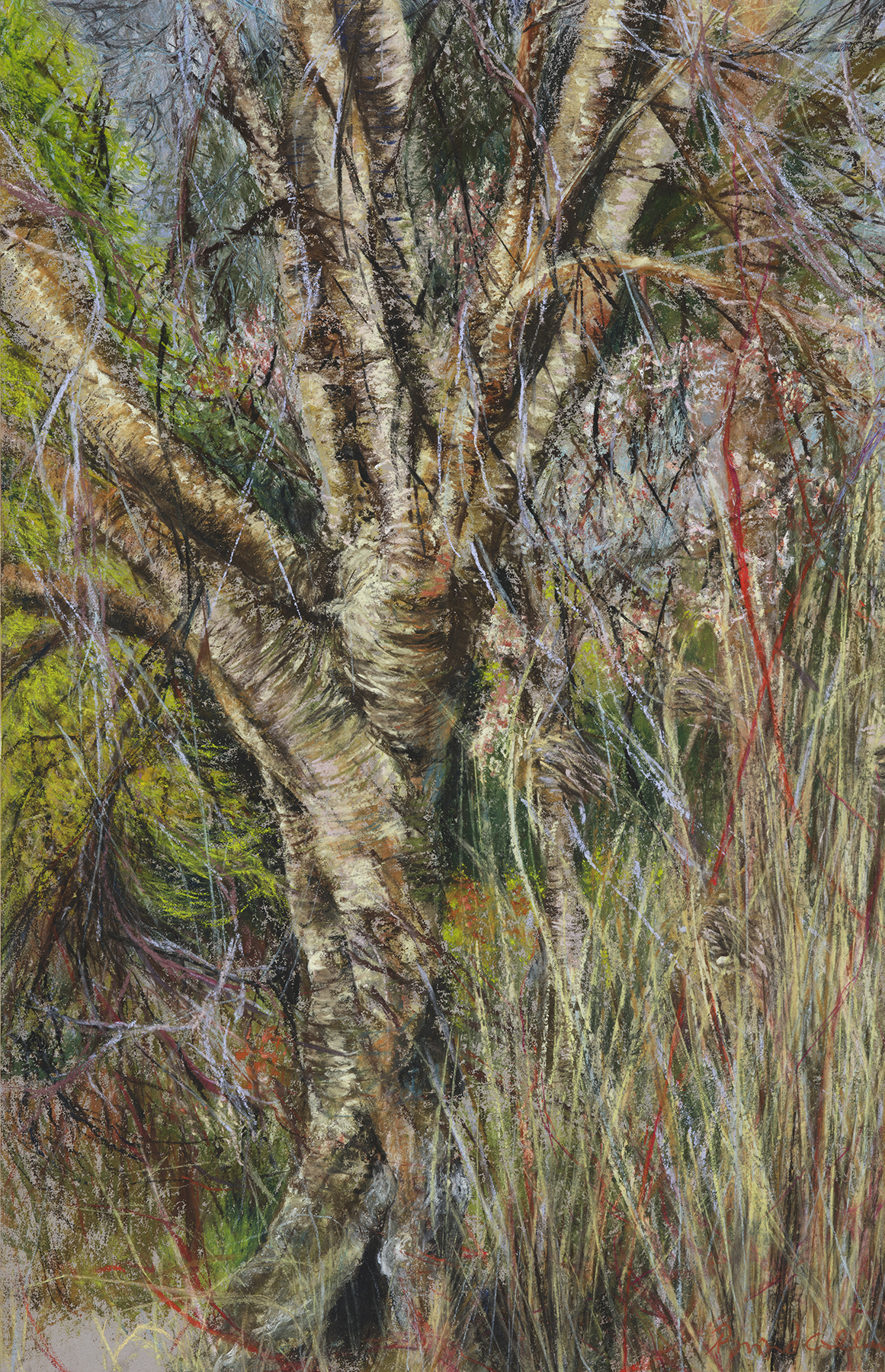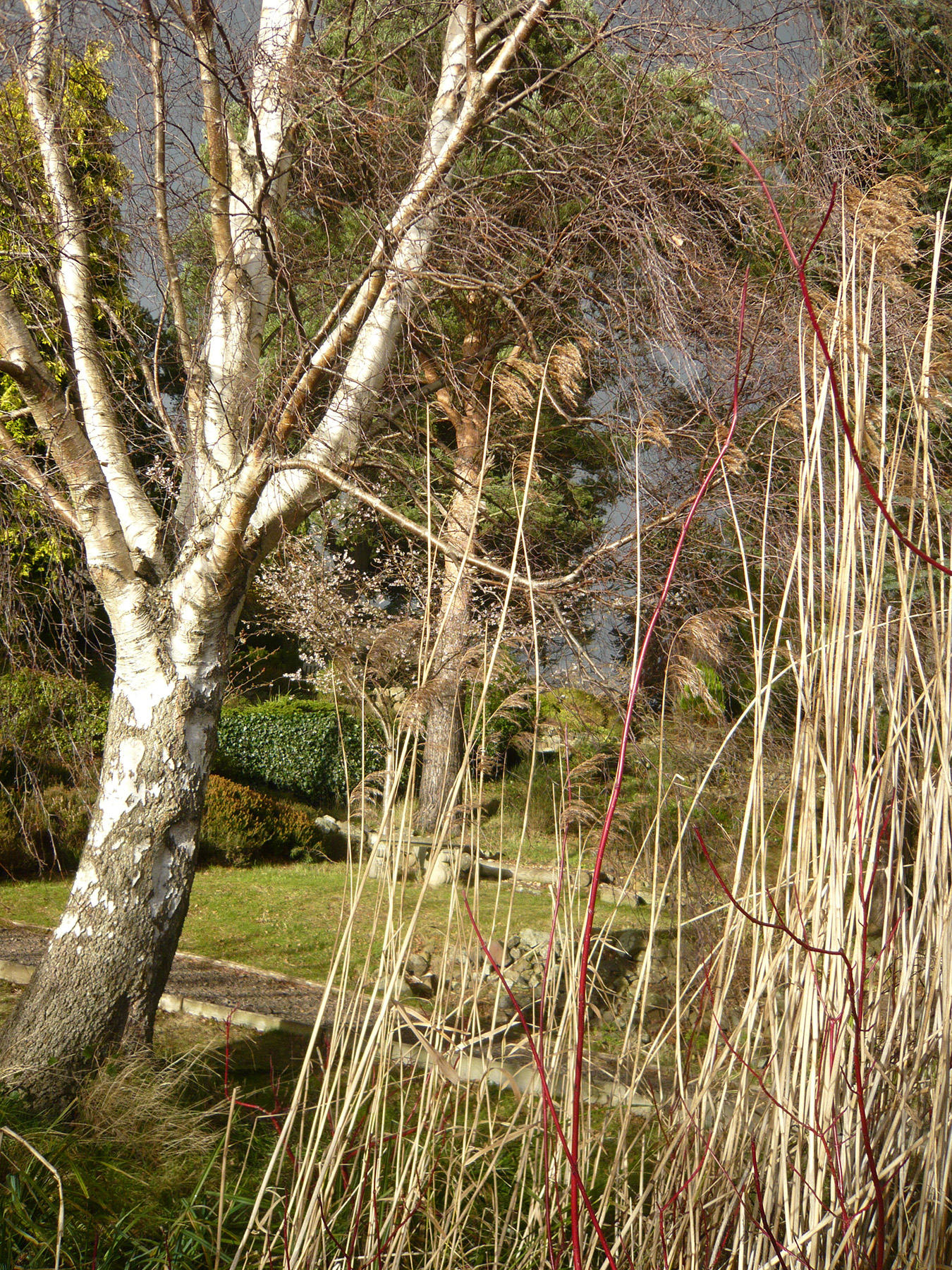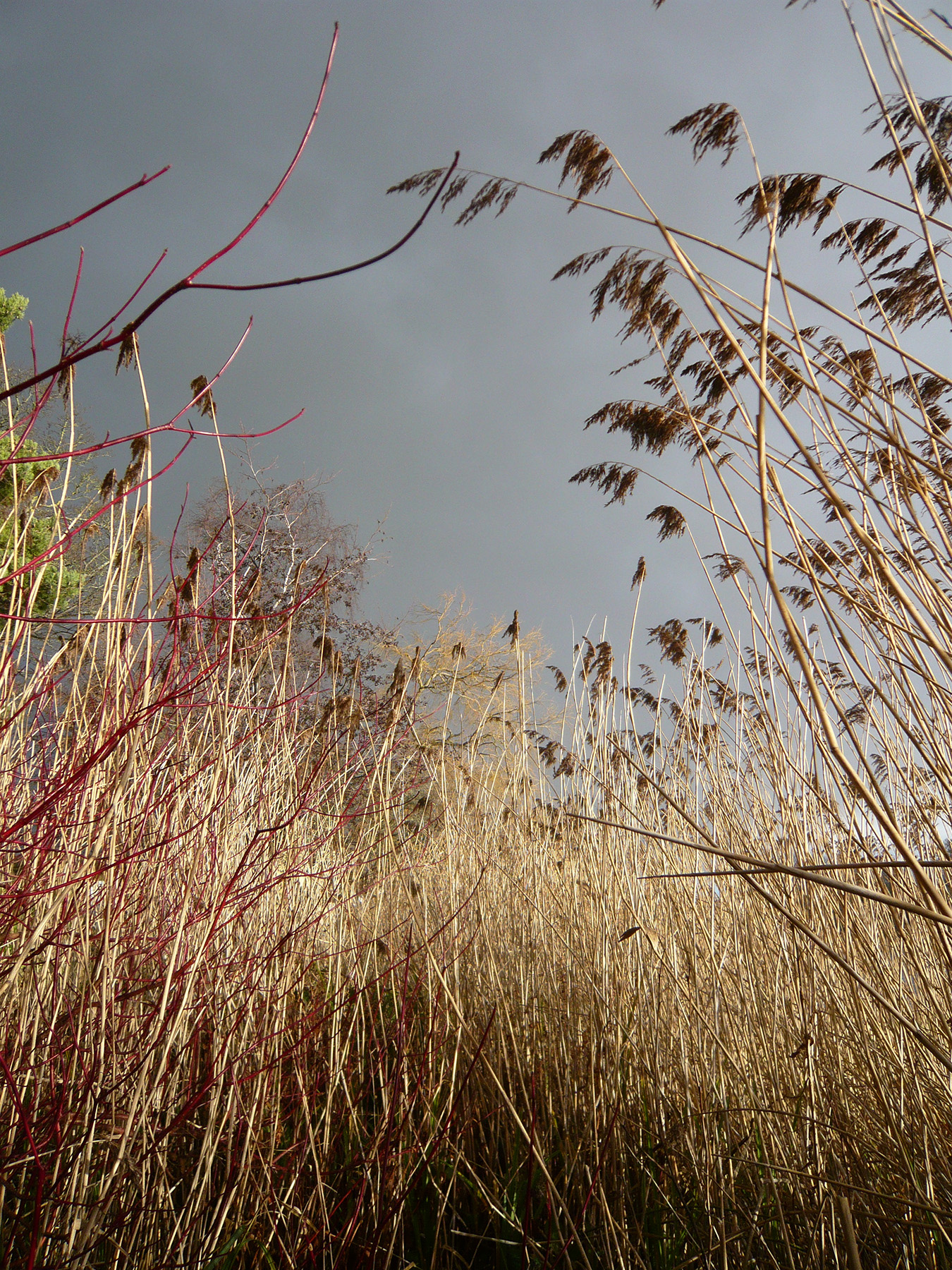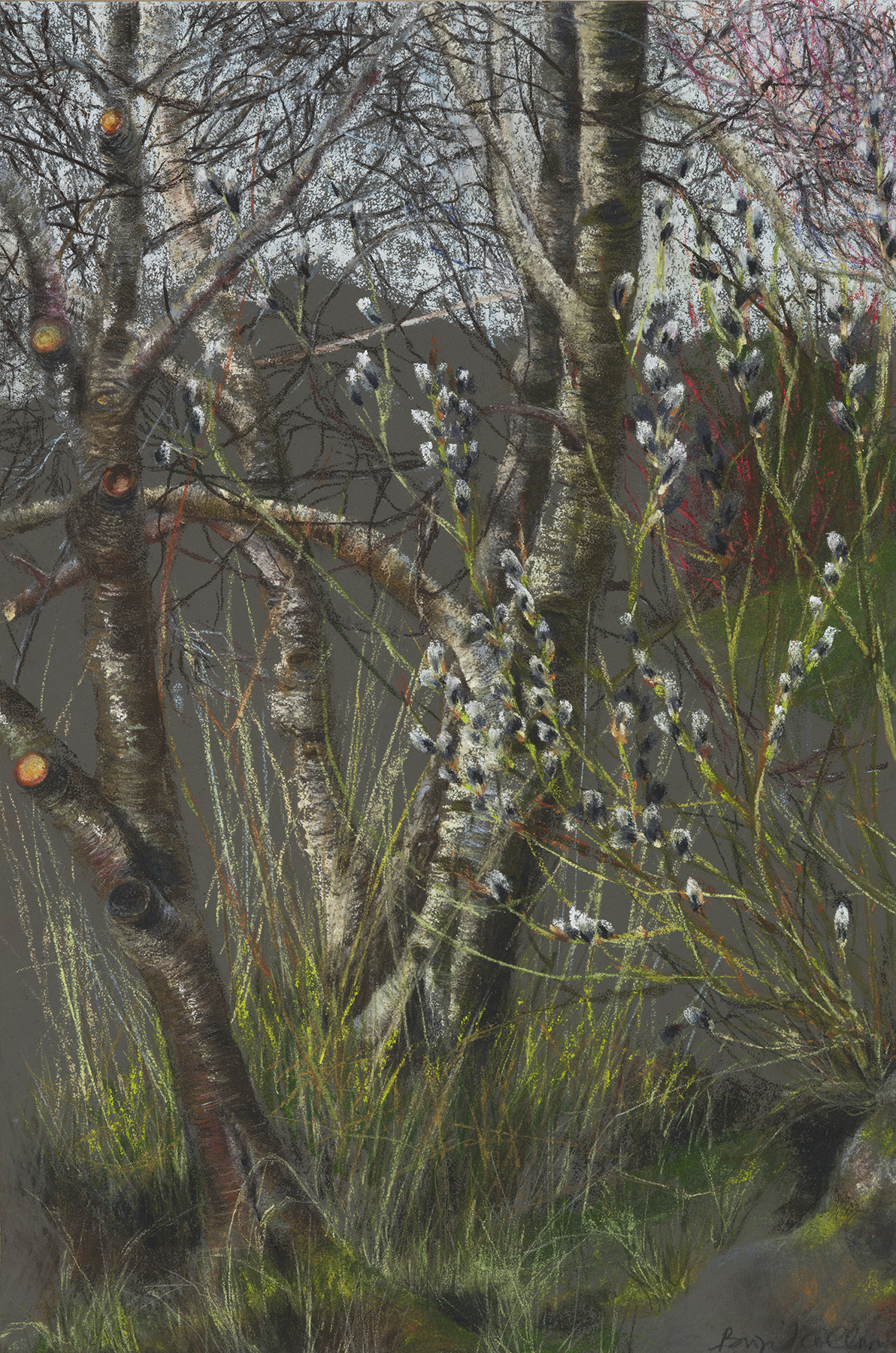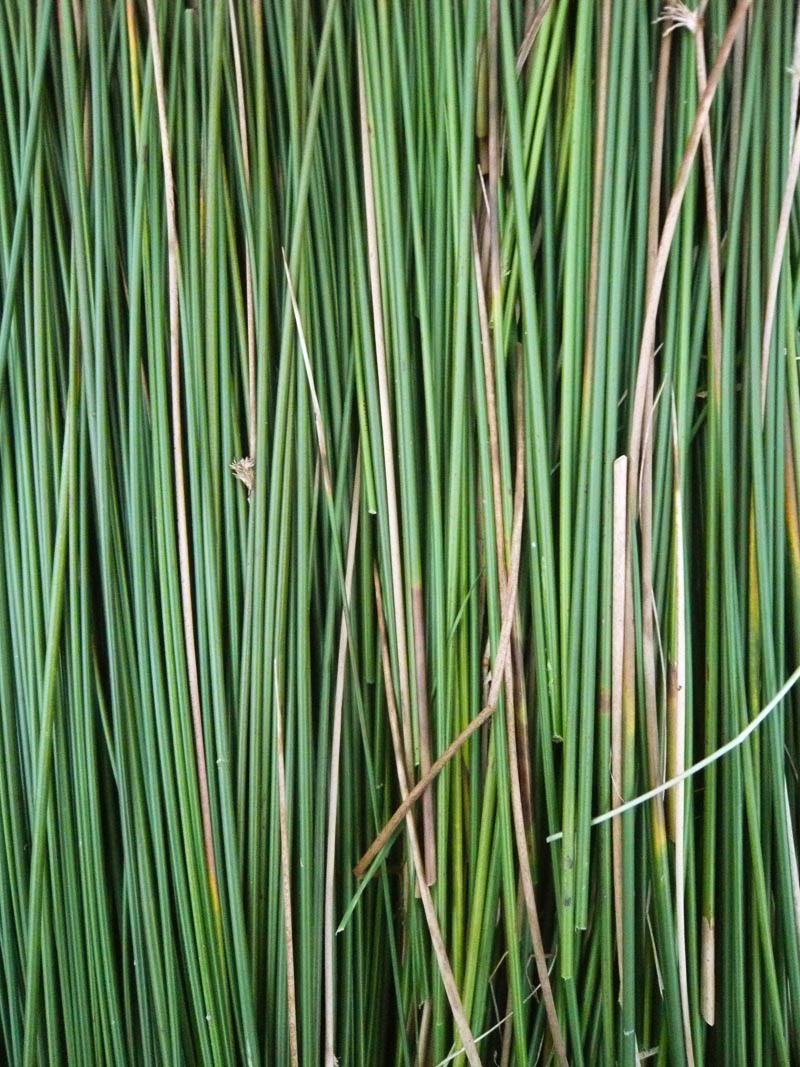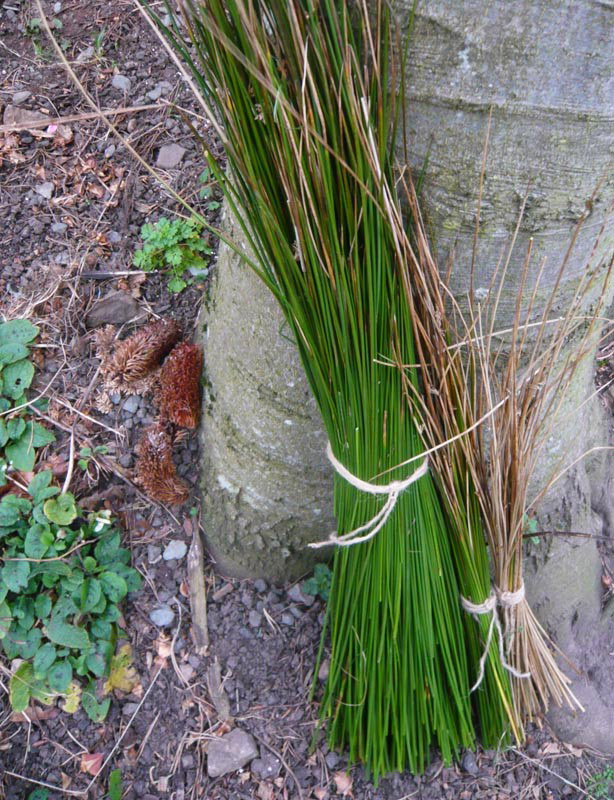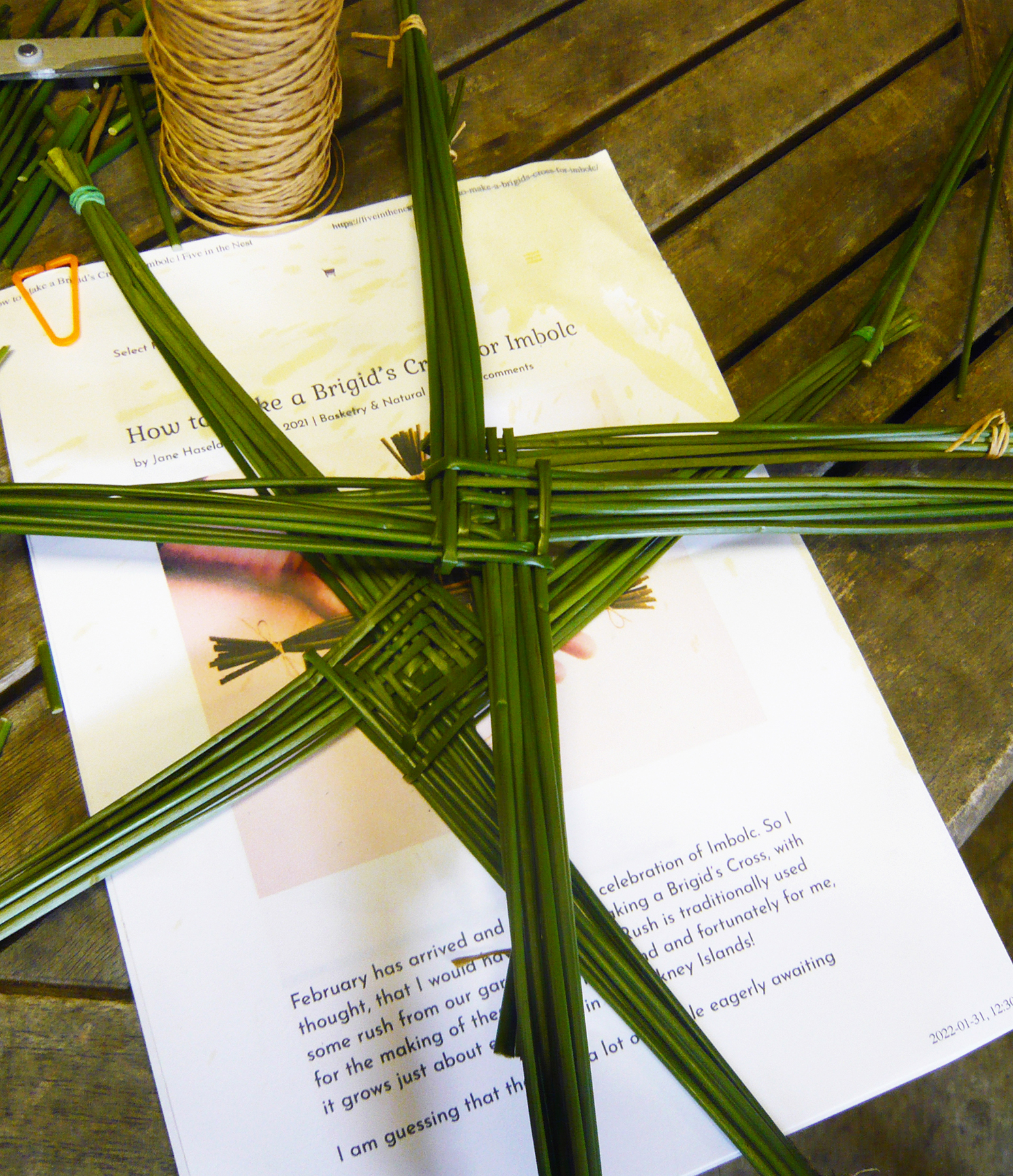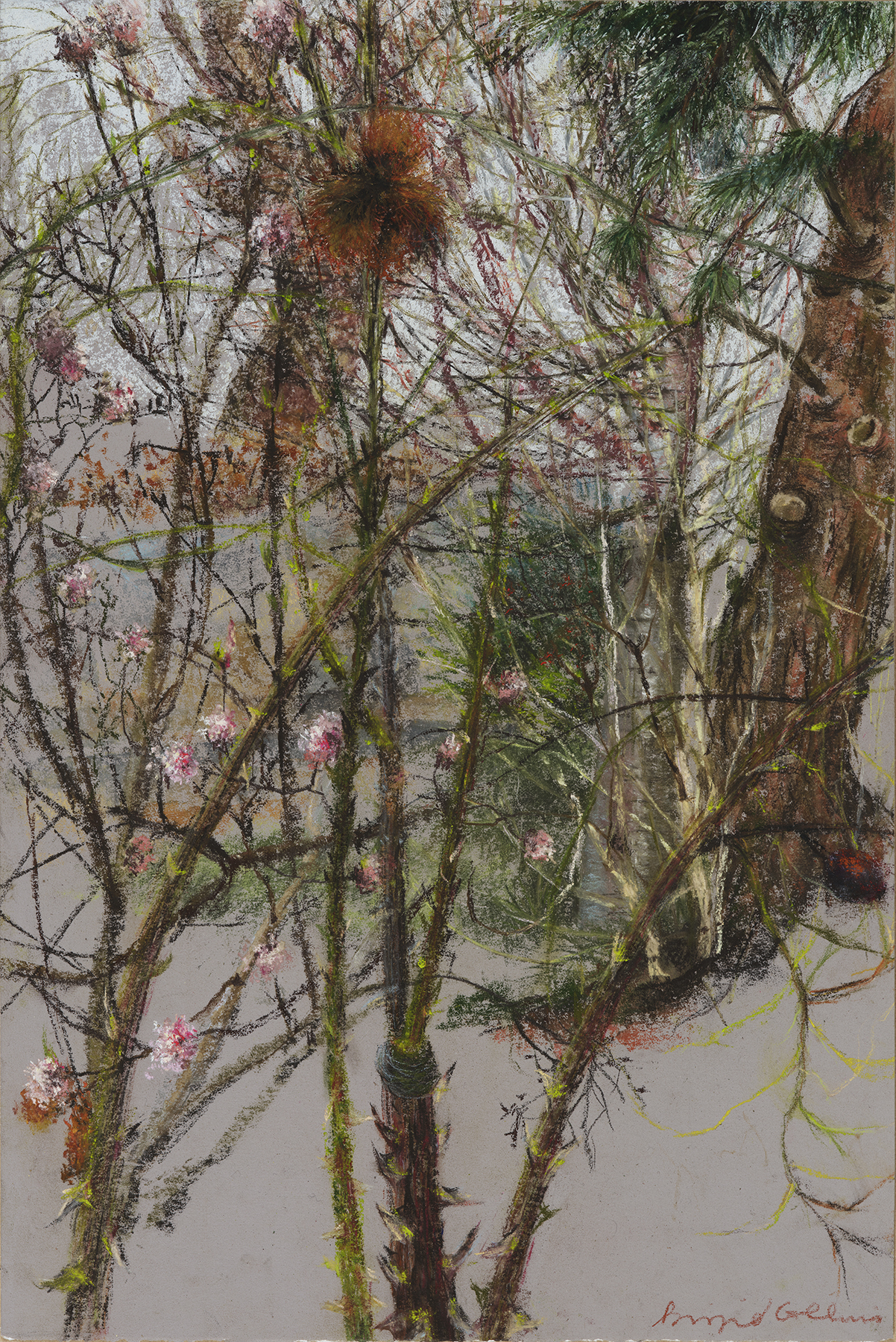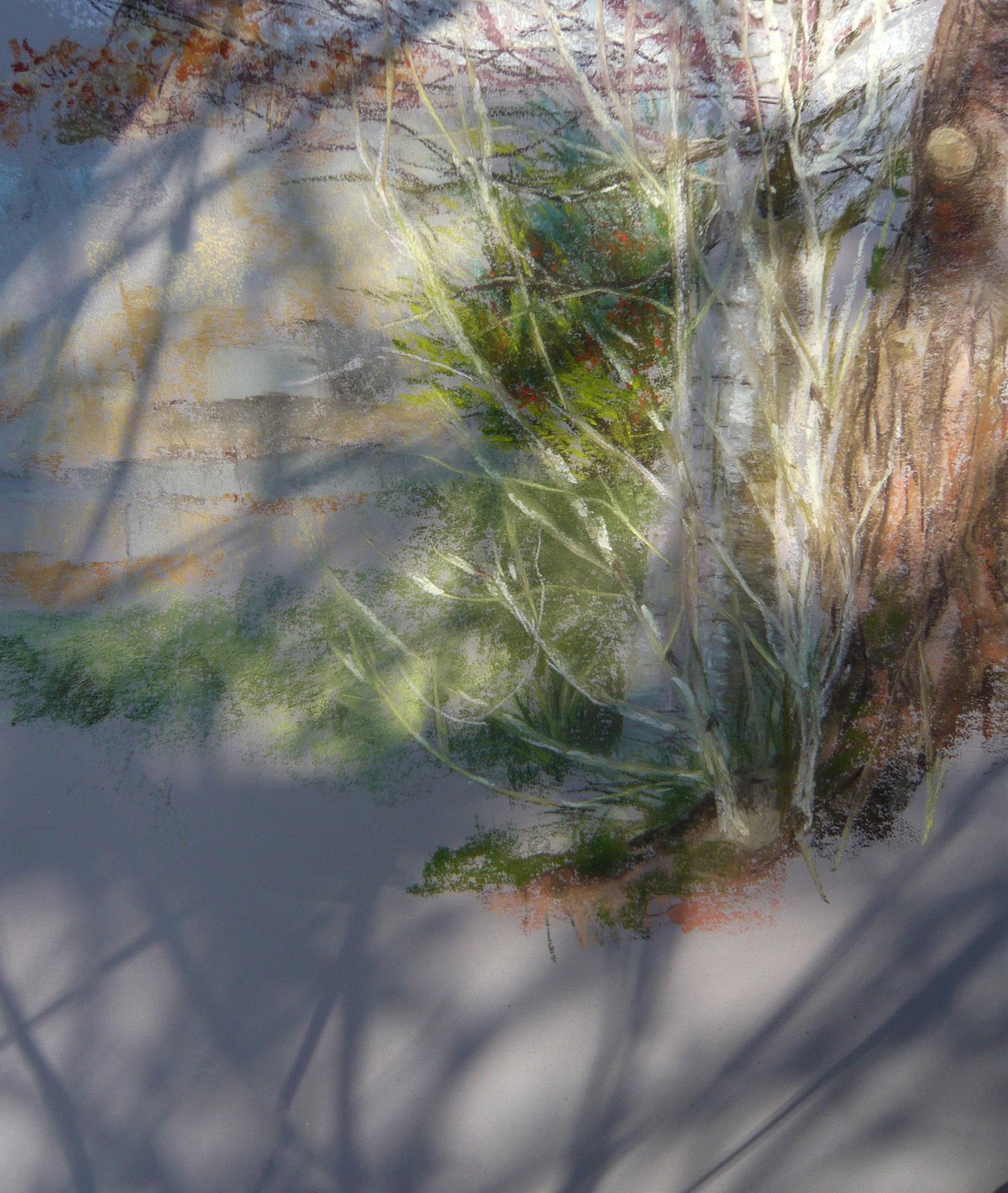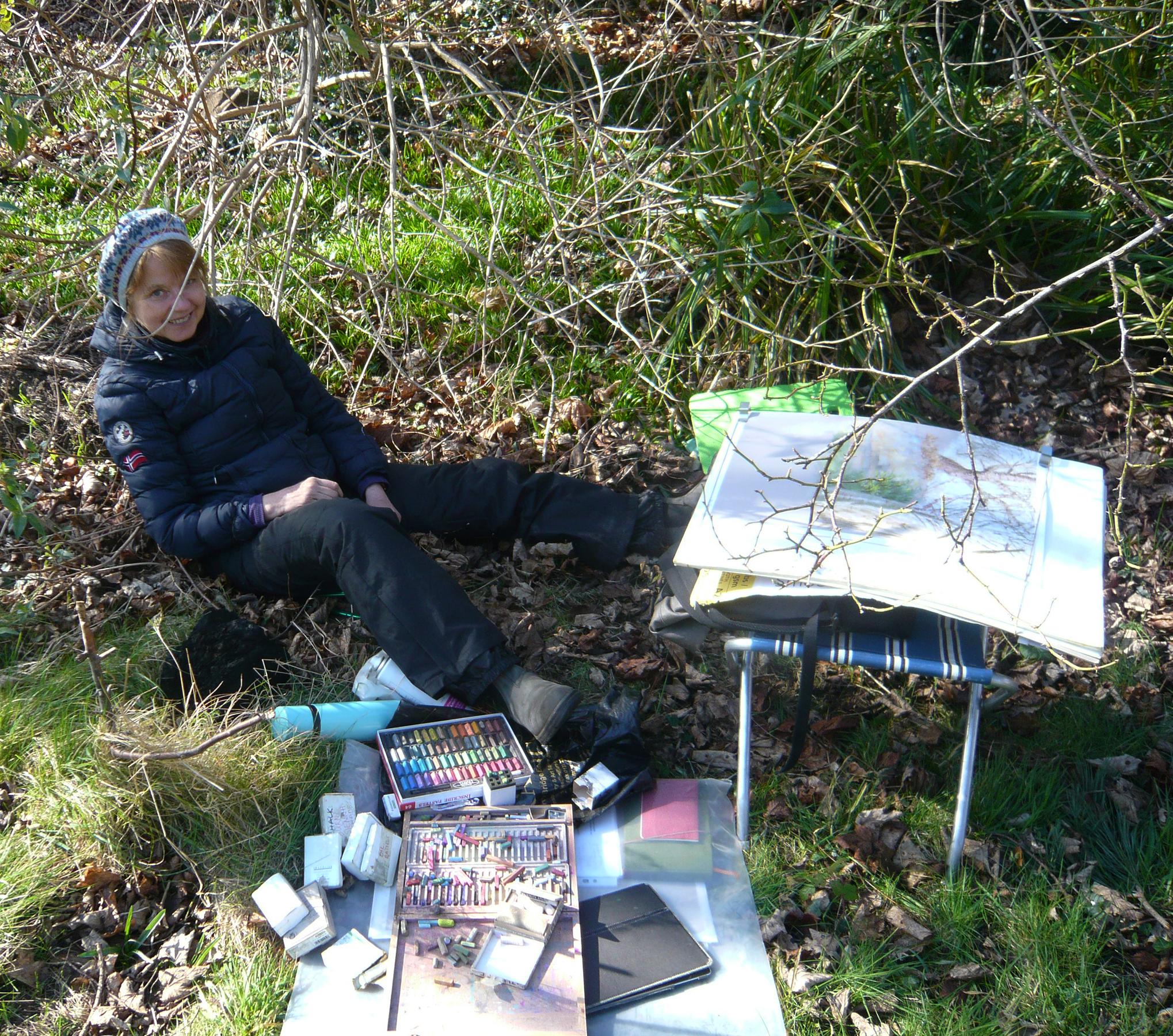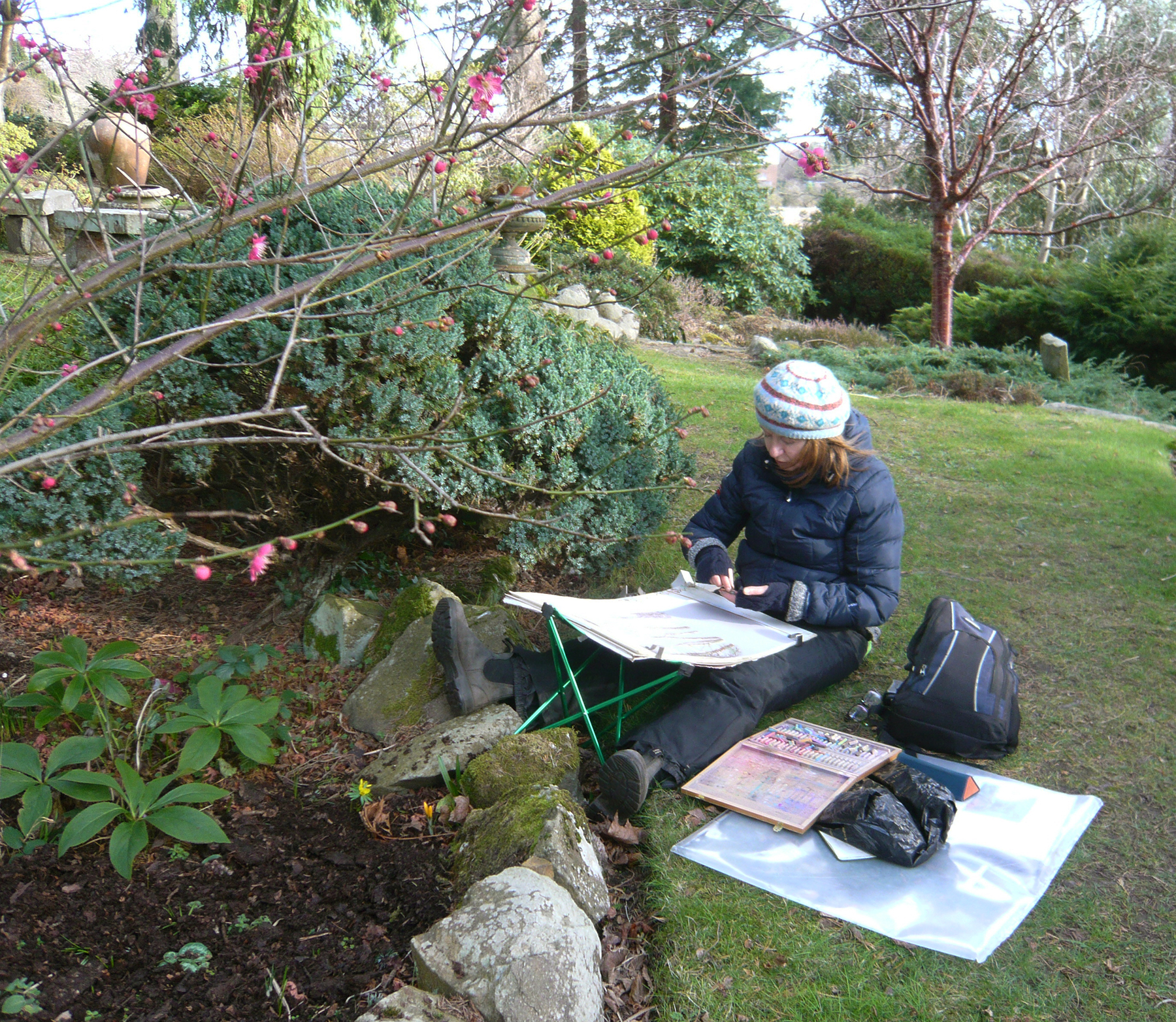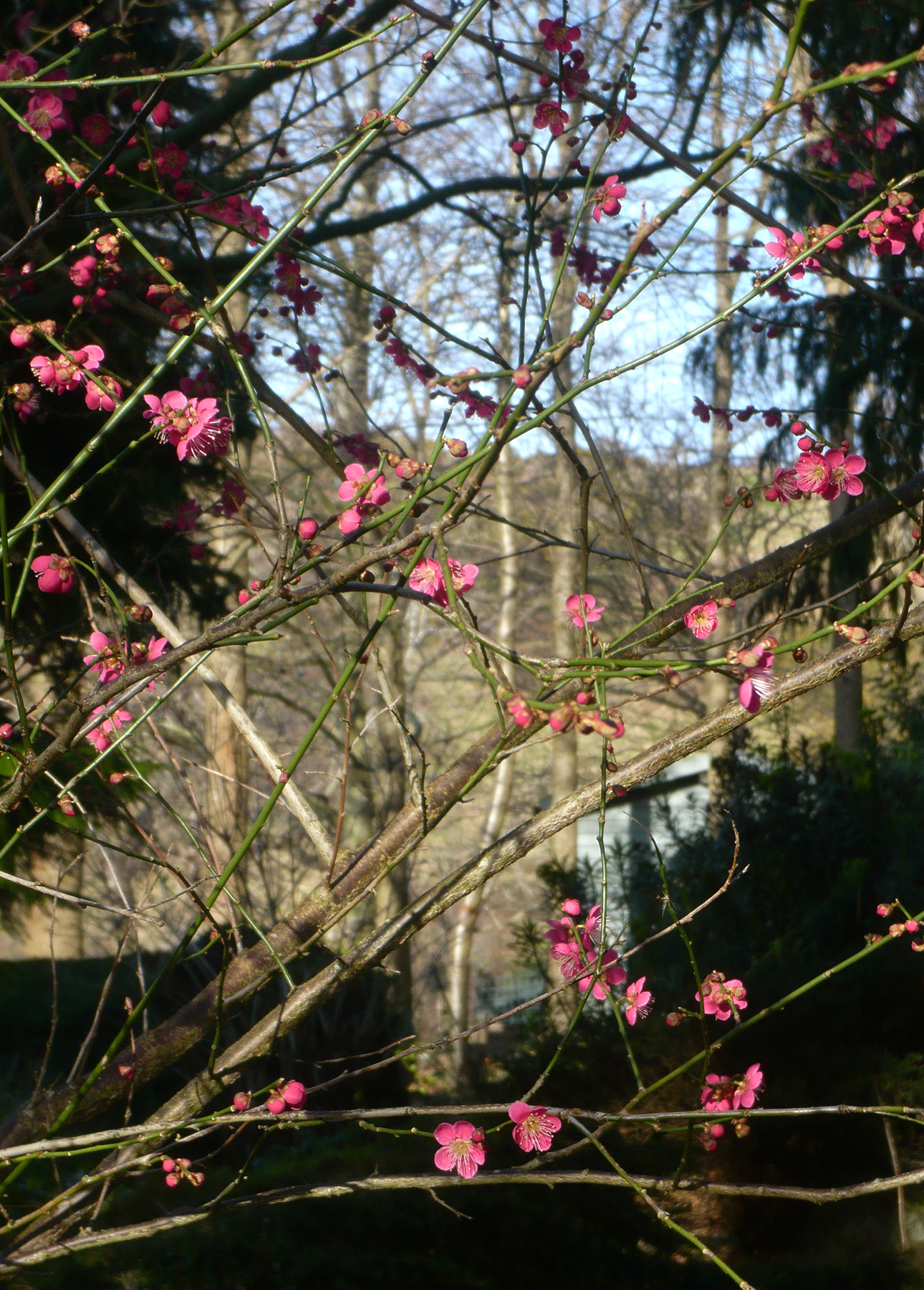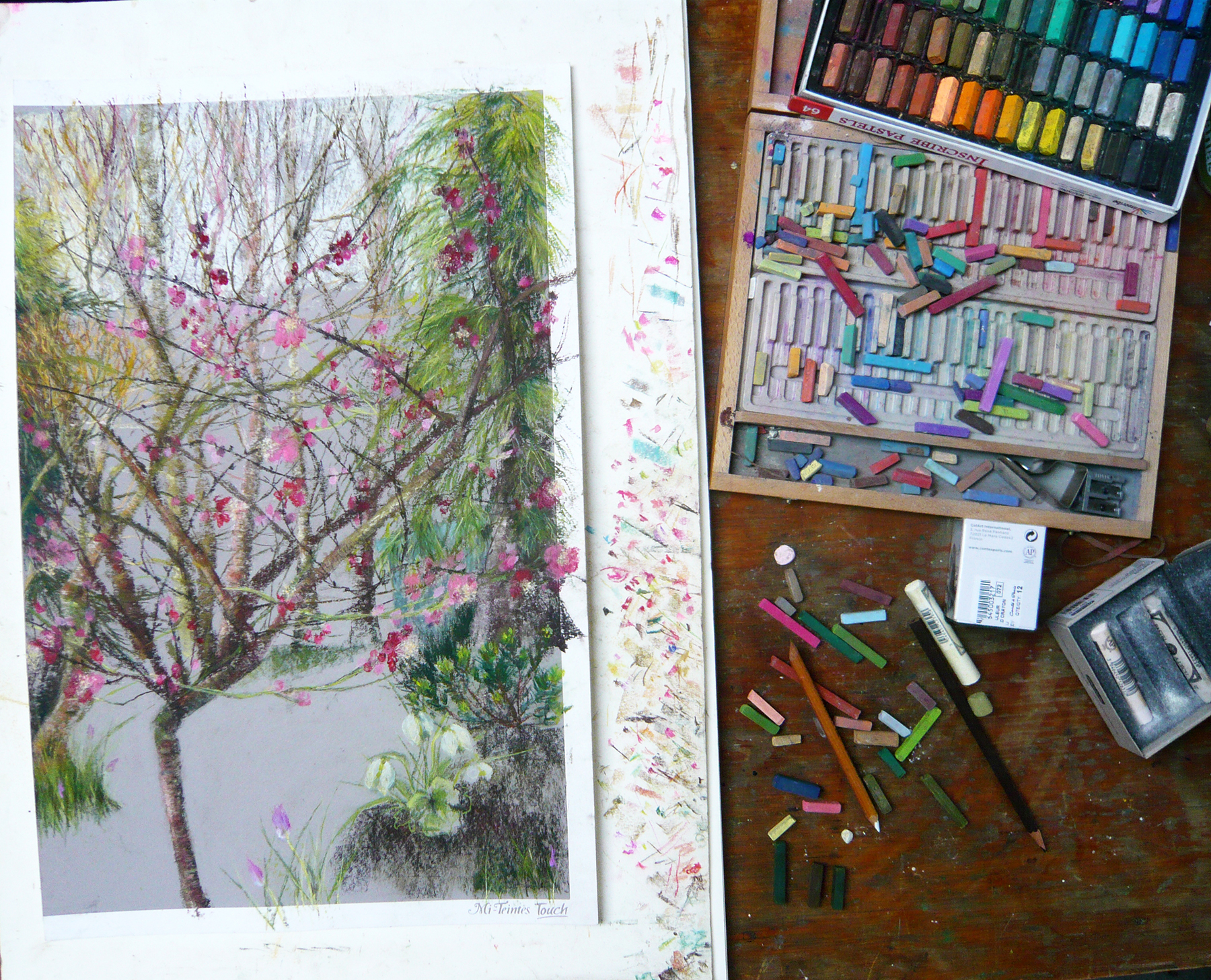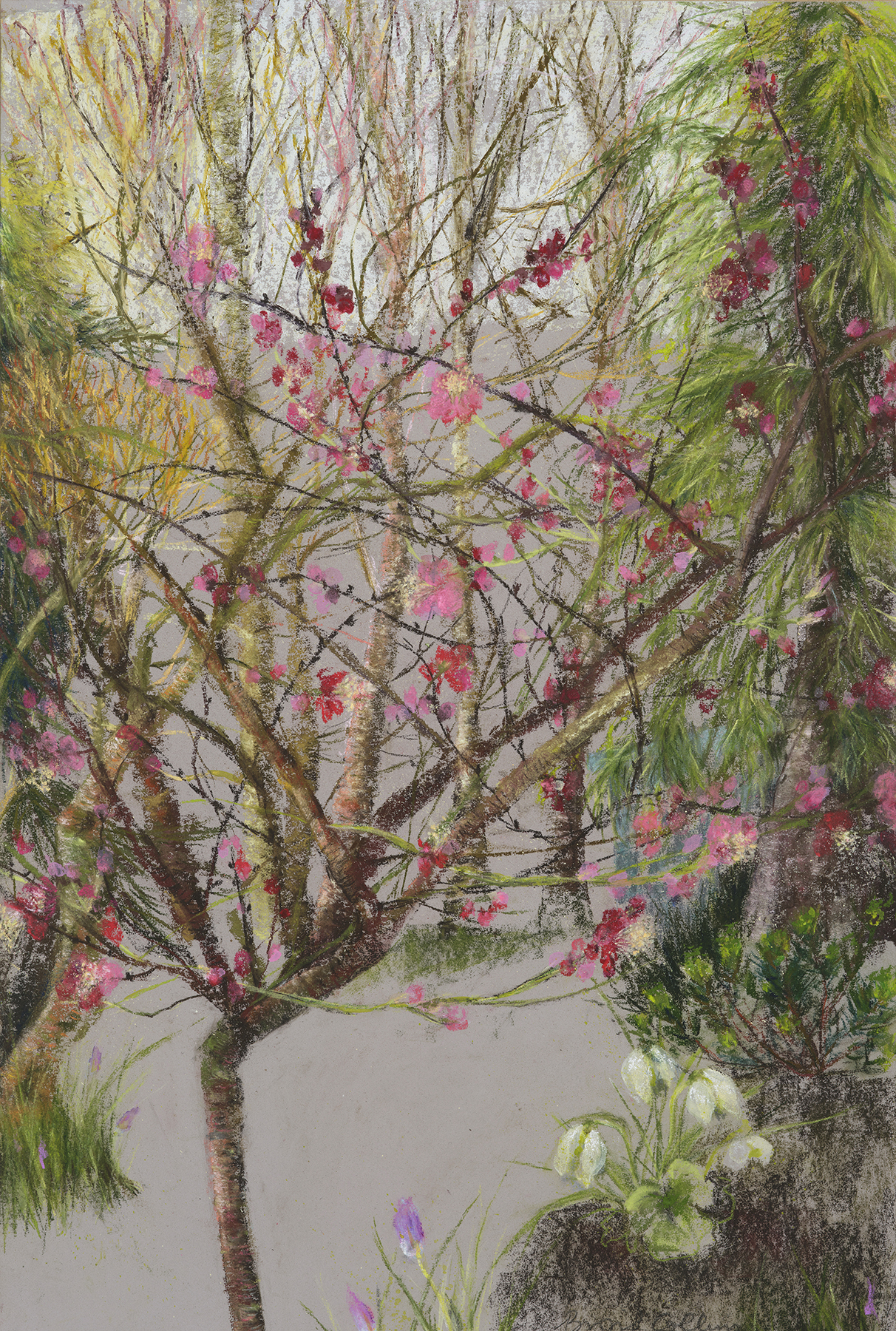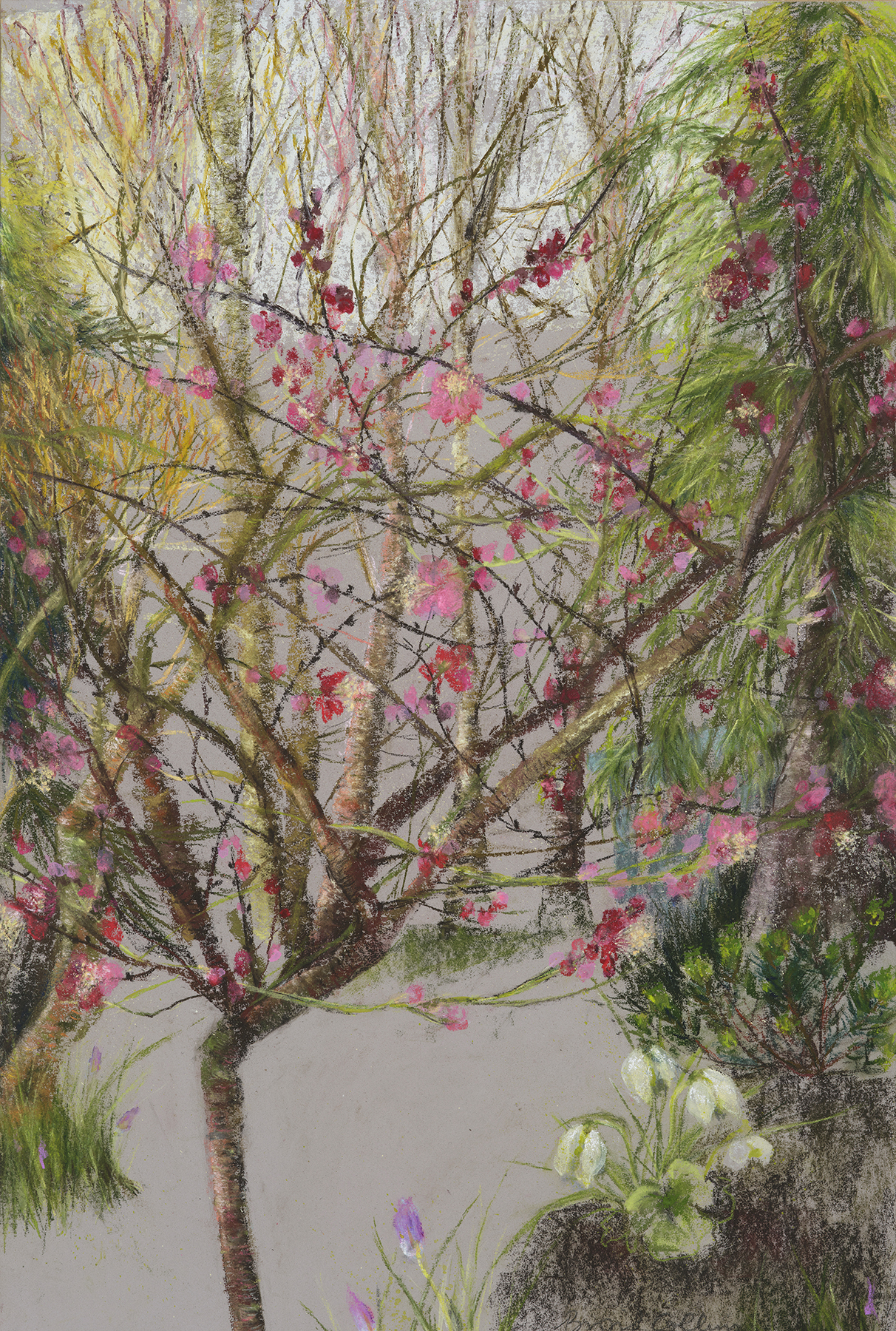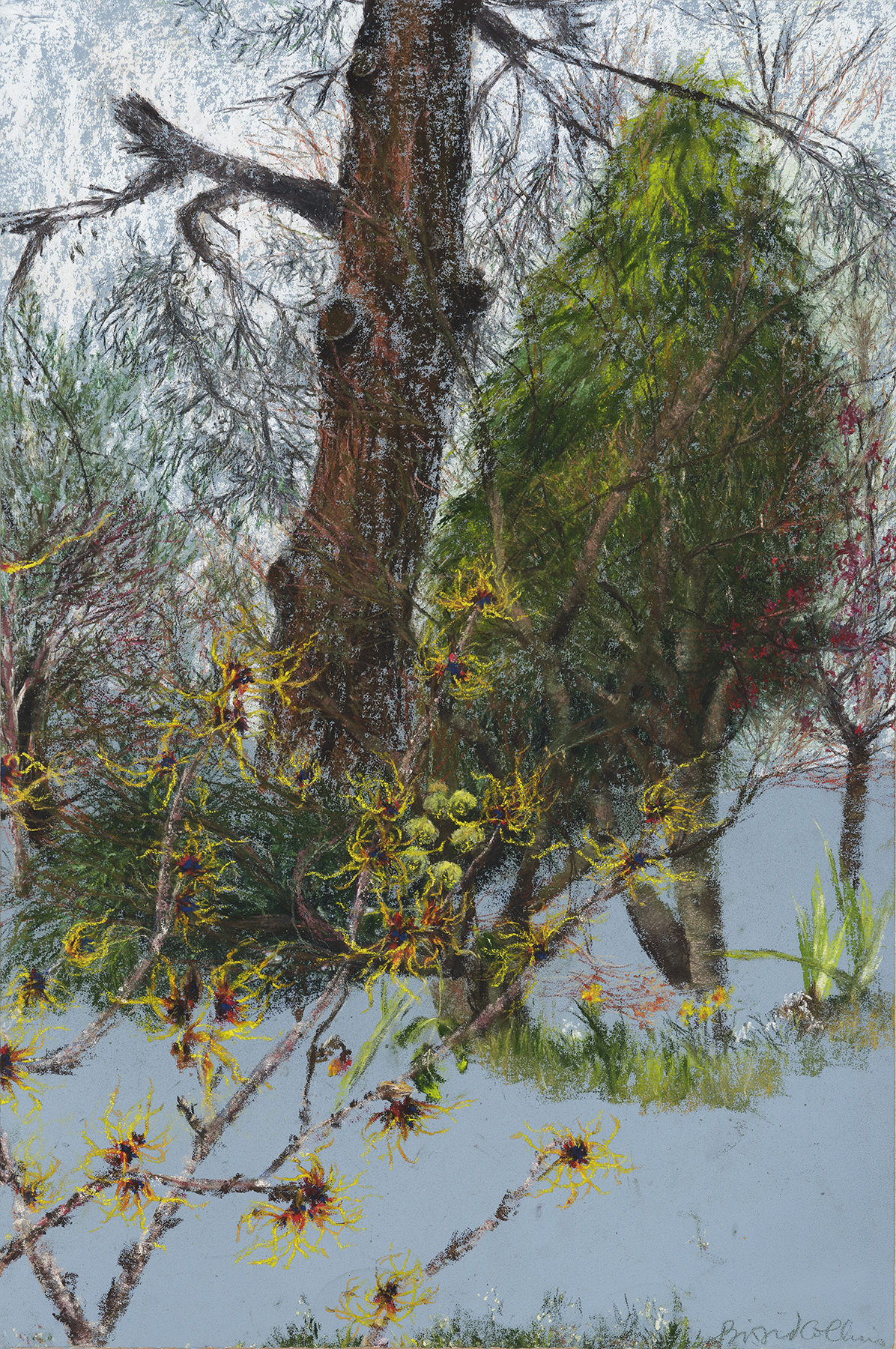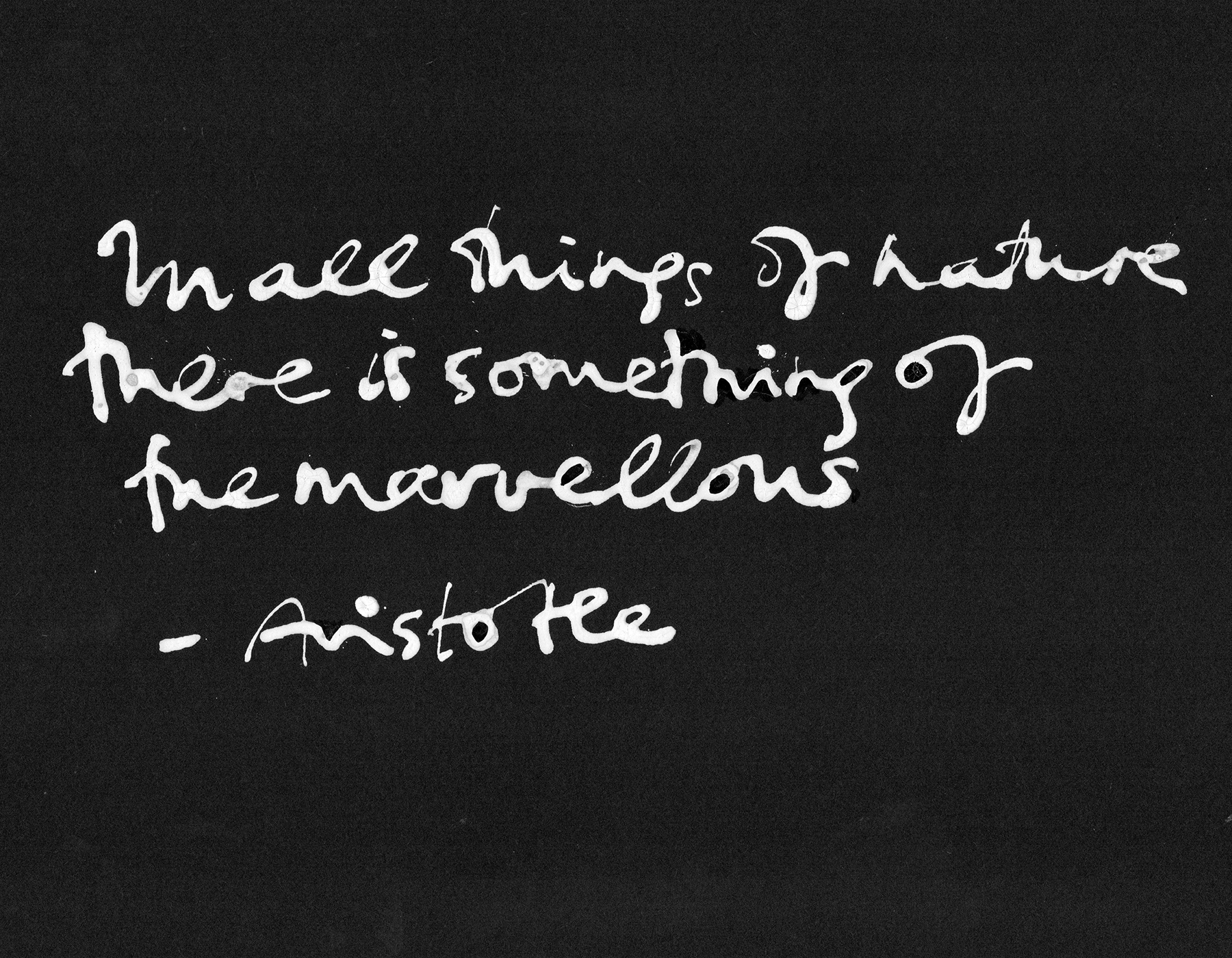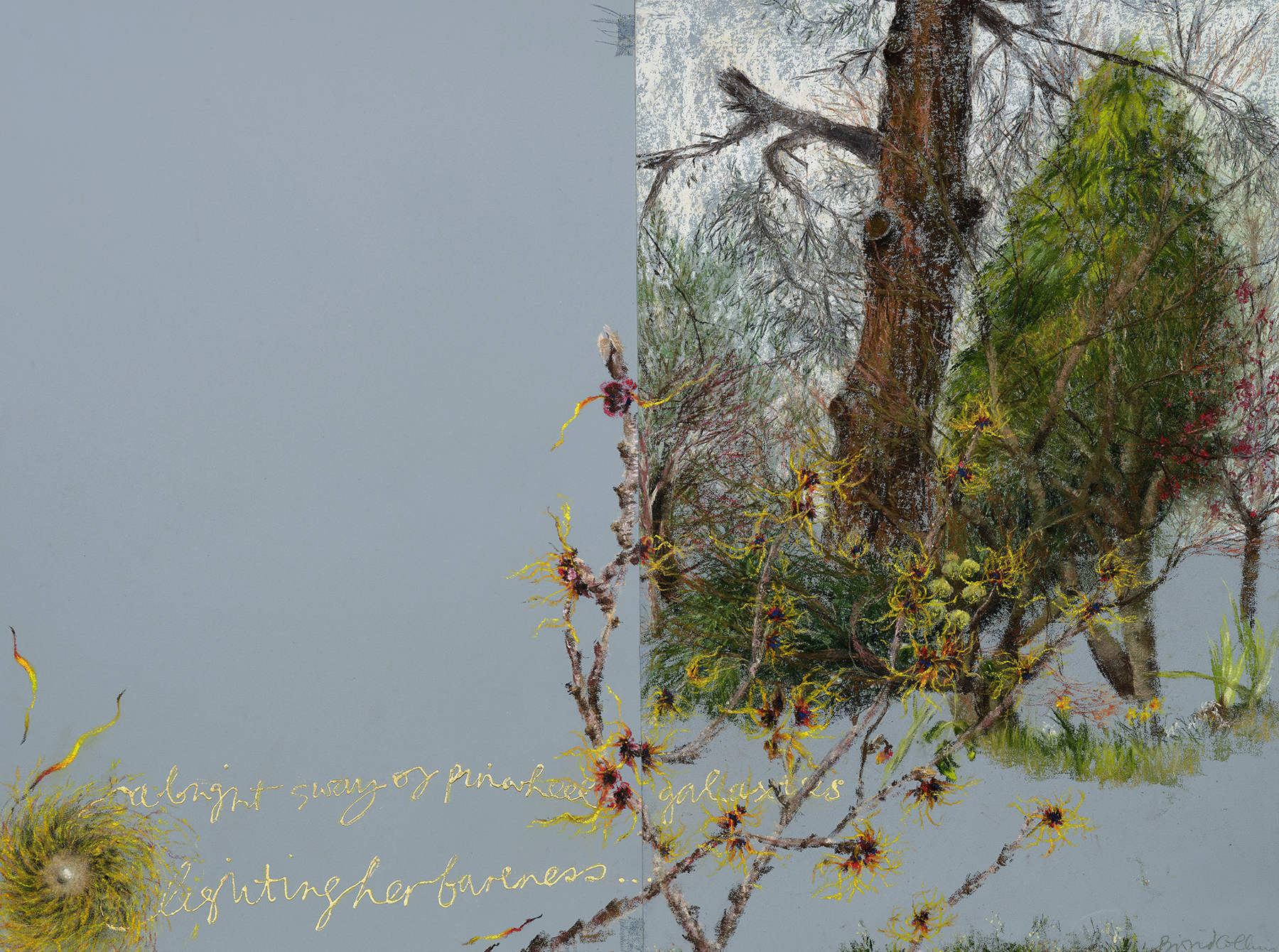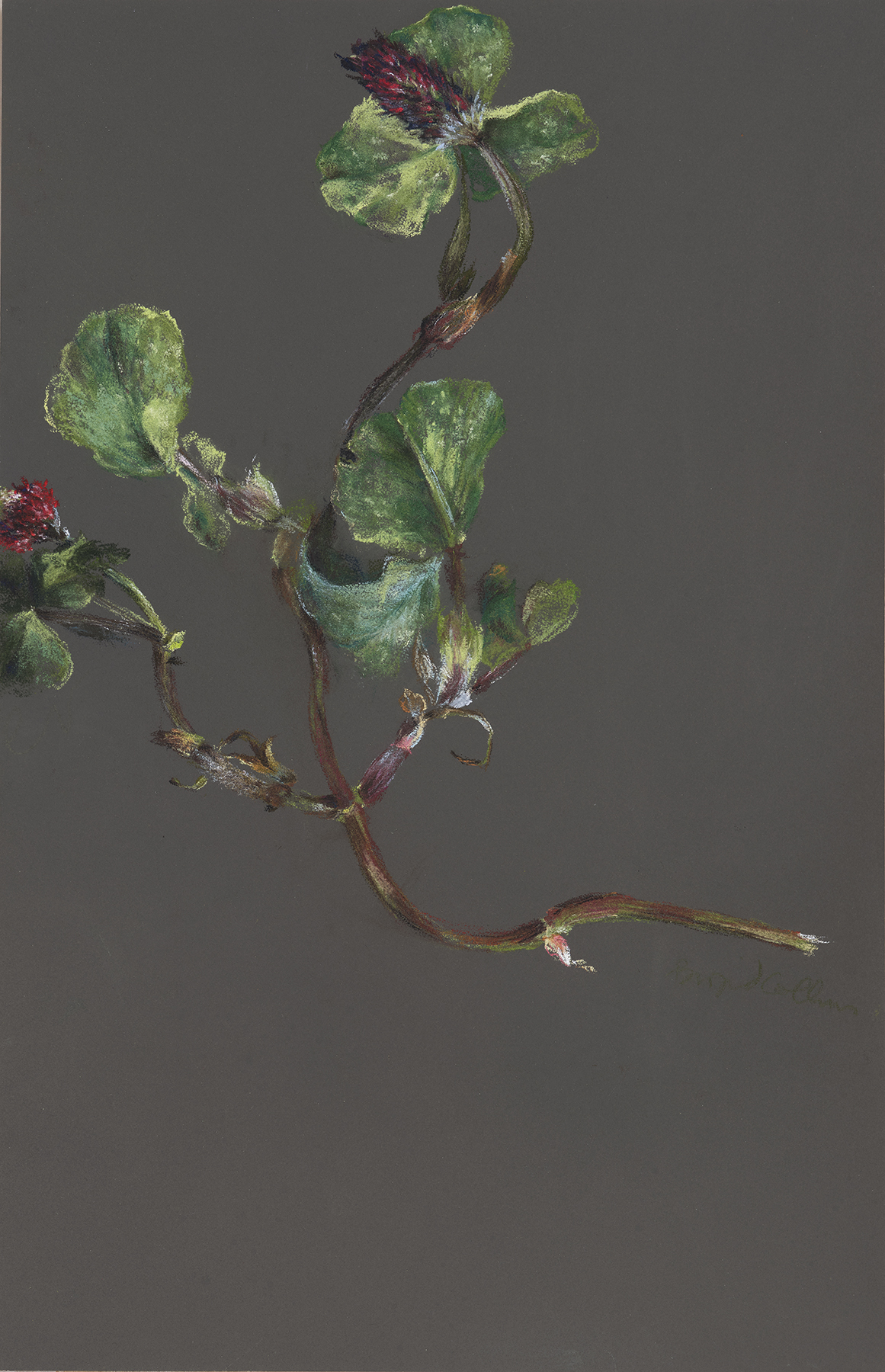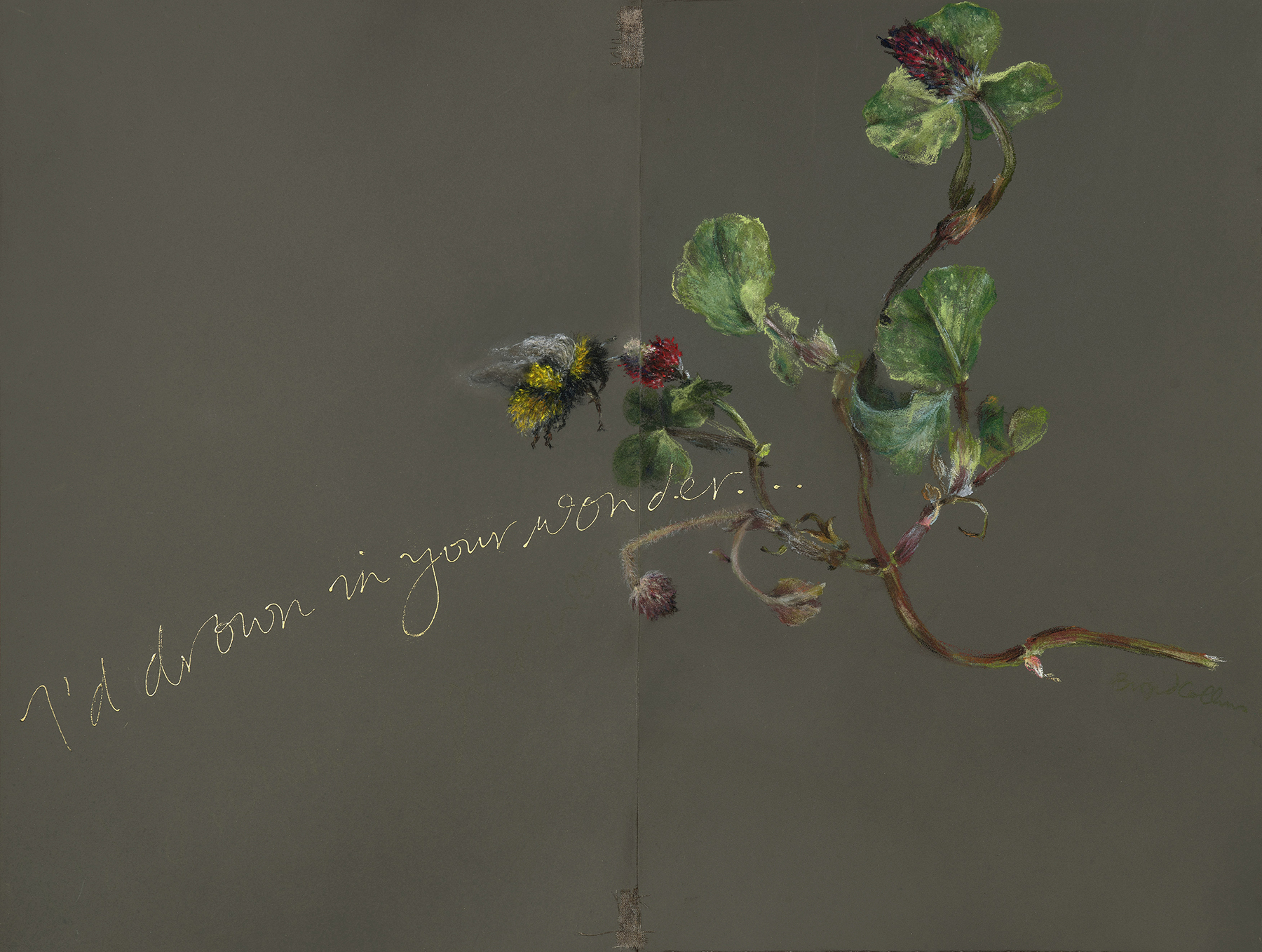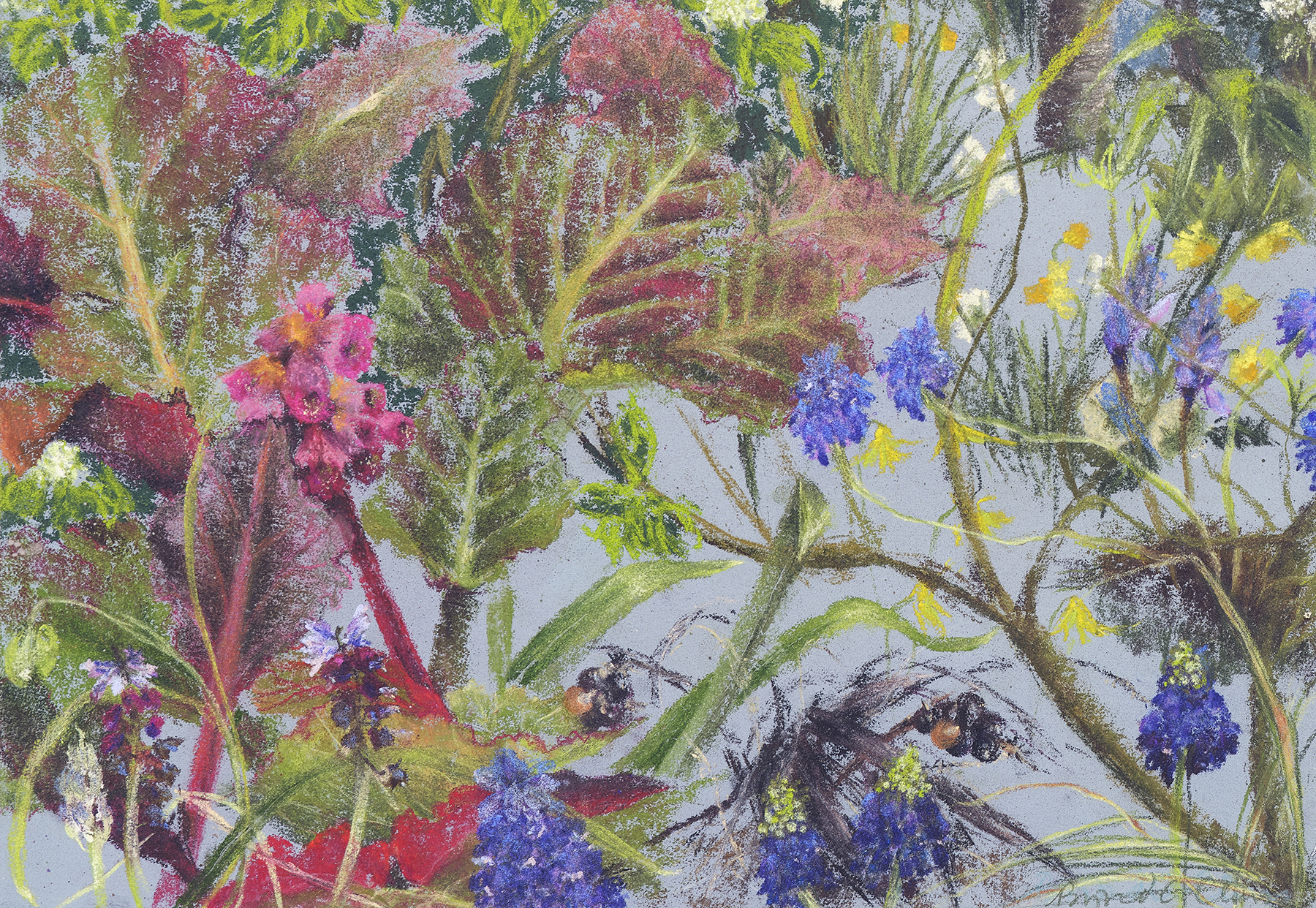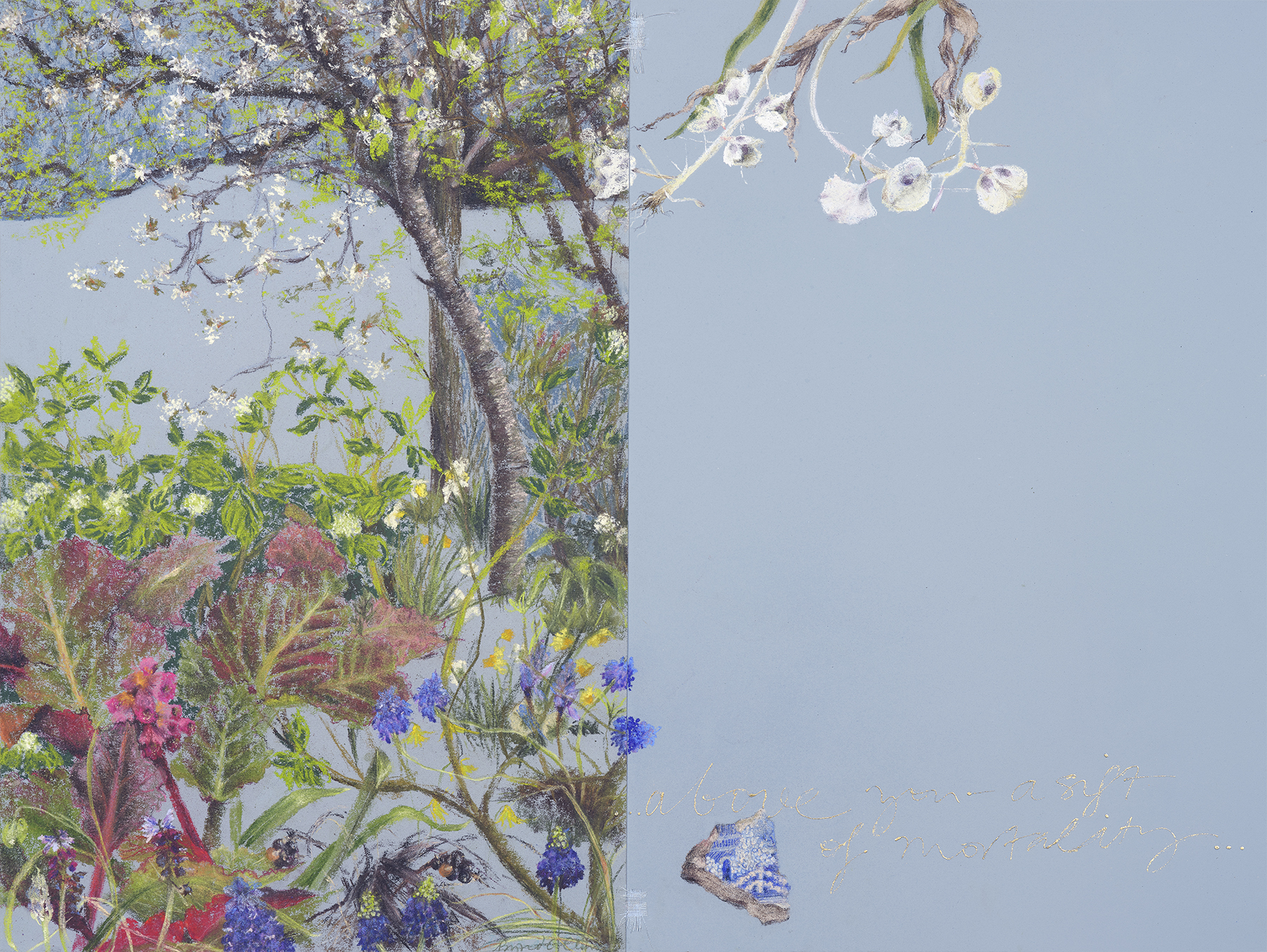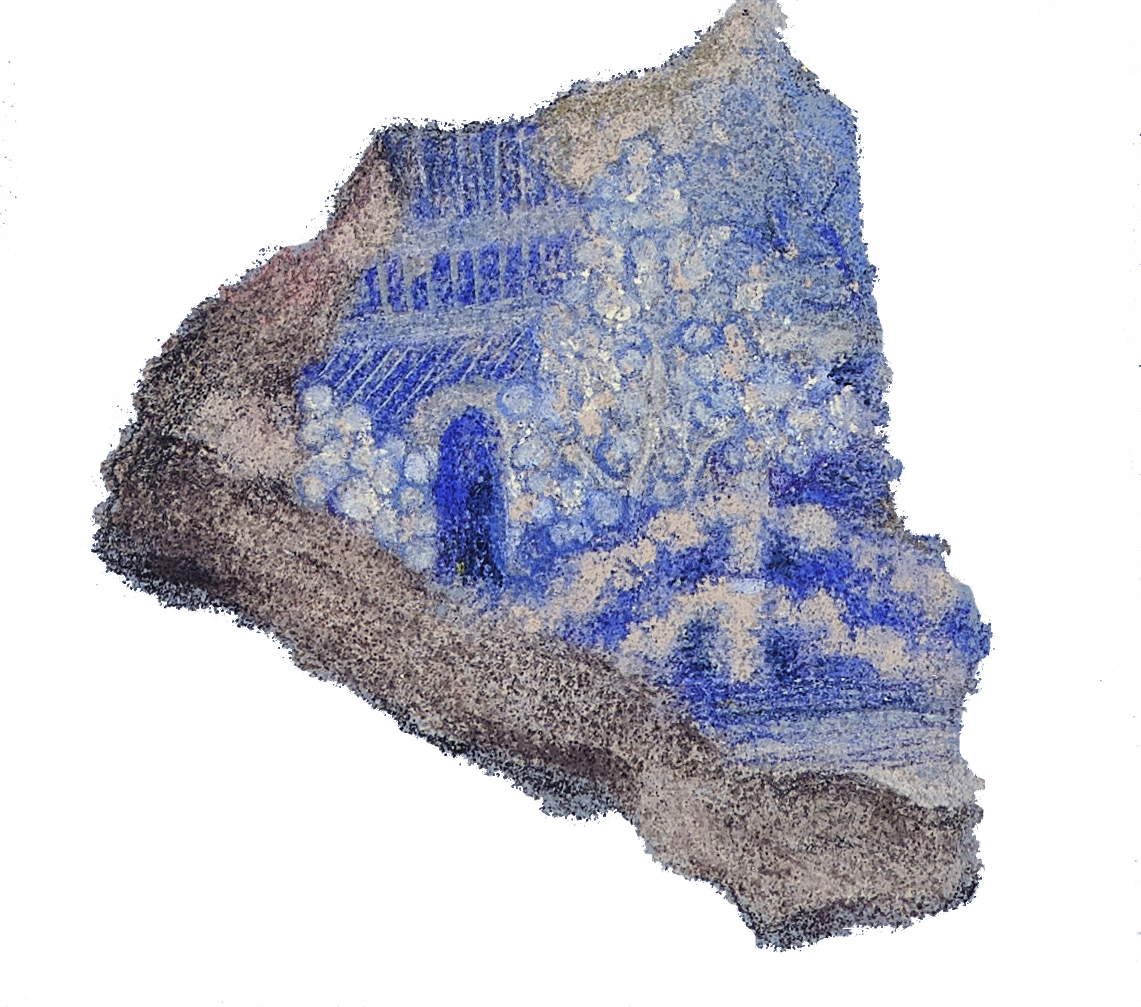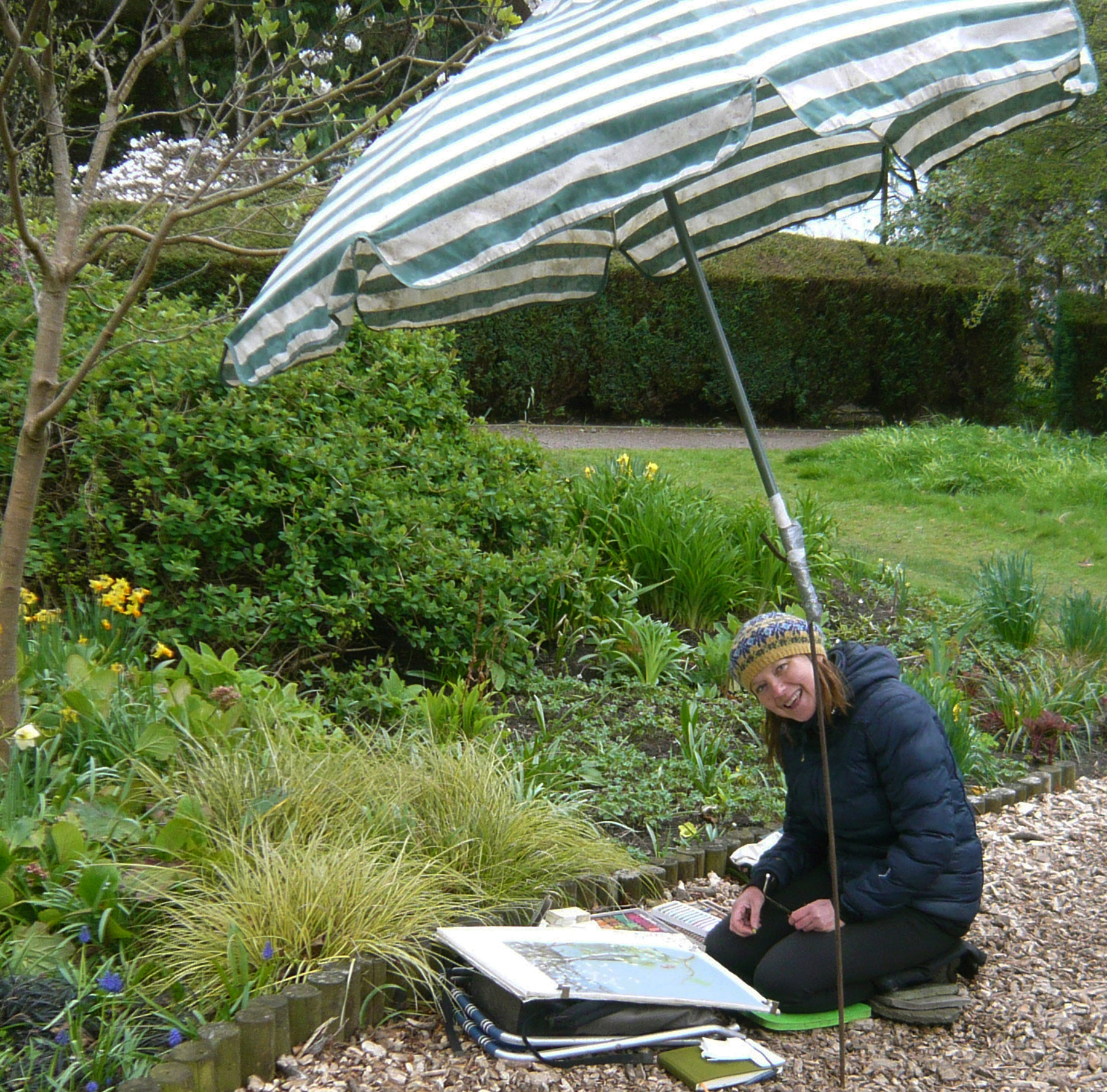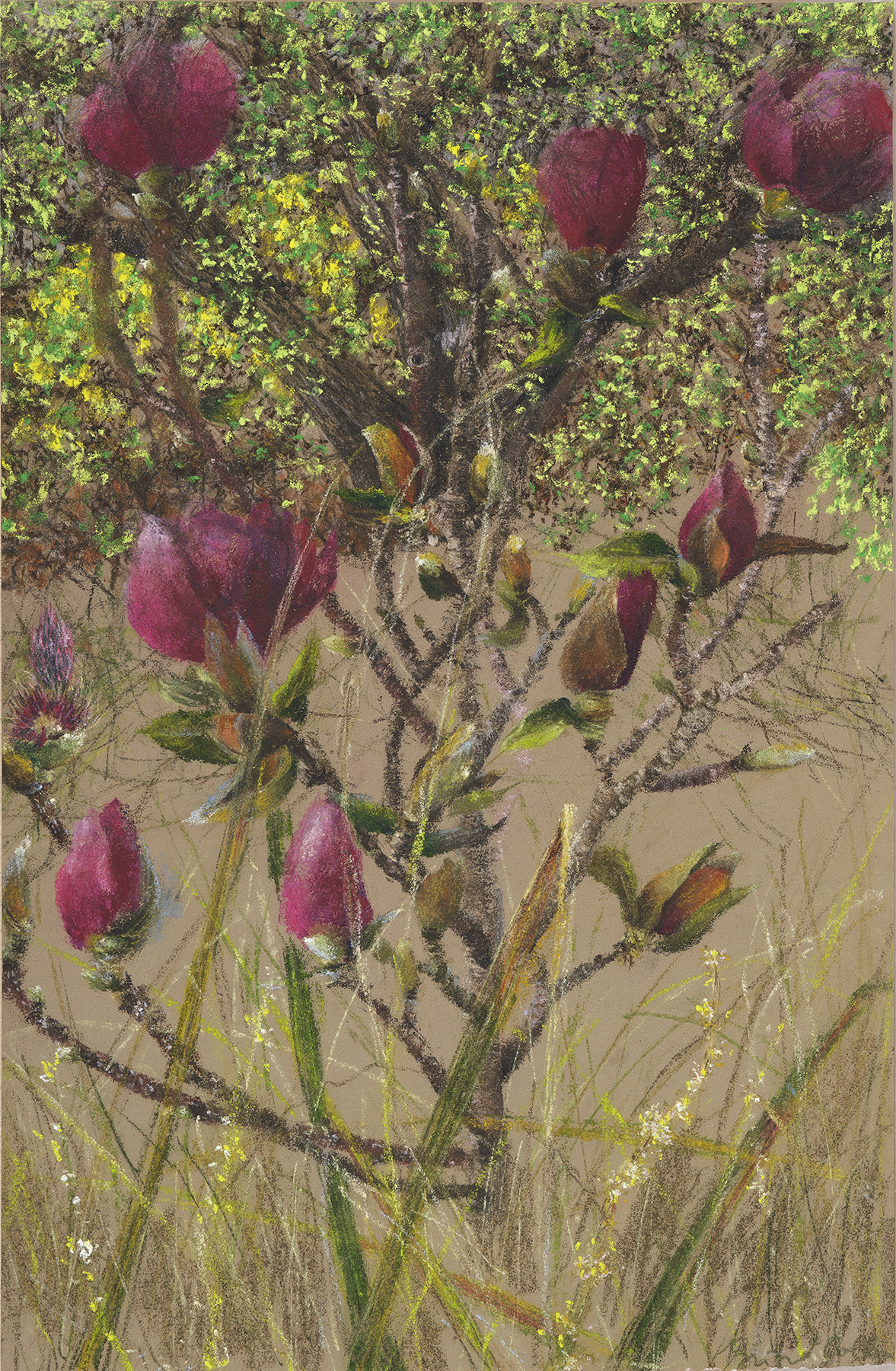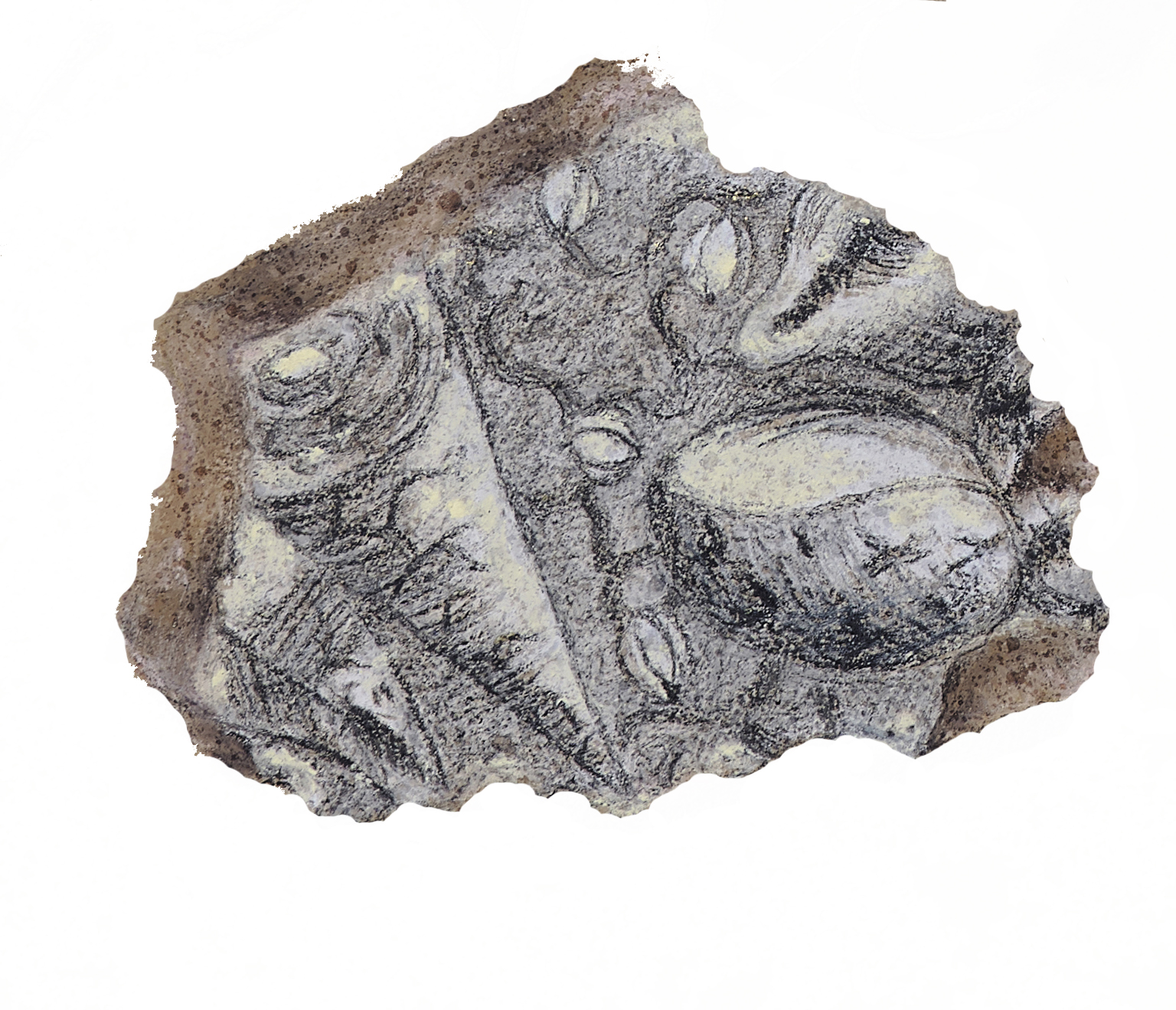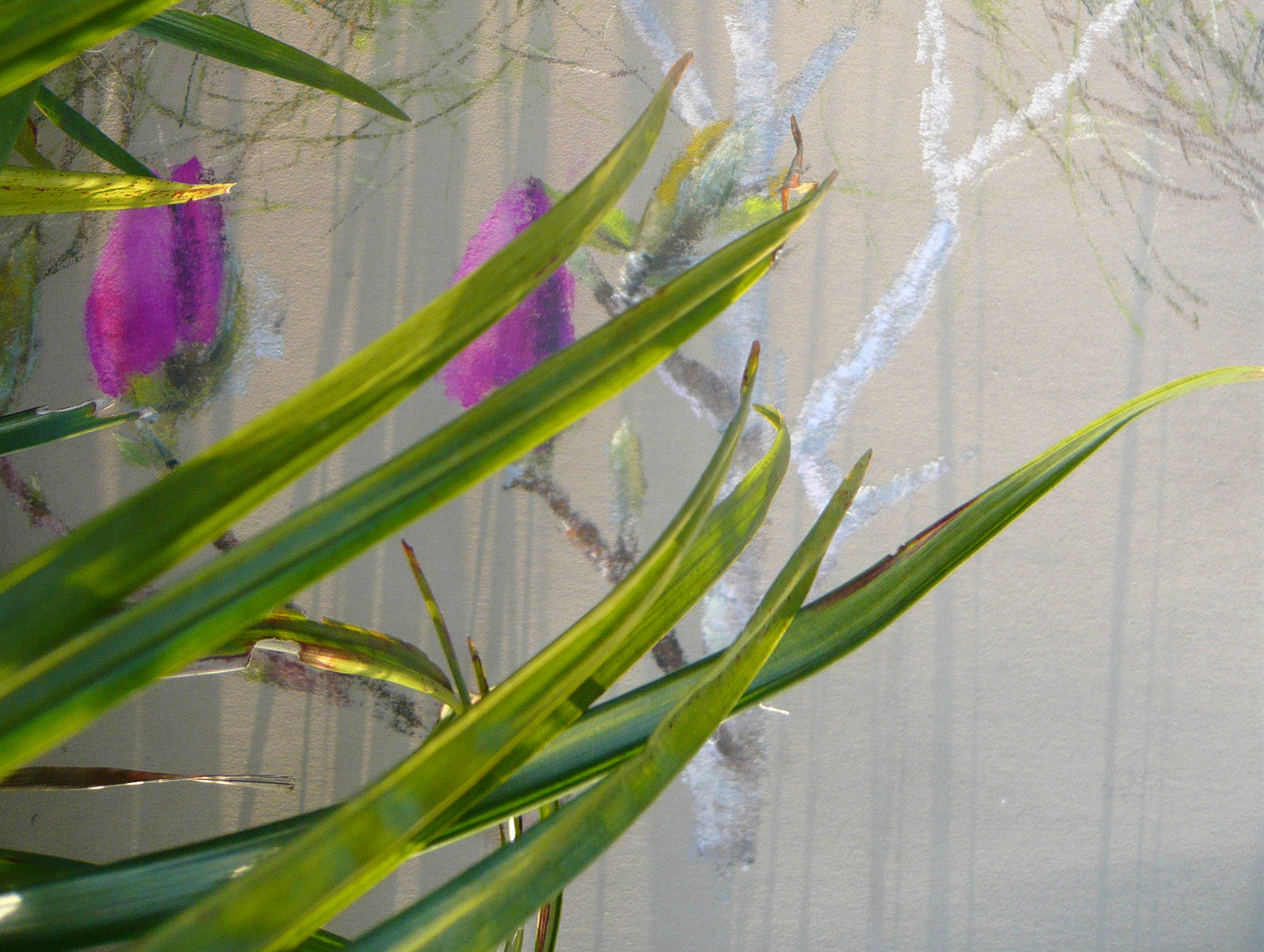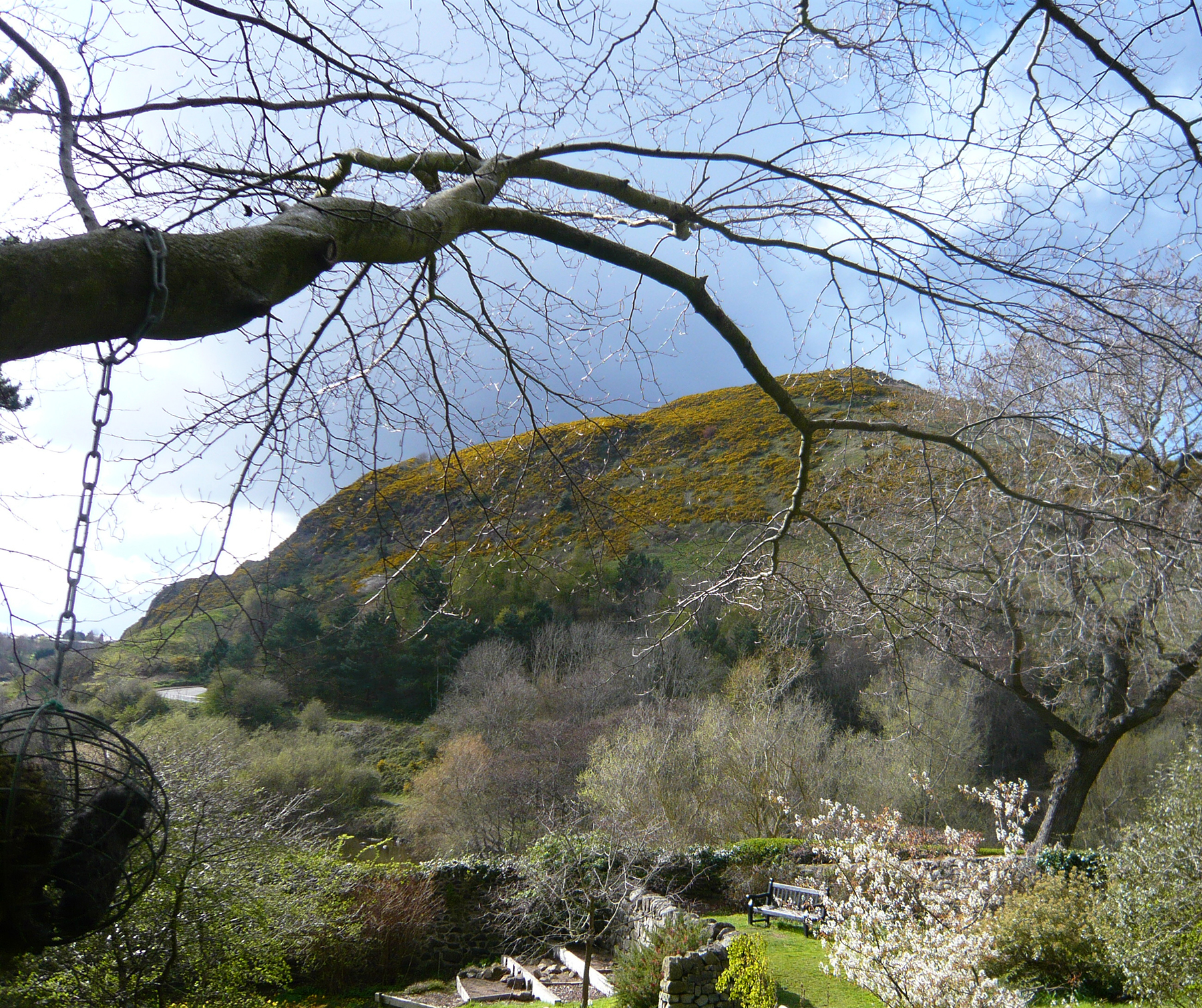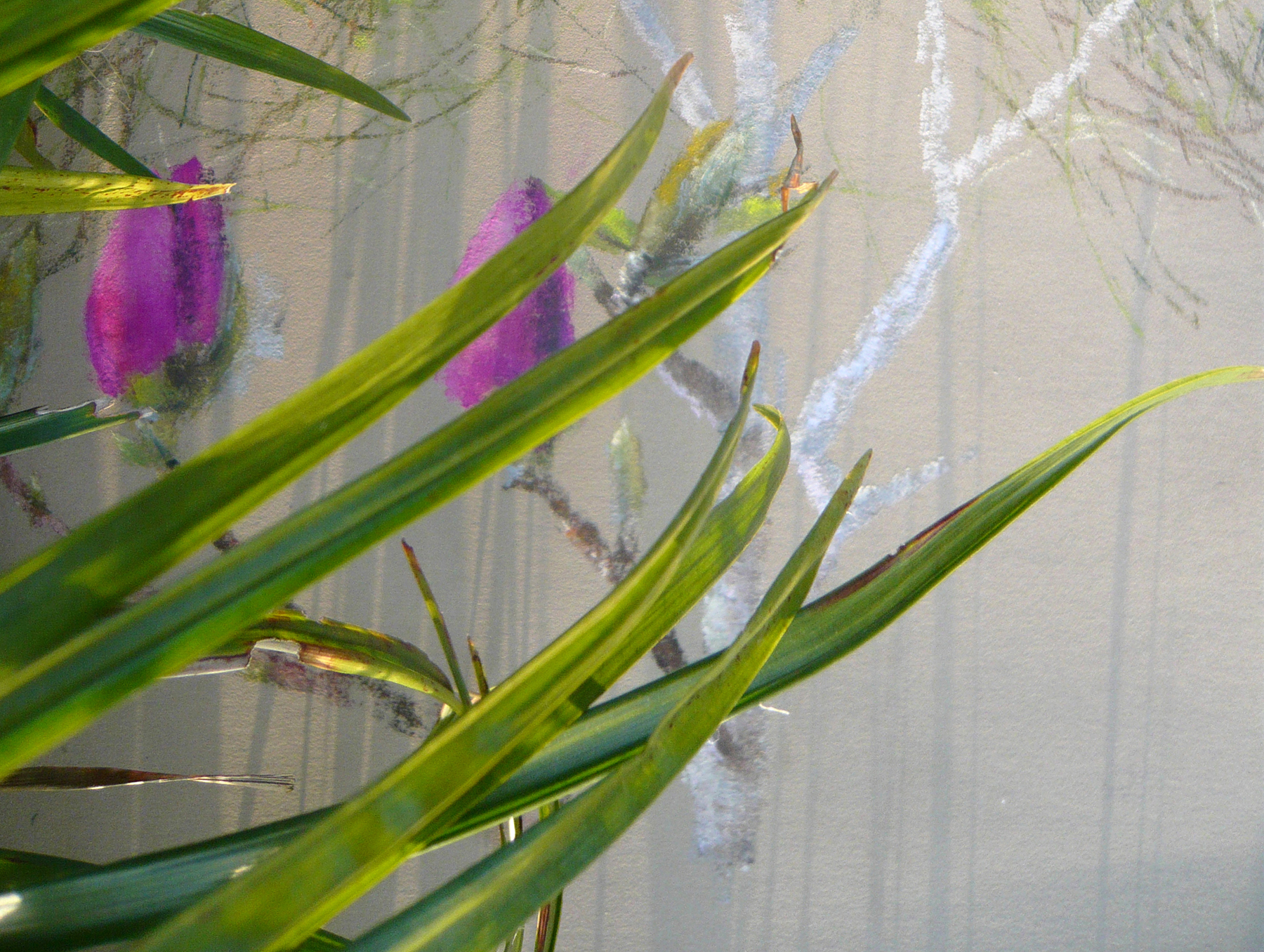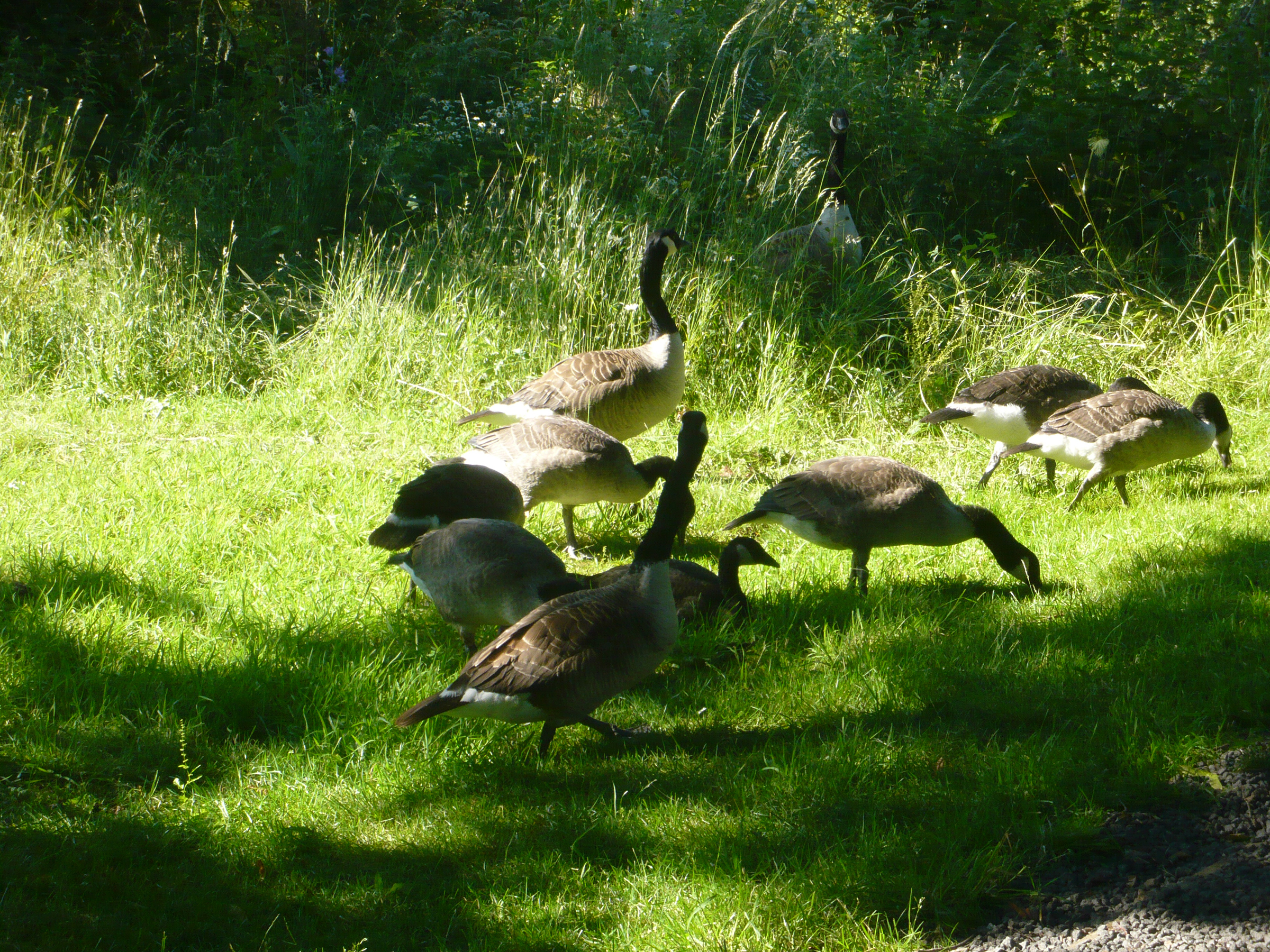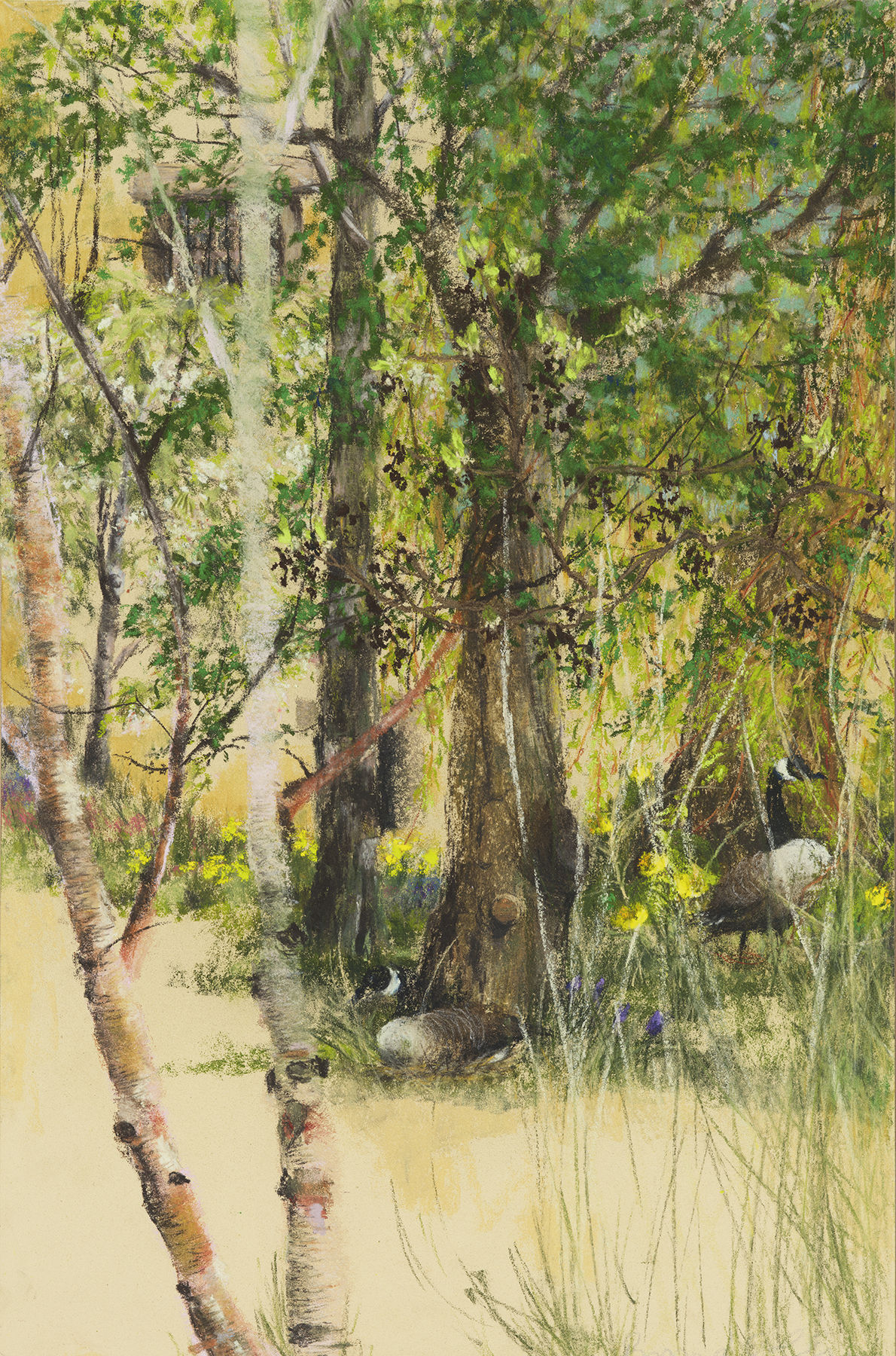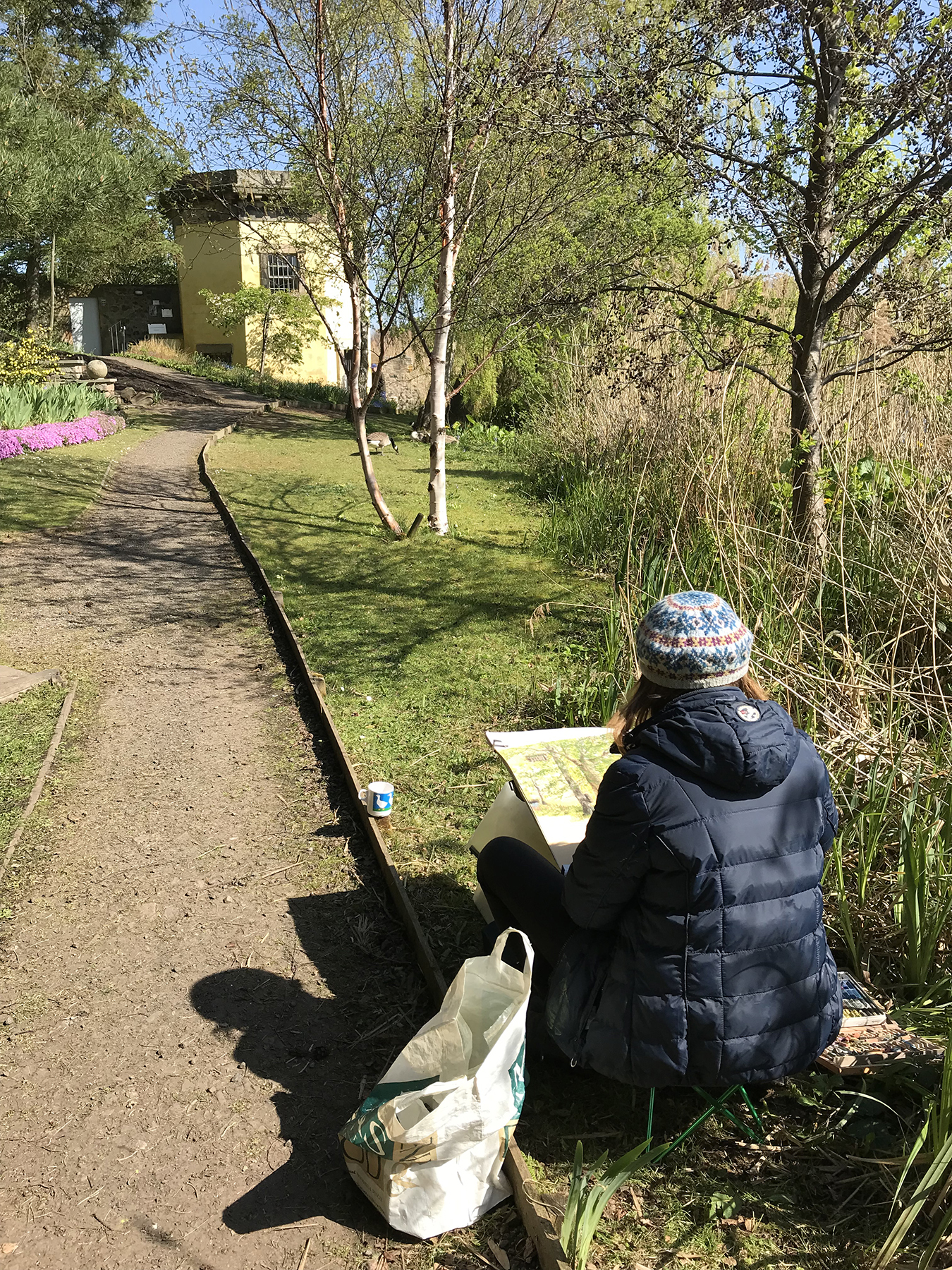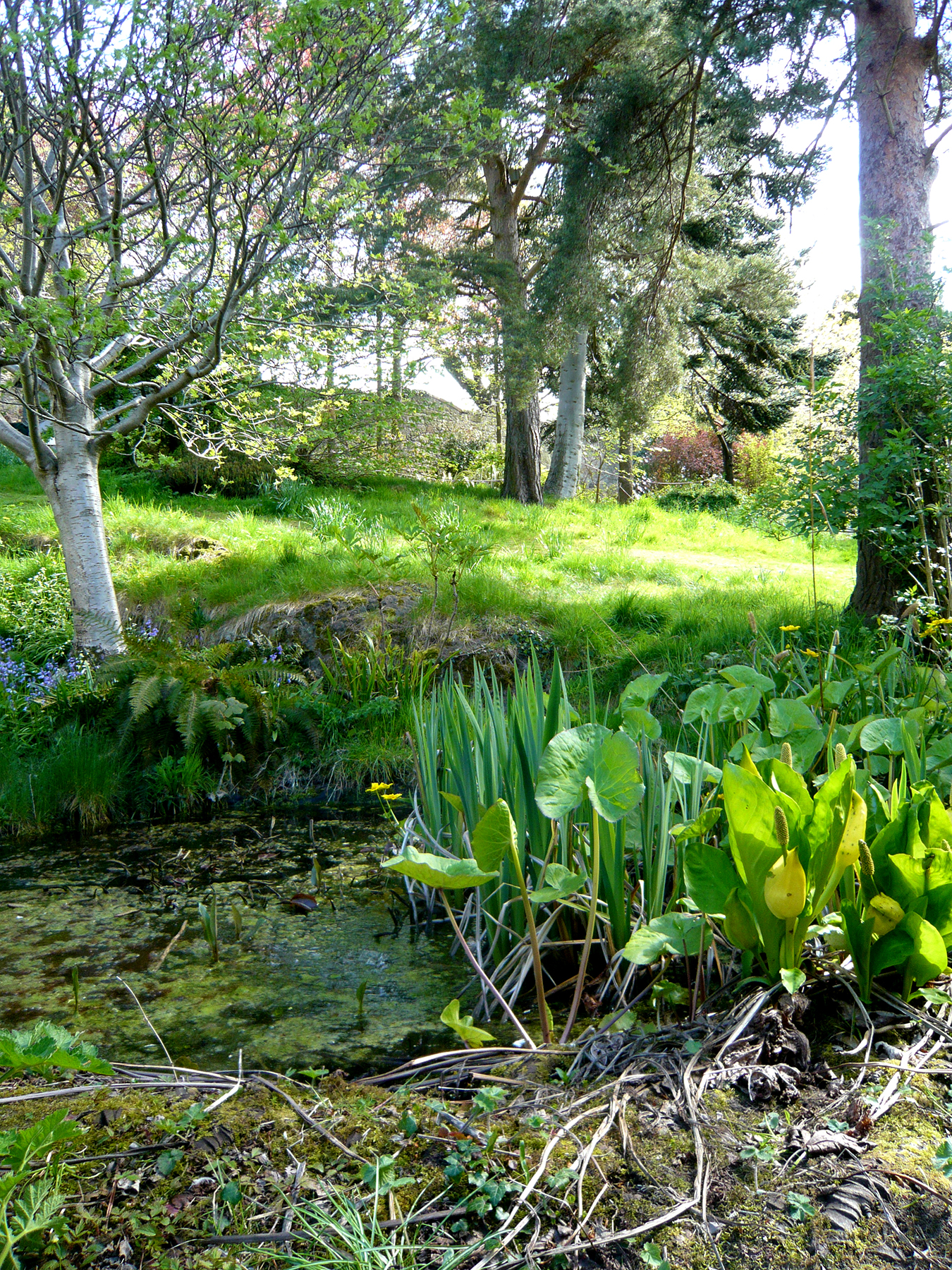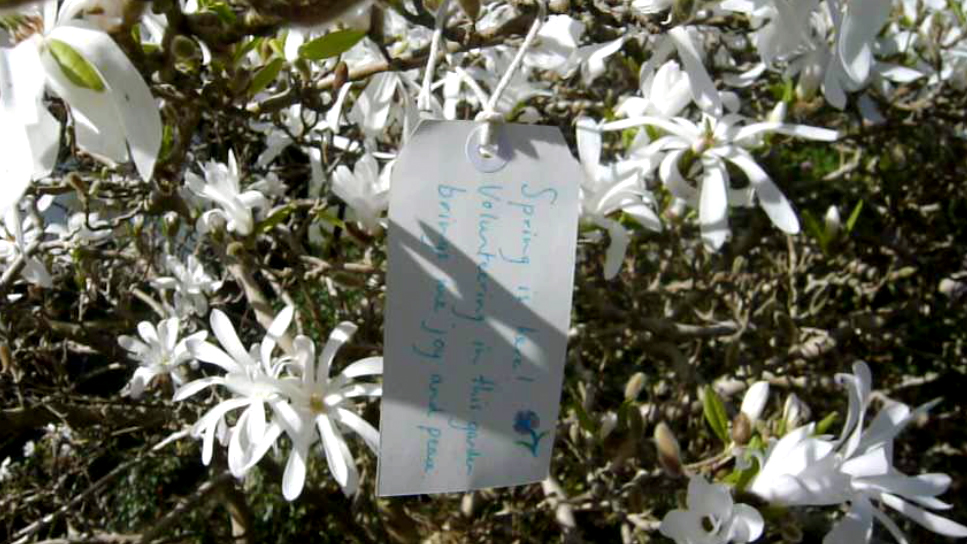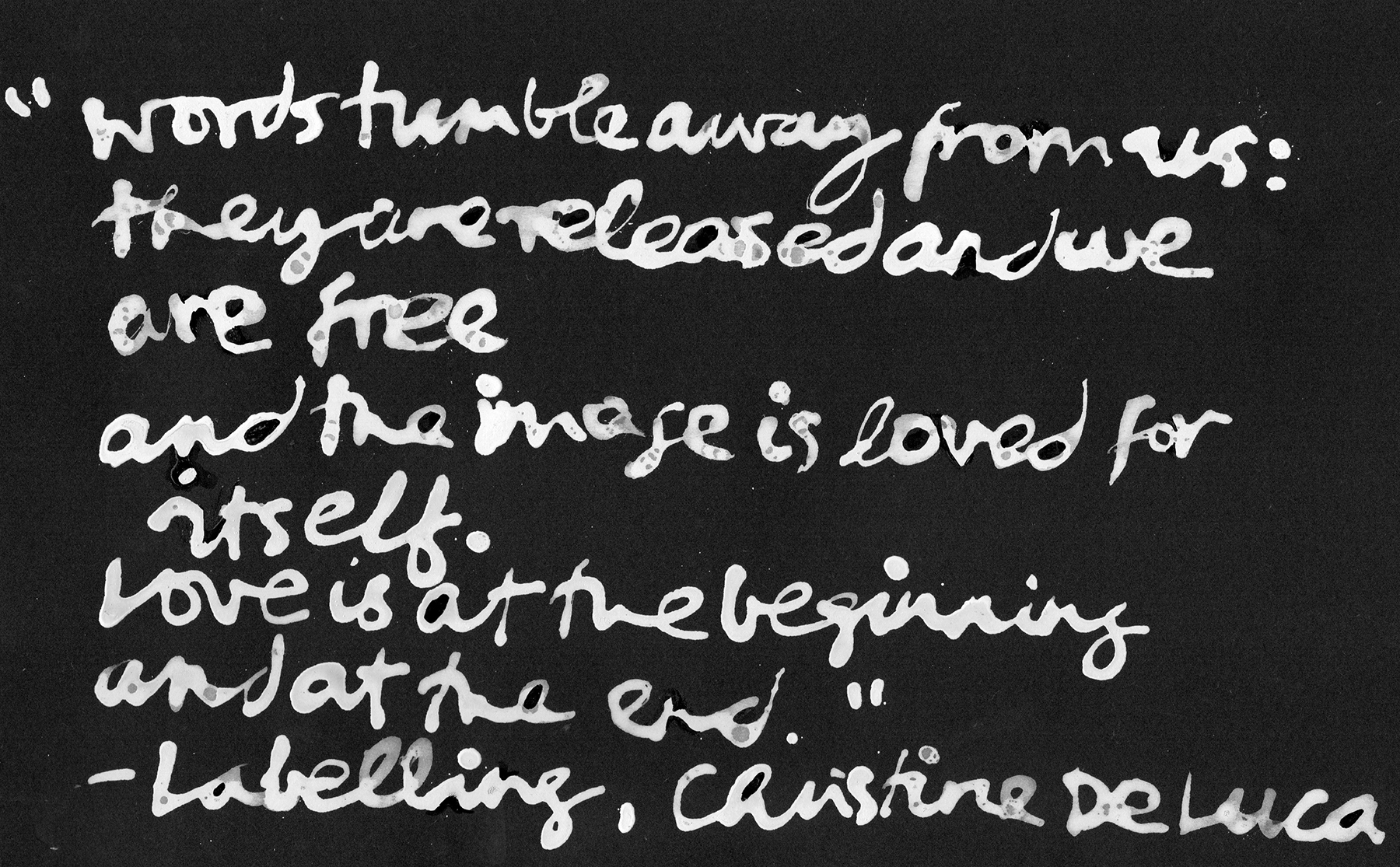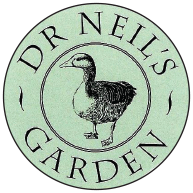
The Artworks and the Poems
Quantum sufficit
Click images above to
scroll through the gallery for this poem
Poem No. 1
Quantum sufficit
A sufficient quantity
The atoms of the wild rose petals
dance before the eye, create
a heart-shape in the mind, and with
the merging of two such probabilities
(where is the eye? where is the rose?)
decide they like the certainty
the rose brings to the blind.
Sufficient in size is the tiny wild rose
sufficient in staying power: a day
a transience. And the perfume
whose secret atoms break all bounds
all probabilities, conjures a presence.
Undimmed
Click images above to
scroll through the gallery for this poem
Poem No. 2
Undimmed
A last iris, late in the season,
still holding every hue:
through all the blues and greens,
tinctures of mauves and violets;
colours from Caspian,
tints of the old Silk Road,
tongue to tip,
a fine-veined tracery.
Its tissued withering is
a gathering into itself;
a reprise of its first unfolding
and just as lovely.
Time reshapes the works of love:
a conversation of petals tuned
to the season’s rallentando.
Our wrap of memory sustains
such fragile futures.
Lull
Click images above to
scroll through the gallery for this poem
Poem No. 3
Lull
Dierama pulcherrimum
There’s something of the corps de ballet about
these grasses. Is it the way they drape,
hold themselves with a lithe grace,
trip in, stage-left, wave on floaty wave,
arrayed in dresses, petunia and cerise
fading, crêpe-thin, to fuchsia?
But that’s fanciful: it’s just
a breeze off the loch that sets
the slender stem aswing:
a mobile over a ferny cradle,
rocking gently. ‘Hark,
what peaceful music rings.’
(From Jesu, joy of man’s desiring,
by J S Bach, translated by Robert Bridges)
Frush
Click images above to
scroll through the gallery for this poem
Poem No. 4
Frush
Marsh Woundwort
We could easily pass it by, write it off as no more than
a nettle, apt to spread where it’s damp; but up close
that frush of leaves is worth the wonder, their
tinge of blue and soft, darkly serrated fringes.
We smudge woundwort and a faint aroma lingers,
medicinal from antiquity (or a spell against witches).
It thrusts tall spears to the light. Heads are heavy
with tiny florets – each sticking out its tongue to make
a landing strip for a bumblebee blundering upon it.
How the dog rose dips to greet, to dangle and mingle.
Frush – a profusion (Shetlandic)
Cross-my-heart
Click images above to
scroll through the gallery for this poem
Poem No. 5
Cross-my-heart
Rose-bay Willow Herb on Arthur’s Seat
Terraces on the south slopes of the hill
are a July sensation; have slipped from
ancient cultivation to the lazy sway
of Rose-bay willow herb. Call it Fireweed
but there’s perfection in its symmetry:
each floret a sashay of four fat petals held
by four magenta strips. Its stamen,
split four ways, projects itself proudly
in a shimmy of wispy attendants
bearing eight seeds, gold-dipped.
There must be millions billowing away,
pink weeds on a warm wind.
Lantern light
Click images above to
scroll through the gallery for this poem
Poem No. 6
Lantern light
Grape Hyacinth – (Muscari armeniacum)
Your burst of cobalt
brightened Springtime,
seeds secreted deep
in the blueness of your prime.
Now you stoop and wither,
fade to modest white;
to paper lanterns hanging
like quiet temple lights.
Will the planter tap you
to gather gifts of seed,
or will they flee in a windy night?
Hold that breath till
the artist gladdens you, paints
your shadows, restores glimmers.
Ginkgo biloba
Click images above to
scroll through the gallery for this poem
Poem No. 7
Ginkgo biloba
銀果 Silver fruit
Graceful leaves belie
your ancient genome
your resilience.
Slithers of light,
they spring upwards
from the branch,
flick their fans,
curtsey low, perfect
the slowest dance;
or hang downwards,
lime-green butterflies,
a flutter of joy, of peace.
You slow
our step,
our heartbeat.
Your leaves
shape solace, concord;
seek out communion.
‘The antiquity of a tree is a concentration of cosmic energy” Stanley Kunitz
Getting along
Click images above to
scroll through the gallery for this poem
Poem No. 8
Getting along
Ginkgo Biloba and Dog Rose in conversation
At the start, Ginkgo, when I reached out
to touch you I thought you aloof. I wonder,
have you been here long? Where are you from?
You’re rather familiar, Rosa canina.
No doubt you think me a foreigner, a little exotic
but I was raised in this patch of heaven.
I’m a child of the world. You seem in a hurry.
What’s your back-story?
Och, I’m told that I’m scruffy; I sway and droop
and cling to whatever. But, believe me, Gingko,
I could settle here no bother, perfume your summer
guard you with my thorns; and the hips I bear now –
they brighten us both, don’t you think?
Maybe you’re right – united we stand –
given the way things are going.
And, upright, I’ll keep you from falling.
Conversation
Click images above to
scroll through the gallery for this poem
Poem No. 9
Conversation
during COP26
It is late in the season, and the conversation
between hop and gingko and wild rose is
of mutual things; chatter of shade, support, stability;
of insects, nutrients, water. Braided through
leaves and stems, messages touch deeply, rouse
fungal chums. What such sweet fankle offers.
They are charmed that the artist has picked
them out, detected their communion.
She is part of them now, her face pixelated
in green, her ankles festooned in their tousle.
They paint themselves on her white paper,
make their marks in the long light of afternoon.
No future without fungi
Click images above to
scroll through the gallery for this poem
Poem No. 10
No future without fungi
They’re beyond our childhood question:
animal, vegetable or mineral? Fungi, their own
myriad world, millions unexplored.
Touch them and they’ll send a puff of spores
enough to change our world.
Some seem more like mineral; oyster shells
on some exotic coral. They are mighty underground.
How old is that tree stump they’ve colonised?
Did they arrive last night or a century ago?
Did the moss consent to this intimate invasion?
Give us a few years and we’ll be wearing them,
cured by them, cleansed by them. Meanwhile
we ask, with their spatial memory like a bee,
where are they going? How much do they know?
Letting go
Click images above to
scroll through the gallery for this poem
Poem No. 11
Letting go
Tree of Heaven and Japanese Larch in winter
Tree of Heaven
Your naked body, winter-stark:
lithe-limbed, smooth-skinned,
your bark- a smudge of silver,
lissom and lyrical.
No fuss of leaf or blossom –
just pure structure. Alluring, yes,
but, these days, you’re judged invasive,
too quick to grow, too tall, too ‘weedy’:
we ask, should you endure?
Japanese Larch
Your branches are a crazy fretwork,
cones beaded and sprigged
more than profuse.
Some shorn by the wind now enhance
the bareness of others.
It’s winter:
you get along;
reach out an arm
to shelter the supplanter,
that Tree of Heaven.
Hope
Click images above to
scroll through the gallery for this poem
Poem No. 12
Hope
1 Hellebore
Fleshy stems, a crown of leaves
best winter coat, nothing shabby.
Fat buds, tentative hearts half-
hidden, lip-reading winter.
2 Aconites
Sudden aconites
frills of green balancing
tiny cups of gold.
Ear to the ground, head
below the wind’s parapet
a whole spill of them.
Sharing space
Click images above to
scroll through the gallery for this poem
Poem No. 13
Sharing space
Chinese Red Birch
Your name is misleading or perhaps
you’re keen to fit in with the locals,
not stick out like a specimen, nurtured
and exotic. Your winter trunk gives
little away; it’s almost as silvered as
local birches, though there’s a hint of pink.
Wind-wrapped in willow fronds, it seems
you’ve happily bedded in; found
your feet eased in the damp grasses,
caught their whisperings, their welcome.
In Spring you will delight them with
bright leaves and catkins; then peel back
that bark to spice up summer.
Symbiosis
Click images above to
scroll through the gallery for this poem
Poem No. 14
Symbiosis
Weeping birch and friends
You’ve been here
at the loch edge long enough
to gnarl and twist, branch out a bit.
You are hospitable
to crusty lichen gilding your branches,
to reeds that make music with you
when the wind rises.
You soothe
the solace-seeker, delight in whispering
companions, excite the dogwood
that blazes in your shade.
The cherry has lost
its calendar, paints you an early Spring.
What a picture you make
growing ever more together.
Symbols
Click images above to
scroll through the gallery for this poem
Poem No. 15
Symbols
You are drawing in the garden while
I am far away, traversing a frozen bay
fringed with reeds and pussy-willow:
I gather stems of each to savour.
Sun sinks early through chill stillness.
By the loch, you find reeds ready to cut;
and willow catkins, snug in grey fur, beg
to be stroked, to have you close.
Dogwood looks on fire, a burning bush.
In the north where palms don’t thrive,
willow and rush will welcome Easter.
In the garden you weave a Brigid cross
from reeds: it will last through summer
like the velvet buds still alive in my vase.
St Brigid's Cross
Click images above to
scroll through the gallery for this poem
Poem No. 16
St Brigid’s Cross
1st February-Imbolic, St Brigid’s Day
Fold it over, press gently, turn the rushes
through ninety degrees; repeat and repeat,
like breathing or walking, or loving.
Keep the centre firm, pay special attention
to the loose ends; like we do with family,
with friendship; like we’ve always done.
Hang it up, watch it change colour with age.
By the time it gleams dryly, plants will be
flourishing, summer round the corner.
The coming of Spring, always festivity:
new life and hope – Imbolc or Easter –
Brigid weaves them together.
Robin's pincushion
Click images above to
scroll through the gallery for this poem
Poem No. 17
Robin’s pincushion
Moss Gall
Past
When shrivelled up in summer
moss galls were squirrelled under pillows
to summon sleep, hung round necks
to ease rheumatics, tucked
in coat-cuffs to avoid a flogging.
Present
A wily wasp can trick a thicket rose
to grow that gall to house its offspring:
a shady larder to see them through the seasons,
from eggs to larvae – a prickly pompom
pulsing with pupae, their swinging cradle.
That bright-eyed robin: is he biding his time,
counting the months: hoar frost on fir, perfume
of viburnum, May buds on the old rose till,
at last, he will dart as wasps emerge, unfold
wings, depart, take flight across the loch?
Future
It’s a struggle to like the wasp, despite
all that pollinating, useful foraging.
But who knows what gifts, what remedies
might languish in such oddball chemistry;
in such harmonious entanglements?
A kind of mirth
Click images above to
scroll through the gallery for this poem
Poem No. 18
A kind of mirth
Apricot, acer and friends
Unseasonal buds of apricot are bursting,
bright pink with lemon stamens.
They sprinkle naked branches
with a kind of mirth, a smile
behind the hands; a delicate intensity.
A bumblebee could get drunk
basting itself in pollen
if it stumbled on the invitation.
Above ground, mutual adorning;
and underground, no doubt,
a secret sociability and care.
The acer, still bare, will stun us
later, with subtle shades turning
from brightest green to red; while
blousy euphorbia will push itself
forward, exploiting a gap.
Meanwhile the hill and the kirk
are bit parts; the wind off the loch
murmurs the firs and a piper
accompanies all the little birds.
Something of the marvellous
Click images above to
scroll through the gallery for this poem
Poem No. 19
Something of the marvellous
In all things of nature there is something of the marvellous.
Aristotle
Mornings still nip at our heels,
kill tender shoots; but this group
are emboldened by the witch hazel:
a harbinger of warmer days,
a bright sway of pinwheel galaxies
lighting her bareness.
Might they spiral off
into new life-forms:
fireflies of the north,
glowing in the dark?
The old pine has seen it all,
the fir weathered many winters
but the delicate acer is in awe,
and the apricot offers them all
her momentary blessing.
Drowning in wonder
Click images above to
scroll through the gallery for this poem
Poem No. 20
Drowning in wonder
Clover
Even if
your pink heads weren’t so perfect
or you had no perfume
or little nectar
Even if
you had two leaves
or four
rather than a perfect three
You would still be valuable
for grazing, hay-making
for soil nitrogen, nutrients
for breaking hard-pan clay
for better drainage
for suppressing weeds
If I were a bumblebee
I’d drown in your wonder
pollinate acres
Echoes of Eden
Click images above to
scroll through the gallery for this poem
Poem No. 21
Echoes of Eden
It could be the huge arms of the elm
that stop them in their tracks,
or the brief froth of cherry blossom
above them – a sift of mortality,
or mountain dogwood with its shower
of bracts, a bower for lovers; or
pink bergenia, all plump and plushy;
or the grasses with their gift of berries
now their flowers have faded.
But, no, there’s something about muscari,
its intense blue, that catches the eye; even
that willow pattern fragment, now unearthed,
has sensed a kindred beauty; picked out
the colour; while bees, allured,
pay homage, settle on its florets.
And, when muscari withers to perfection,
its tiny seeds will be tucked in sacs: bells
that a slight breeze might shiver, or
perhaps they are tissued lanterns,
brightening dusk, settling the birds
and bringing home the lovers.
The pleasing shock of the exotic
Click images above to
scroll through the gallery for this poem
Poem No. 22
The pleasing shock of the exotic
Magnolia against Crow Hill
You waken to our Scottish Spring, bringing,
as if from another world, the pleasing shock
of the exotic. All that inner life, that innate energy:
furred buds that peel back revealing waxy goblets:
a panoply, an oriental lusciousness that teases
the arms of that old elm, chides its slow progress to
tasselled glory. As you open and the sun picks you out,
you brighten haunts, flourish and flaunt.
Do you dim to candle light in the dark?
These grasses too have come a distance, fitted in,
acclimatised to our ways. They enliven the garden,
soften the line of Crow Hill that will only offer gorse.
Under the Willow
Click images above to
scroll through the gallery for this poem
Poem No. 23
Under the Willow
It is unmistakeably Spring, though
the birches are barely budding
and the hawthorn still counting
the days till may-time. It’s the willow
that’s up and running; its cape draped
in fronds that sway, touch the water.
Low light plays off the loch
till all is luminescing.
Geese are pairing up: a little timely
neck-dipping will seal their bond.
They are inquisitive about each other;
curious too about their reedy bed, fringed
with fleshy flowers. Near the Tower, where
couples loiter, their nuptial canopy is
those airy birches, tickle of willow
and the long memory of hawthorn.
In balance
Click images above to
scroll through the gallery for this poem
Poem No. 24
In balance
In such fine livery, it’s hard to see
the pair of you as ‘nuisance birds’.
Was this her nesting site of choice,
where paths converge?
She seems a patient sitter,
bears well with humans.
You’re the wary one: a fox at dusk
would shiver at your frenzy, run a mile.
Your dedication is exemplary.
Sometimes you nap on duty, shifting
your bulk from one spindly leg
to another; no sign of stiffness.
We tend towards
the wayward,
can topple easily:
your effortless art
can still us
make us gasp.
When the world feels broken
Click images above to
scroll through the gallery for this poem
Poem No. 25
When the world feels broken
Though the rowan has veered offstage, it has left us
its crown of blossom: fronds of white,
leaves that filter light over the little pond.
Who will dominate this chronicle? The pines are
merely a backdrop. Perhaps it is the pool itself,
succouring others, bonding them together?
Or darmera, with its pink flowers, stems like rhubarb:
lush-leaved, profuse, longing for mountain streams,
opening its green umbrellas, hoping for showers. It rivals
the brash marsh marigold, Dürer’s tufts of cowslip.
All is on cue: grasses and ferns edge in on the mirth.
Once bluebells have faded, there will be water lilies;
and irises will once again stun us to attention, mend
our hearts, remind us of time’s continual arc to earth.
(Final phrase is from David Gascoyne’s poem Spring MCMXL)
Labelling
Click images above to
scroll through the gallery for this poem
Poem No. 26
Labelling
Looking always worked towards a word
John Burnside
In the beginning was the word:
that capture of thought, delight
in imagination, in pinning down.
We can’t seem to stop ourselves
bonding memories to words;
language to help recall the moment.
The baby touches, we say the word;
he points again, babbles, we repeat
and sound it out till he says it
the way we say it. Now he holds
the magic for himself.
We learn to love what
we attend to, what we label.
But memory can falter: is prone
to gaps and lapses. We rummage
for a word, a name, a thought;
can find ourselves back to
the simplicity of the unnamed: attending
to each other as equal beings; just me
and that little brown bird whose legs
the sun makes almost see-through,
showering in my bird-bath.
Words can tumble away from us,
as if released, exposing sentience.
Is it that rose that we smell? Love is
at the beginning and at the end.
